







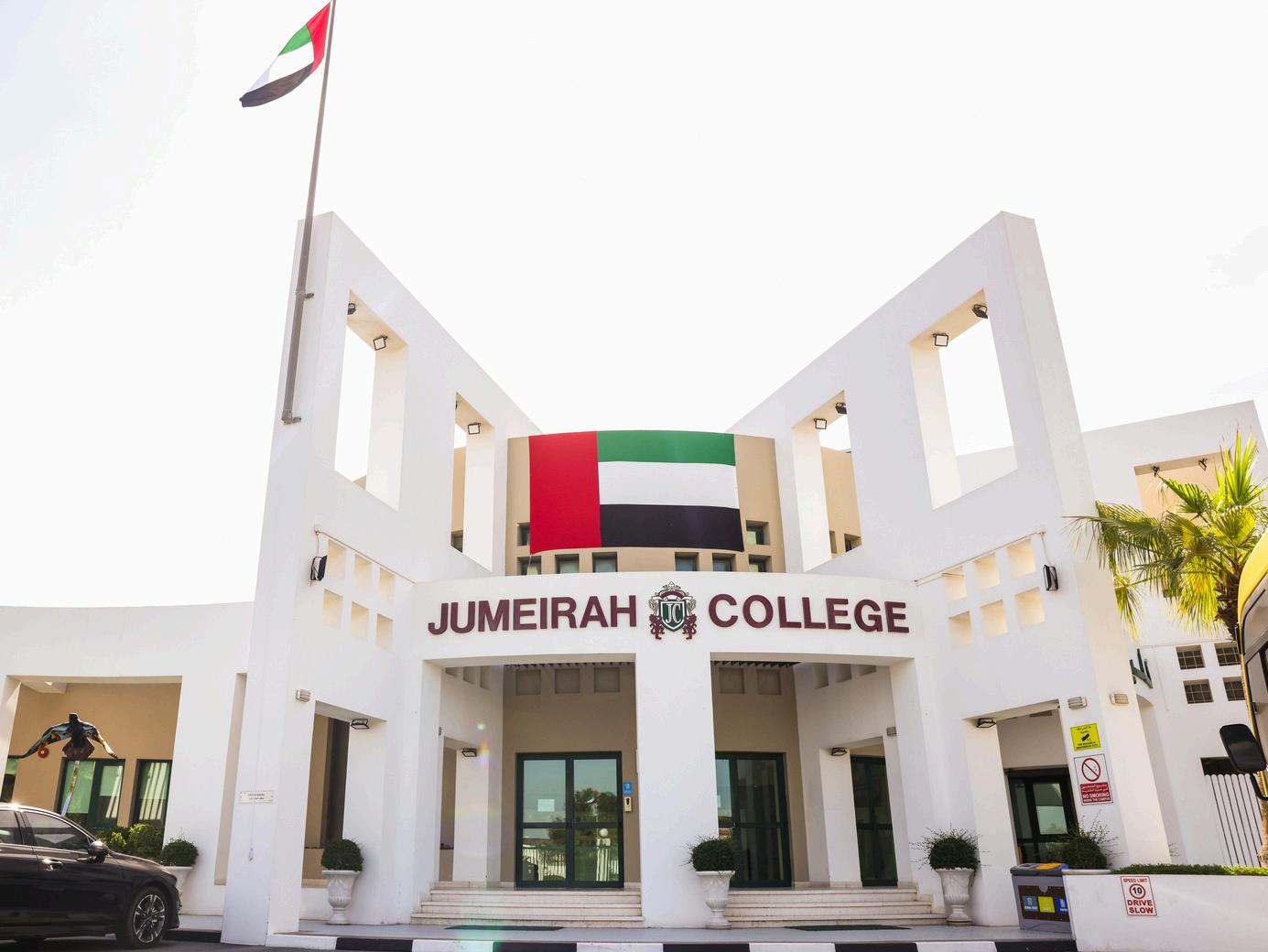
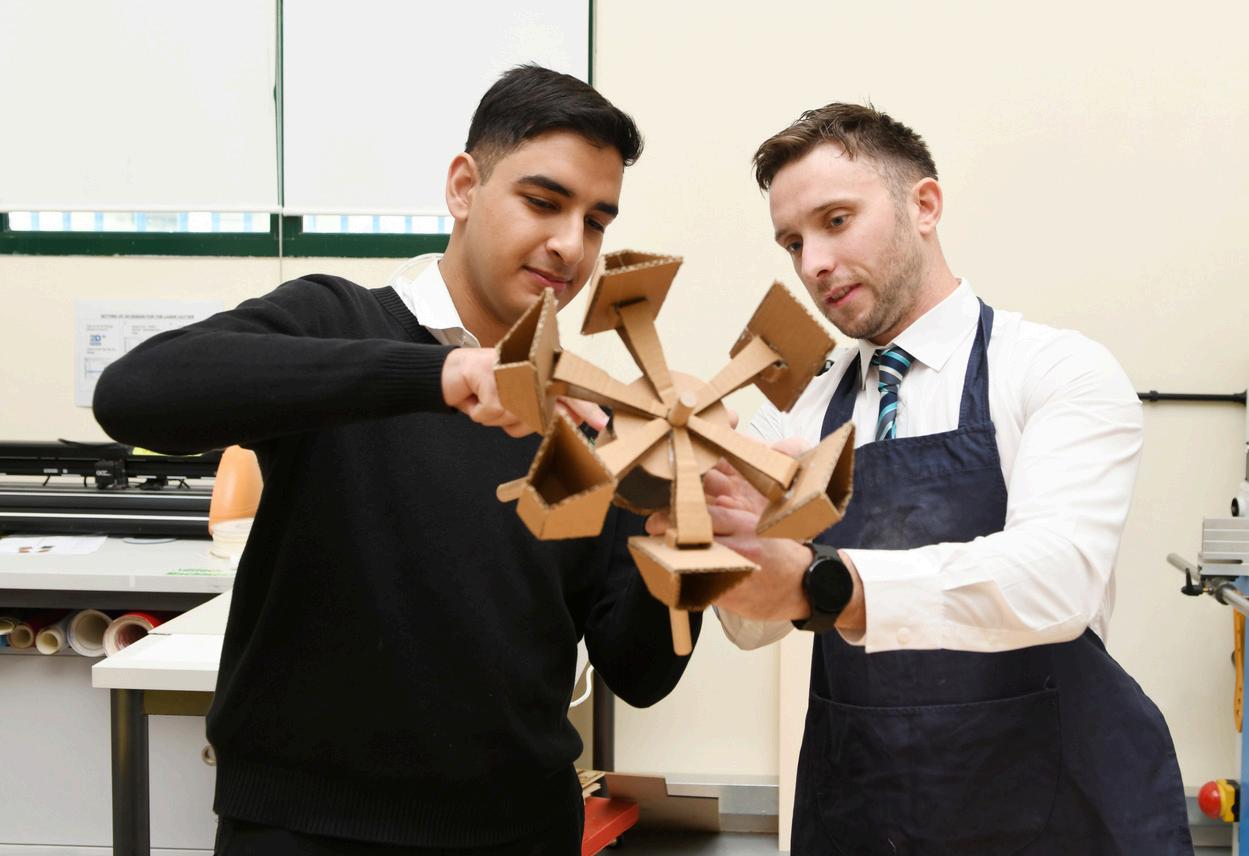

Outstanding for the 10th consecutive year
Jumeirah College Dubai is an outstanding British school in Dubai– not just in terms of academics, but also in terms of developing each and every one of our students socially, physically and emotionally
We don’t believe in comparing our students to average benchmarks Instead, we focus on understanding our students as learners and individuals, exploring and embracing every opportunity to encourage and support them in their learning and growth
With students from over 59 nationalities, we are a truly international school with a truly global mindset We instil these values in our students, moulding them into successful, well-rounded, and open-minded international citizens of the 21st century
Delivering The National Curriculum for England from Years 7 to 13, we are registered with the DFE, Department for Education and Skills in London, and as an examination centre for the appropriate UK examination boards +



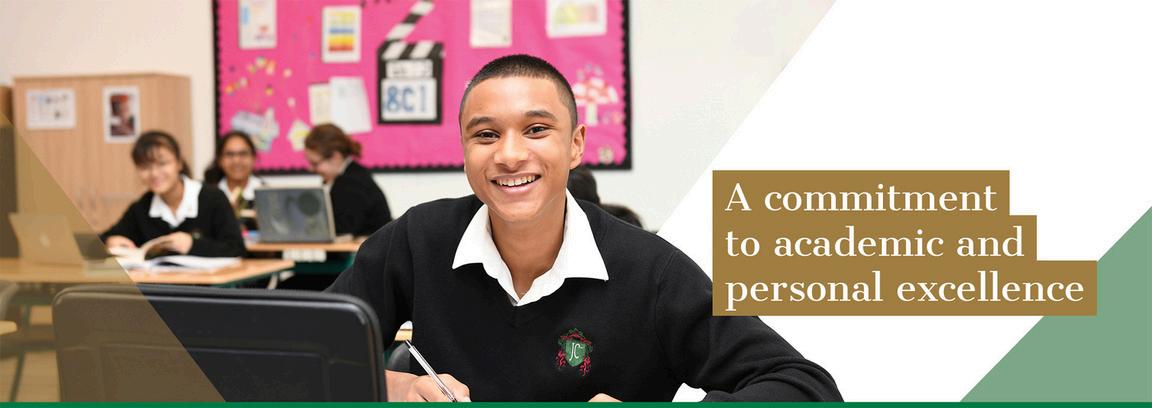


TABLE OF CONTENTS
A message from our Principal
Vision, Mission, Core Values and School Progress Plan
A message from our Vice Principal
Sixth Form Curriculum
Selecting your A Level Courses
Subject Entry Requirements
A Level Results
Sixth Form Enrichment
Sixth Form Leadership
Higher Education Guidance
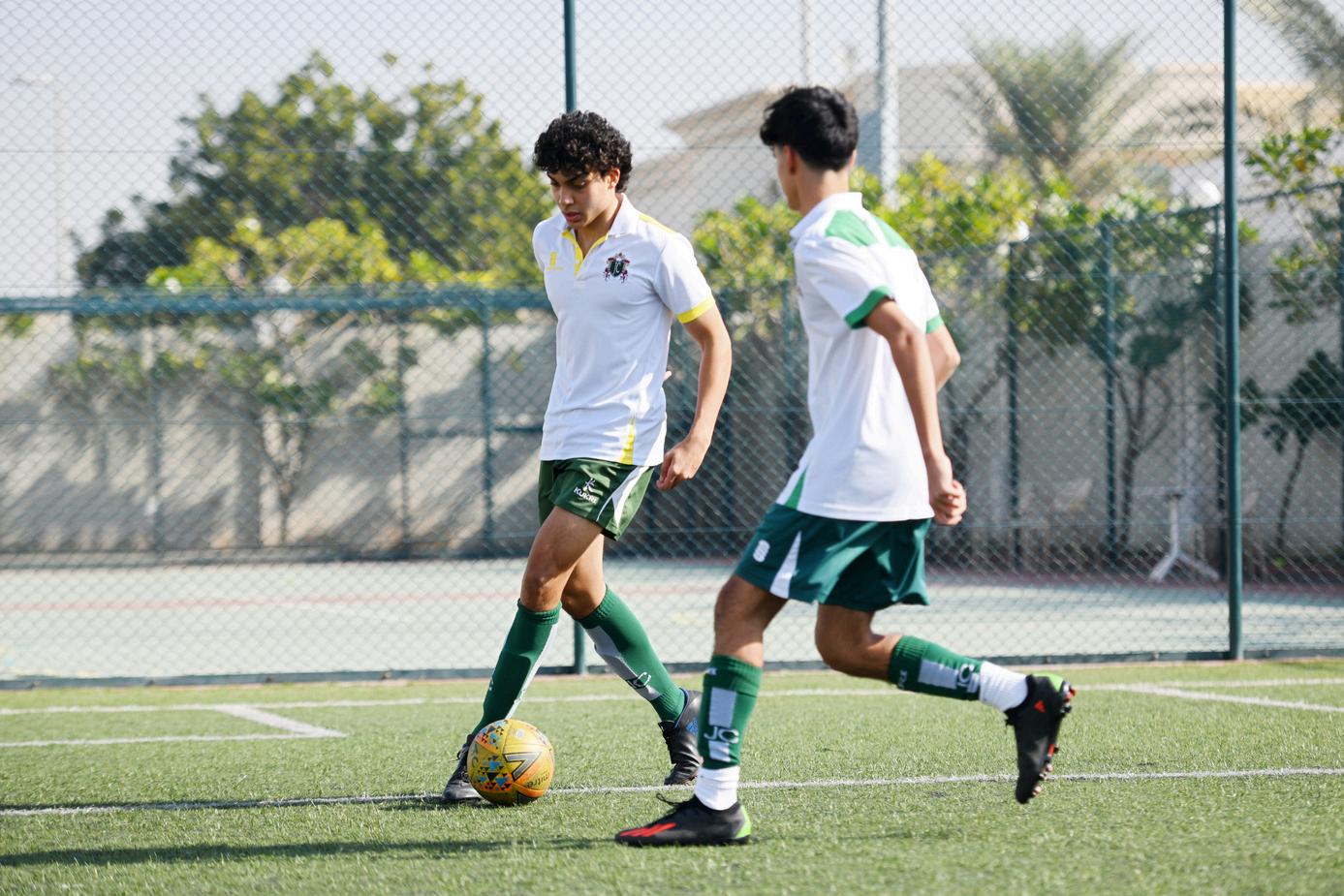
Application Process and Timeline
BTEC Applied Science
Arabic
Art and Design
Biology
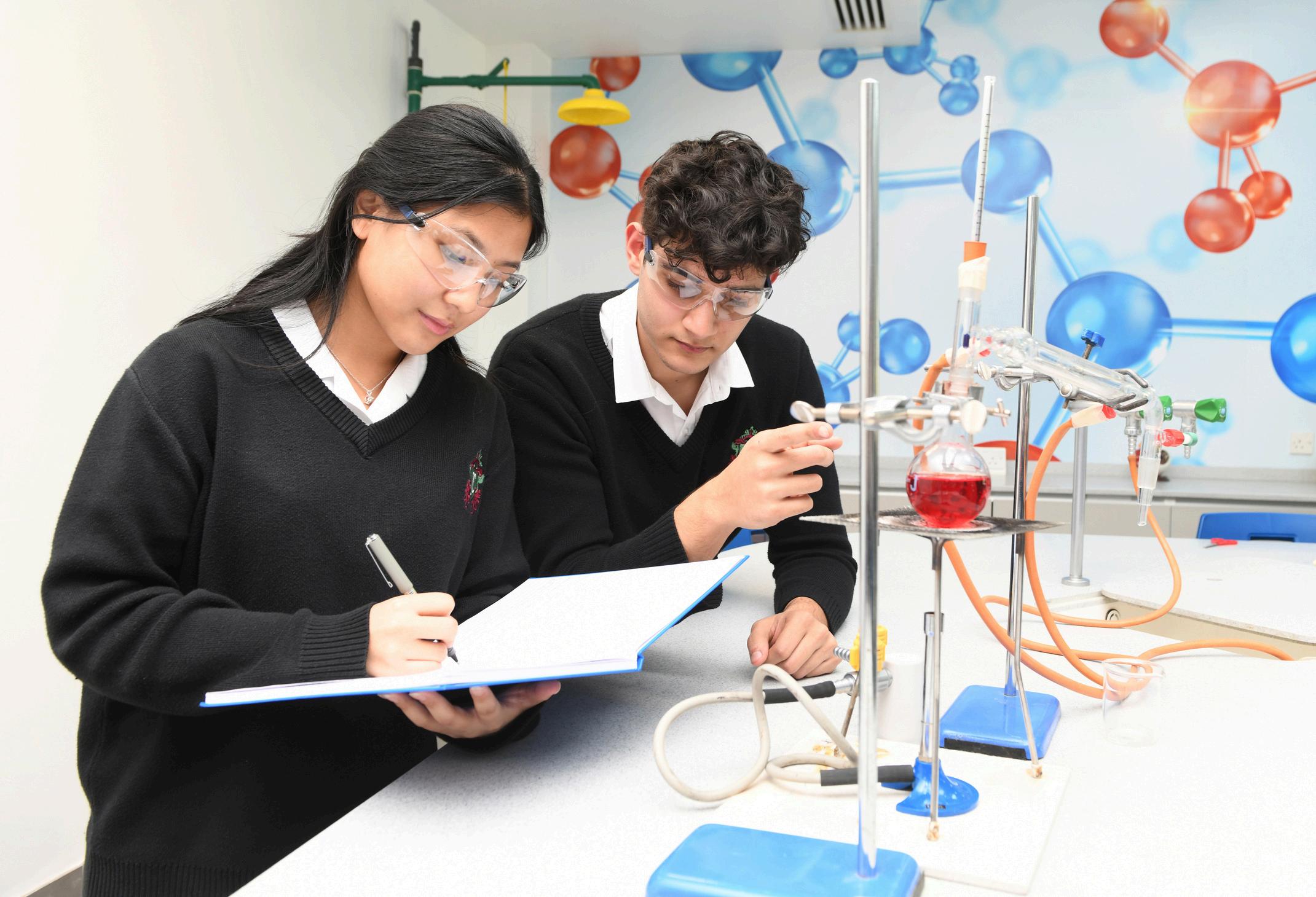
Business Studies
BTEC Business Studies
Chemistry
Computer Science
Drama and Theatre Studies
Economics
English Language
English Literature
French
Further Mathematics
Geography
History
Information Technology
BTEC Information Technology
Mathematics
AS Mathematics
Media Studies
Music
Photography
Physical Education
Physics
Politics
Product Design
Psychology
Sociology
Spanish
BTEC Sport
Extended Project Qualification

It is with great pleasure and enthusiasm that I extend a warm welcome to you as you consider joining our vibrant Sixth Form community at Jumeirah College. As the Principal of this esteemed institution, I am honored to introduce you to an educational journey that goes beyond conventional boundaries, fostering not just academic excellence but also personal growth and character development
Our Sixth Form at Jumeirah College is a hub of intellectual curiosity, where students are encouraged to explore their passions, think critically, and become lifelong learners We believe in providing a holistic education that prepares our students not only for the challenges of higher education but also equips them with the skills and values necessary for success in an everevolving global landscape
At the heart of our Sixth Form is a dedicated and experienced team of educators committed to nurturing the unique talents and aspirations of each student We offer a diverse range of A-level and vocational courses, allowing you to tailor your academic journey to align with your interests and future goals. Beyond the classroom, our extensive extracurricular activities, leadership opportunities, and community engagement programmes provide a rich tapestry of experiences that complement the academic curriculum
As you peruse this prospectus, I invite you to envision the possibilities that await you at Jumeirah College Join us in creating an environment where innovation, collaboration, and a passion for learning converge to shape not just successful students but responsible and compassionate global citizens
I look forward to the prospect of welcoming you into our Sixth Form family, where you will find not only an exceptional education but also a supportive community that values your individuality and encourages you to reach your fullest potential.
Best Regards,
Nick Brain Principal

Read our previous inspection reports here
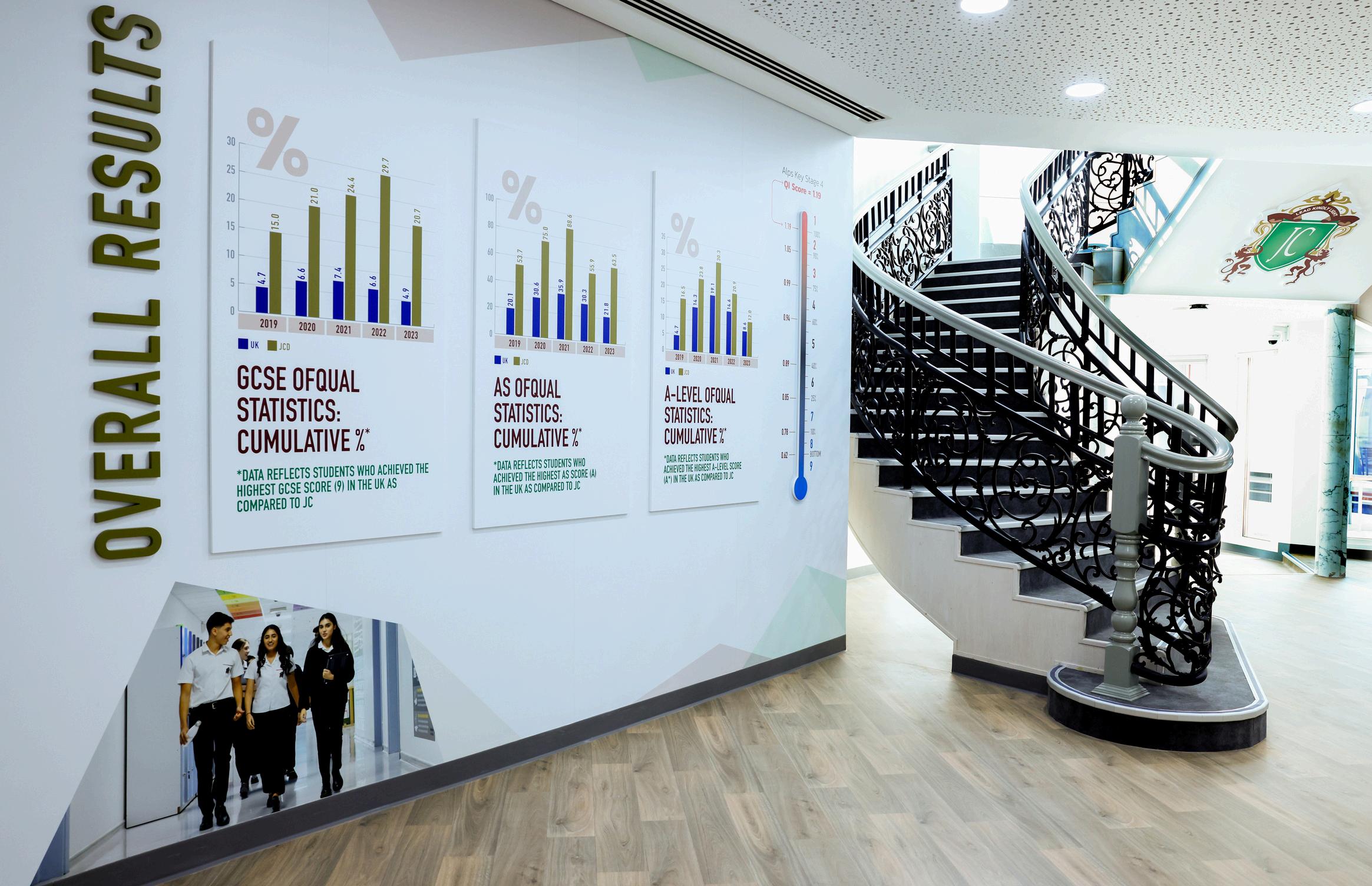

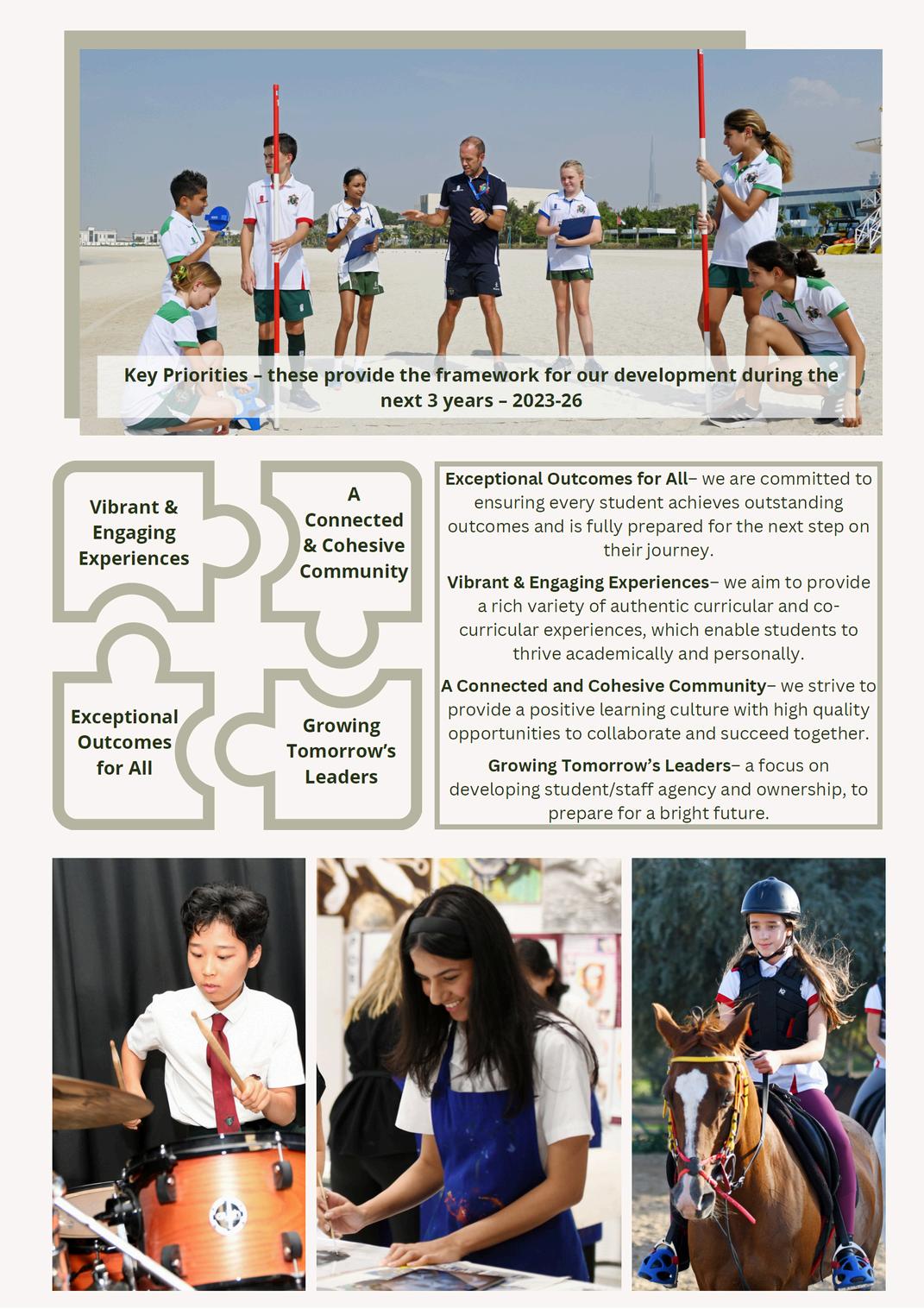
Thank you for your interest in Jumeirah College It is my pleasure to welco you to this exciting chapter of your academic journey Our Sixth Form is not just a continuation of your education; it is a transformative experience designed to empower you to thrive in a rapidly evolving world. Whether you are transitioning internally from Year 11 or joining us from another school in the region or beyond, we do hope that the information attached will support you to make an informed decision
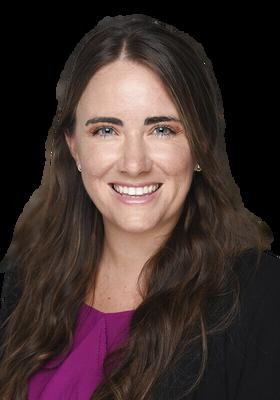
Joining our community means becoming part of a dynamic environment th supported by an innovative and caring framework Our experienced and de y guidance counsellors and wider community are here to ensure that every st diverse range of co-curricular, super-curricular and leadership opportunities, our students are well-prepared to navigate the dynamic challenges of the future
We take immense pride in our long-standing tradition of academic excellence and are committed to the delivering high-quality teaching and learning Our Sixth Form builds on the solid foundations laid in Key Stages 3 and 4, providing varied learning experiences that prepare students for higher education and future careers It is vital to us that each student reaches their full potential, and we work collaboratively with them and their families to achieve this goal
We celebrate and respect individuality and diversity within our community As senior members of the student body, Sixth Form students have both the responsibility and the opportunity to positively shape our culture They serve as role models, supporting their peers in academic and extracurricular pursuits Our consistent A Level achievements reflect our commitment to excellence, enabling our students to secure places at prestigious institutions around the globe
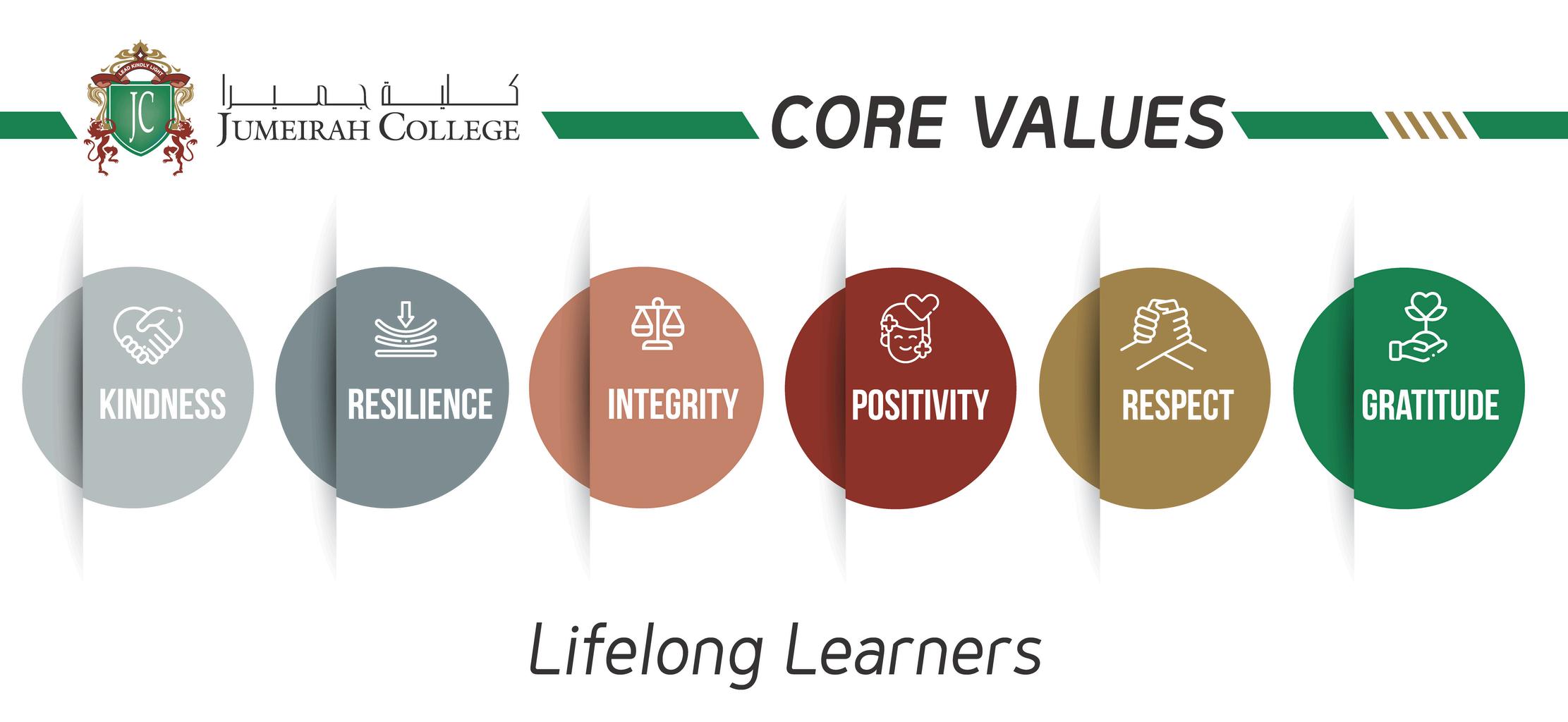
I invite you to explore the information in this prospectus and consider how Jumeirah College can help you unlock your full potential. Should you have any queries that are not addressed in the information provided, please do not hesitate to contact us
We look forward to welcoming you into our thriving Sixth Form community
Yours sincerely,
Michelle Ryan Assistant Principal
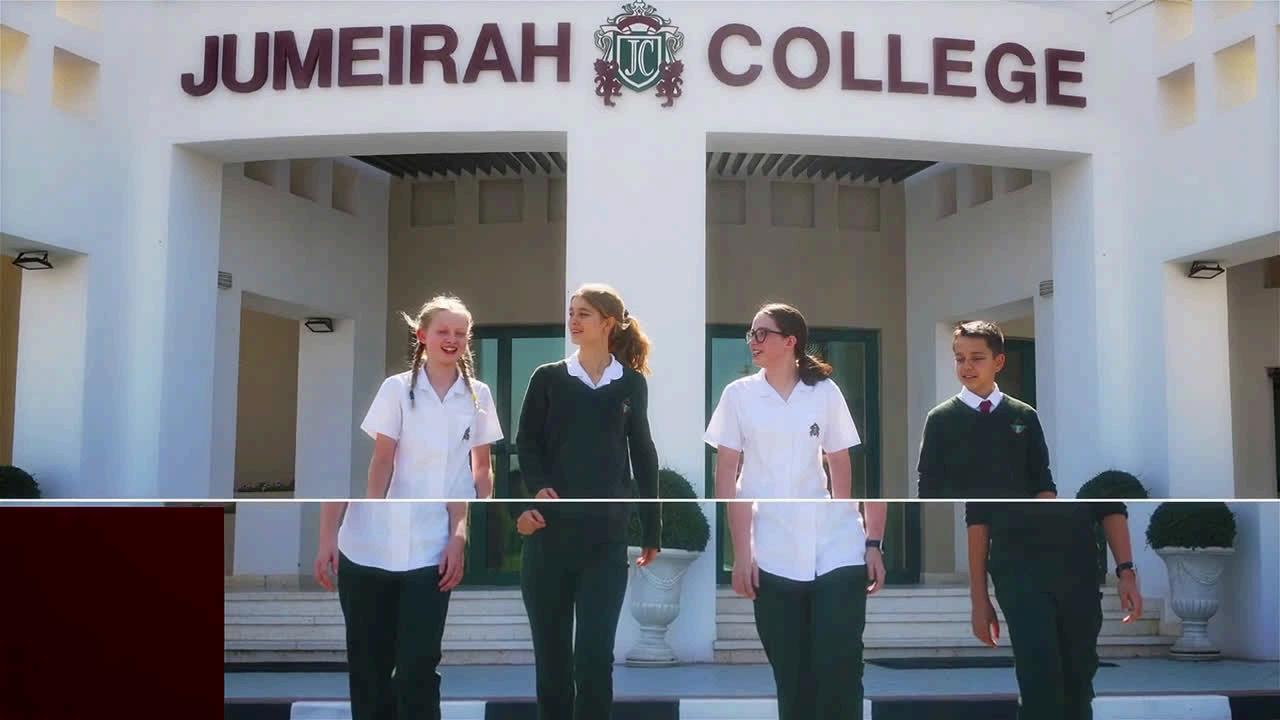

There is a “learning buzz” in lessons and around the college Children brim with excitement and a clear thirst for knowledge Their curiosity and sharp critical thinking skills shine through - Read the full BSO Inspection Report 2023

With the changes to A Levels in 2017, we have seen fundamental changes to our sixth form syllabus over the last few years Historically the majority of our students started with four subjects and reduced this to three after AS results at the end of Year 12 This is no longer the case
The standard offer at Jumeirah College is now for students to begin with three subjects in Year 12, although some will take four, depending on student ability Students wishing to sit four subjects will require a GCSE grade profile to reflect this, and therefore will be required to achieve 8 As/7s or above at GCSE to begin four A Level courses
We have taken this decision based on several factors:
Universities invariably only ask for three grades as entry requirements/offers and want the best three grades a student can achieve
Only a select number of courses at certain Universities require more than three A Levels, for example a small number of courses require an AS qualification in Further Mathematics Students are encouraged to research carefully when considering courses & universities and avail of the careers interviews in Year 11
Studying four subjects, whilst admirable, dilutes a student’s efforts at a time when they are acclimatising to new more rigorous courses and increased expectations that they will be able to work independently This can have a detrimental effect on their chances of success
Many of our most able students have increasingly voluntarily moved from four to three subjects due to their increasing awareness of university requirements, as well as their experience of managing the workload expected from those studying the new A Level courses
The new A Levels are more challenging for students and, with many subjects now not offering AS Levels, combined with the reduction in worth of the AS qualification, studying a fourth subject at AS is no longer beneficial for the majority
Students could therefore take a mixture of AS/A2 subjects, sitting AS levels at the end of year 12 and A2 exams in Year 13 Alongside these qualifications they might also be sitting purely linear A Level subjects with all their units being examined at the end of the two years Students must sit both parts of the new courses to gain a full A level AS levels have to be re-examined at the end of Year 13 unless they are cashed-in as standalone AS qualifications Therefore, students completing the AS in Year 12 would need to repeat the AS exam at the end of Year 13 to qualify for the full A Level
From 2020 we began offering AS Mathematics as a standalone 2 year qualification This reflects the desire of many students with a Grade 7 at GCSE to study Mathematics post-16 This will equate to half a full A Level Therefore some students from next year will be taking 3 5 subjects if they are studying the AS Mathematics However, it is important to note that these students will not have access to the full A Level, only the AS
Below is a table detailing those subjects which we offer as AS Levels, and those that are purely linear courses and therefore sat in their entirety at the end of Year 13
It is important to note that students are embarking on a two year course and as such the AS examinations aim to provide an external checkpoint, rather than a cash-in opportunity Students are required to study three A Levels to be registered with the Jumeirah College Sixth Form, therefore there is no opportunity for a student on three subjects to drop one after AS Level
Offer AS Level
Arabic Biology
Business Studies
Chemistry
Economics
French
Further Mathematics
Information Technology
Mathematics
Music
Music Technology
Photography
Physics
Psychology
Sociology
Spanish
Only available as full A Levels
BTEC Applied Science
Art & Design
BTEC Business
English Language
English Literature
Geography
History
BTEC ICT
Media Studies
Physical Education
Politics
Product Design
BTEC Sport
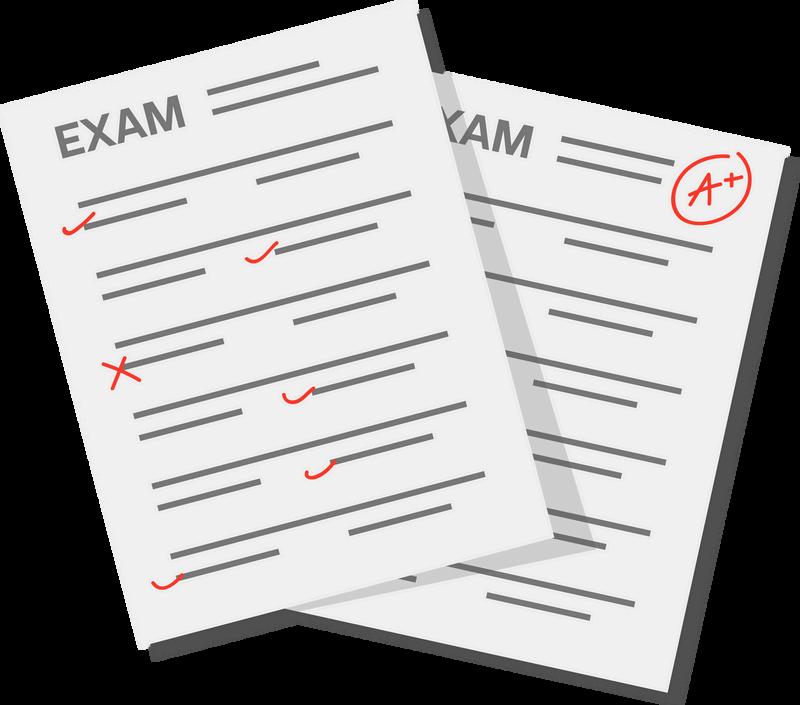
A level courses are linearly assessed with examinations only taking place in May/June The opportunity to re-take modules in January, which had been possible in the past, is no longer available.
The Sixth Form timetable for Muslim students includes two compulsory lessons of Islamic Education per week Students' registered under Arab passports will also study Arabic for three lessons per week and complete the Ministry curriculum and subsequent internal assessments These are both mandatory Ministry requirements that are common across all UAE schools, for both Year 12 and 13.
Students considering attending universities locally are advised to research their entry requirements, specifically with regard to the study of Arabic Even students not holding Arab passports may be required by some local universities to study and pass examinations in Arabic until the end of Year 13 We can facilitate these lessons and examinations but the onus is on the student to notify us of this necessity as part of the application process
Where students are at risk of not making Sixth Form entry requirements, this conversation will have been ongoing with the pastoral team and an alternative pathway may be advisable Our entry requirements are not particularly high by English comprehensive standards and therefore students who struggle to meet them may find a hybrid approach to selecting their courses advisable. For this reason we have decided to introduce some BTEC Diplomas to our suite of courses These are A Level equivalent and recognised by universities, but largely internally assessed, thus removing the pressure of examinations
ThestandardentryrequirementforAlevelstudyatJumeirahCollegeis: sixgradesat9to5,twoofwhichmustbeEnglishLanguageandMathematics.
YouwillnormallybeexpectedtohavegainedatleastaGCSE grade6intheAlevelsubjectsyouwishtostudyHowever, somesubjectshavehigheroradditionalrequirements,therefore pleaserefertothesubjectspecificpagesforexactentrycriteria
ThosestudentswishingtostudyfourALevelsubjects willrequireeightormoreGCSEgradesat7(A)orhigher
Grade9/8=A*
Grade7=A
Grade6=B
Grade5/4=C

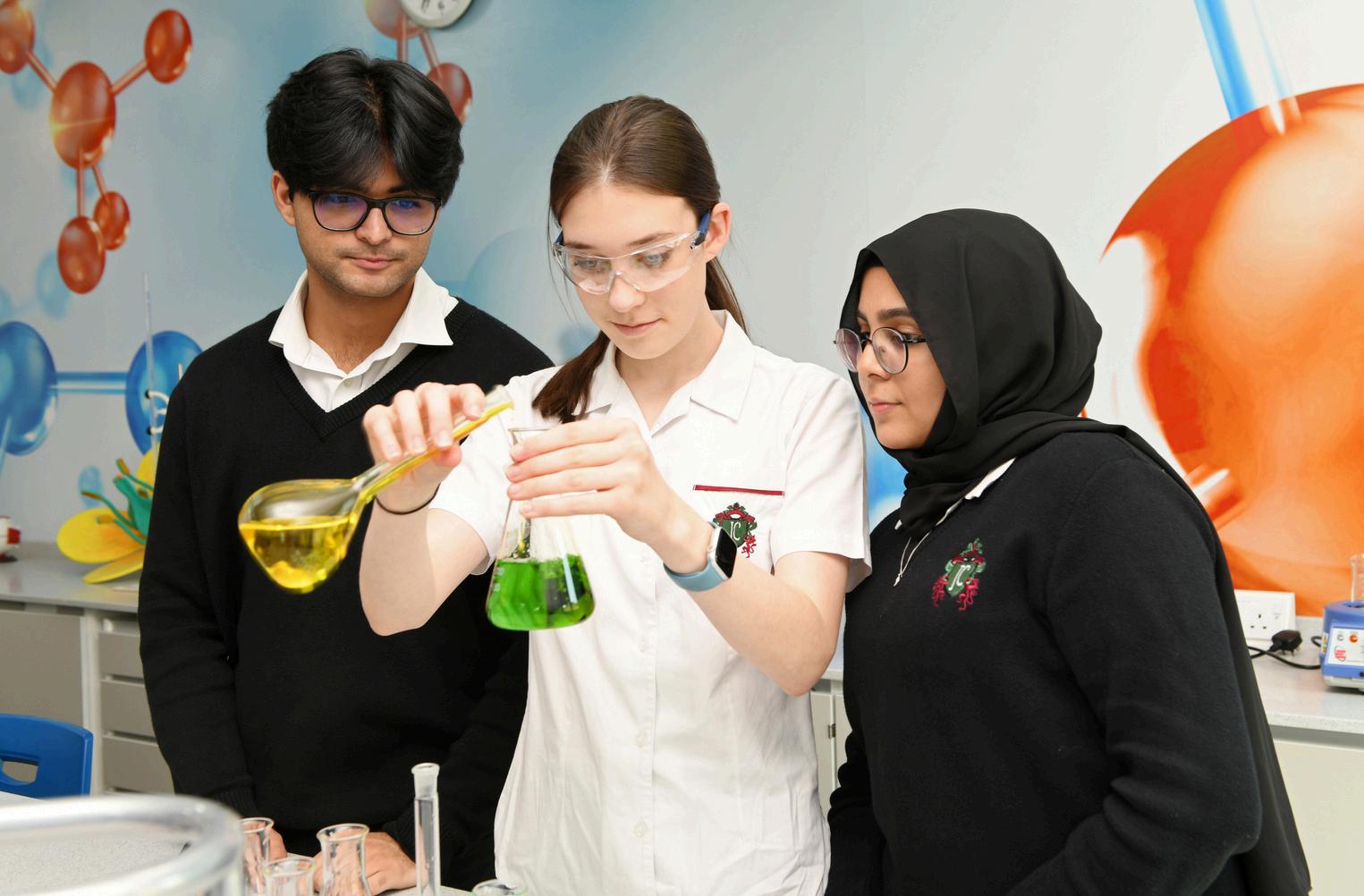
When selecting your final A Level subjects remember the following:
Consider which subjects you enjoy and achieve well in now, but also consider new subjects you have not experienced before which are of interest to you
Research which subjects are required or of benefit for the career you wish to pursue. This is discussed in the careers action planning meeting with our careers advisor for internal applicants and in the entrance interviews for all applicants
Ensure that you do not exclude yourself from any university courses that you may wish to pursue (for example by having too few full A levels or the wrong subjects)
Prioritise your subjects in order of interest and value to you
Ultimately, most university courses want your best three grades, this is therefore your primary concern and aim
Make an informed decision Pay particular attention to the course specifications to ensure you will be able to engage with the content; speak to older students who have studied those courses you are considering to gauge their experience; and analyse subjects’ past success rates for students with your profile in terms of results and transition to university courses
S e l e c t i n g y o u r A L e v e l C o u r s e s
Subject Exam Board
Minimum GCSE Grade required for entry
Opportunity at A level without completion of GCSE in subject
BTEC Applied Science Pearrson - Sixth Form Minimum Entry Req
Arabic Pearson 6 in Arabic
Art and Design
Biology
Pearson 5 in Art and Design
Native Speaker
Meeting with HOD
Pearson 7 in Biology/8 in Combined Science, and a 6 in English Language No
Business Studies AQA 6 in Business Studies 6 in English, Humanities or Social Science
BTEC Business Studies Edexcel - Sixth Form Minimum Entry Req
Chemistry
AQA 7 in Chemistry/8 in Combined Science and a 6 in Mathematics No
Computing Cambridge 7 in Computer Science
Drama and Theatre Studies Pearson 6 in Drama
Meeting with HOD
Meeting with HOD
Economics AQA 7 in Economics 6 in English, History or Psychology
English Langauge AQA 6 in English Language No
English Literature AQA 6 in English Literature No
French AQA 6 in French
Native Speaker
Geography Pearson 6 in Geography 6 in English and Mathematics
History Pearson 6 in History 6 in English Literature, Geography or Economics
Information Technology Cambridge 6 in ICT
Meeting with HOD
BTEC Information Technology Pearson - Sixth Form Minimum Entry Req
AS Mathematics Pearson 7 in Mathematics No
Mathematics Pearson 8 in Mathematics No
Further Mathematics Pearson 8 in Mathematics No
Media Studies AQA - 5 in English Language
Music AQA 6 in Music and Grade 7 standard instrument/voice
Meeting with HOD
Photography AQA - 5 in Art and Design
Physical Education AQA 6 in Physical Education and 6 in Science/7 in Combined Science No
Physics AQA 7 in Physics or 8 in Combined Science and must qualify for and be taking AS or A Level Maths No
Politics Pearson6 in History, Economics, English or Geography
Product Design AQA 6 in Design & Technology No
Psychology AQA 6 in Psychology 6 in English Language and Science
Sociology AQA - 6 in English Language
Spanish AQA 6 in Spanish
Native Speaker
BTEC Sport Pearson - Minimum Entry Requirements
Extended Project Qualification Edexcel - 8 in English Language S u b j e c t E n t r y R e q u i r e m e n t s
AS Level Results 2018 Candidates:139 Entries:329
Candidates:145 Entries:350
Candidates:111 Entries:148
Candidates:73 Entries:167
Candidates:128 Entries:347
Candidates:140 Entries:378
Candidates:168 Entries:453

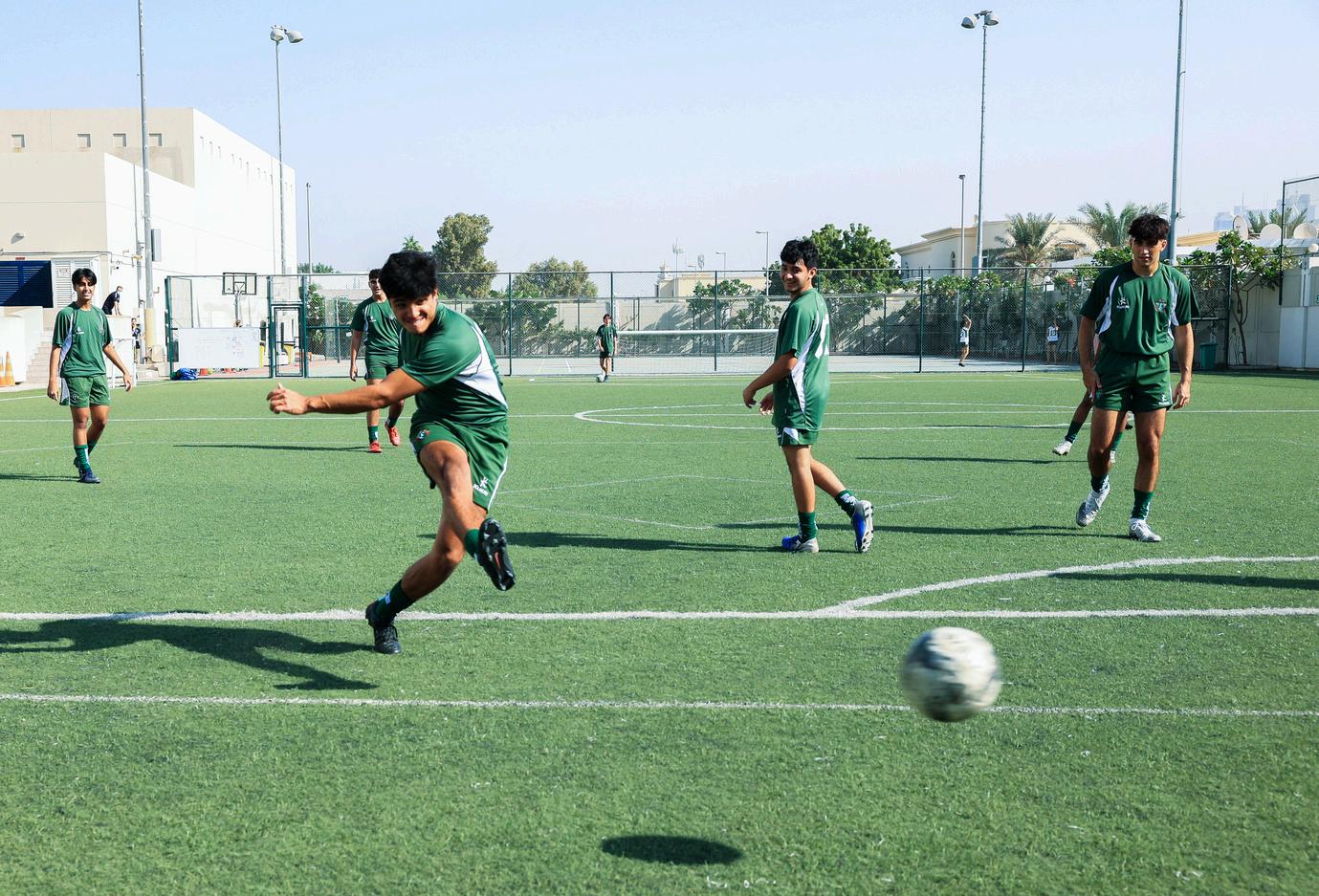
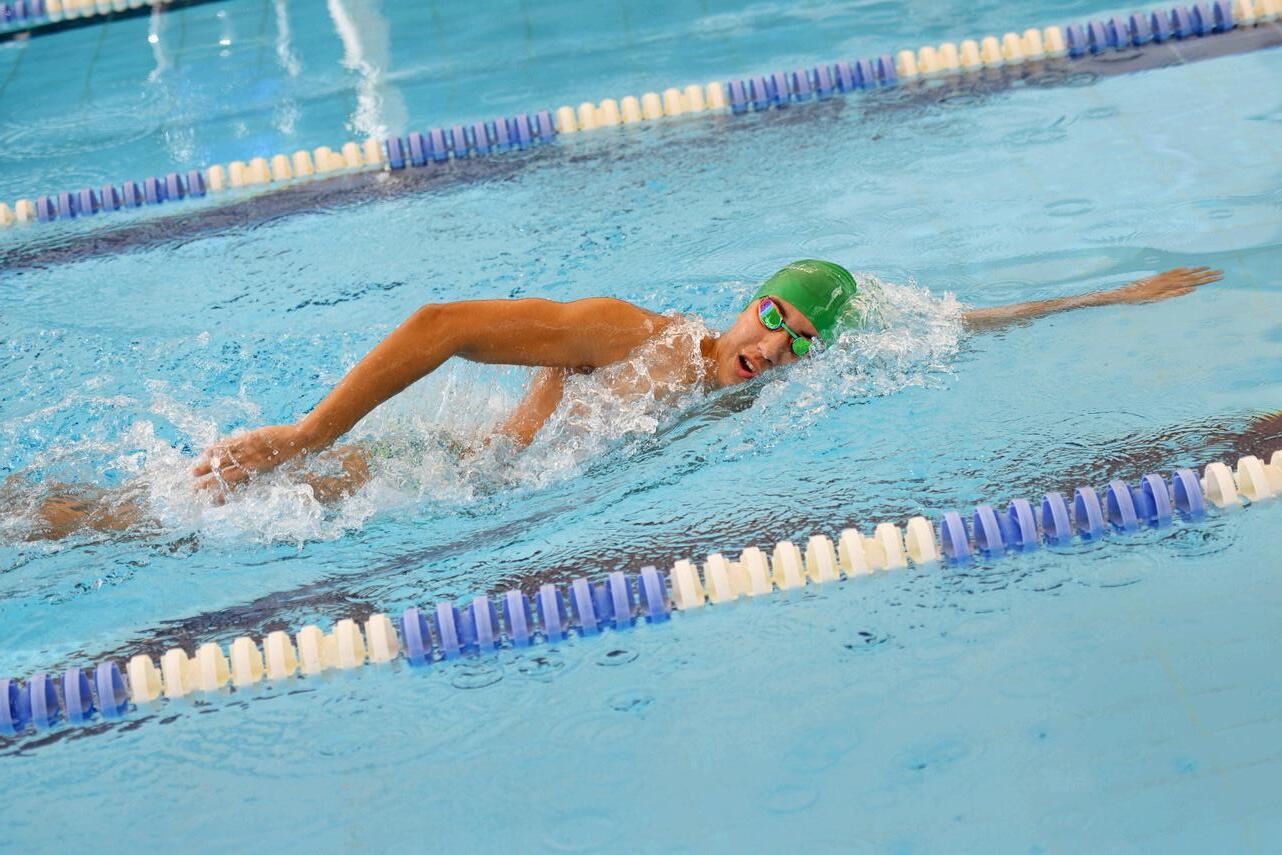
In addition to lessons for their chosen academic subjects, students will also benefit from the following elements on their timetable
Personal, Social, Health, Citizenship and Economic Education (PSHCEE)
Students will have weekly PSHCEE lessons or tutorials with their tutors The course covers a wide range of important issues such as health and safety, life skills, living at university, morality and ethics, and appreciation of the local culture
Study
When students are not in timetabled lessons, the Sixth Form has a suite of rooms in which students are expected to focus on enhancing their studies independently It is vital for Sixth Form students to appreciate the demands of A levels before they begin and learn how to manage their time effectively For every formal timetabled lesson, a minimum of one hour of independent study/ reading and/or revision is required By using their study periods effectively, students are able to maintain a suitable balance in their lives beyond the College.
Students are expected to engage in a Complementary Studies activity each week For some this can be facilitated during the normal timetable; for others, enrichment activities are accessed after College hours and at weekends This enables them to demonstrate to universities and employers that they have interests and skills beyond the curriculum and are committed to developing qualities that complement their academic achievements It is hoped that students will choose a variety of options from the strands that involve volunteer work, skills acquisition and recreation, examples of which are given below
Volunteer Work
Anti-Bullying Ambassador Programme
Peer Mentoring (either in JC or JPS)
First Aid Qualification
Life-guarding Qualification
PADI Diving Course
Model United Nations Coaching
Gym session
Rugby/Netball Coaching
Sports Leader Award
Extended Project Qualification
Work experience placement
S i x t h F o r m E n r i c h m e n t
Jumeirah College has a strong reputation for its sporting achievements Students who wish to continue their sporting participation have the opportunity of both on and off site activities, in competitive teams and individual sports Some of our most competitive teams include: football, rugby, netball, basketball, duathlon, athletics, rowing, swimming and cricket Students are also encouraged to undertake sporting activities for purely fitness and recreational purposes
Many students who may not be continuing the academic study of music or drama will have opportunities for ensemble instrumental playing, singing or acting. Sixth Form students are encouraged to become involved in all aspects of performing arts including the College productions and the music recitals A wide range of instrumental lessons are also offered at Jumeirah College
Department-based responsibilities
Students who are interested in developing their skills within a certain area of the curriculum can create leadership opportunities, such as the Spotlight Club, Green Team, muralist team and as contributors to the JC Juice, our student edited periodical
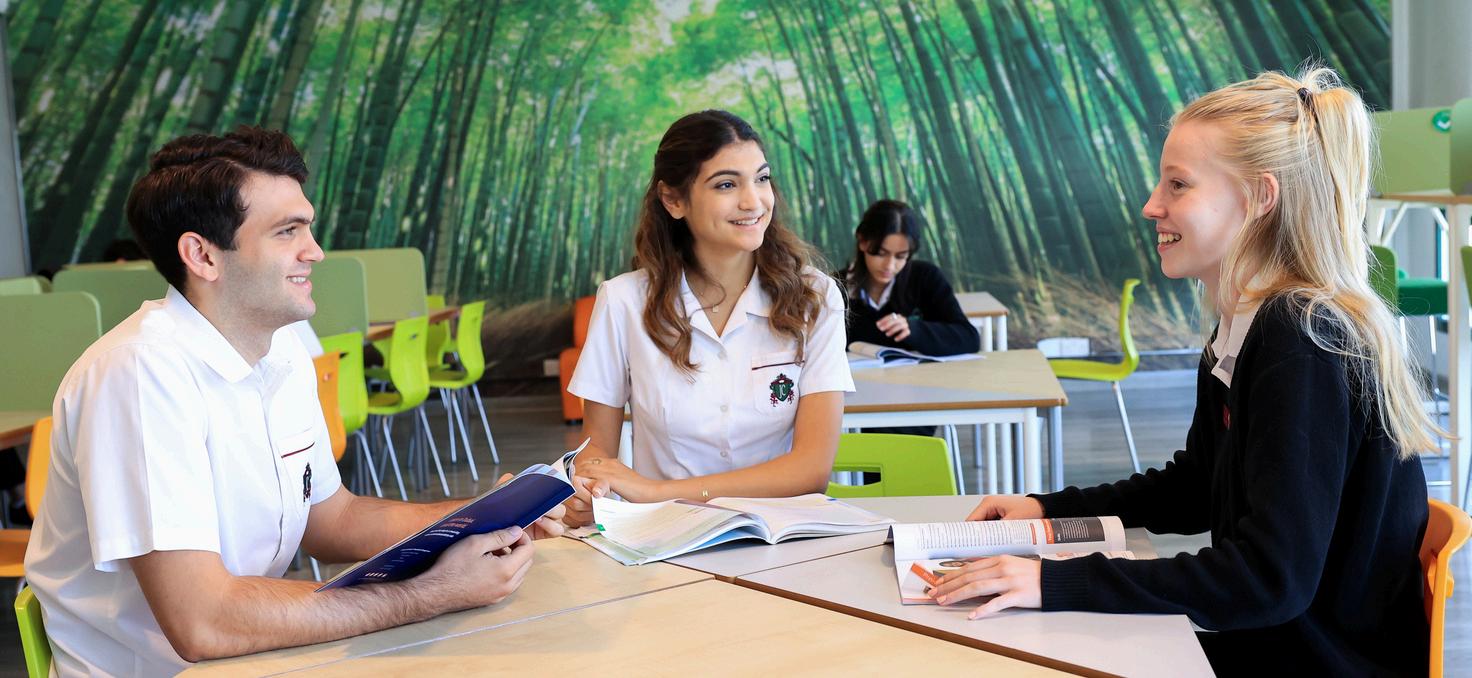
S i x t h F o r m E n r i c h m e n t

College Executive
The College Executive consists of two Head Boys and two Head Girls They oversee the Student Council and the Sixth Form Council They are Jumeirah College ambassadors, greeting and guiding VIPs, addressing parents and serving a plethora of other functions, chief among them as Front of House for the many events the College hosts. However, all Sixth Form students at the College should be prepared to fulfil these tasks should the need arise
House Captains
In Term 2 of Year 12, eight students are chosen through a rigorous procedure of application and selection including a panel of interviews (consisting of students from the Student Council) to lead approximately 300 students of the College The House Captains organise all inter-house competitions and promote College spirit at all College events
Sports and Arts Captains
Two Sports and two Arts Captains are elected per year as ambassadors for sport and the arts in the College Their role is to coordinate support and celebrate successes at formal events and chair students meetings (e g Arts Council)
Sixth Form students also have the opportunity to discuss issues that directly relate to their College life through the Sixth Form Student Committees (social, charity, sport, treasury, cultural and photography) These committees liaise closely with the Sixth Form leadership team and are responsible for the organisation of the social activities for the Sixth Form
Student Council
Sixth Form students are involved with their Form Councils and elect representatives to the Student Council Sixth Form representatives work closely with the College Executive who chair the student council
Peer Mentoring
As senior members of the College, Sixth Form students are involved in supporting younger students in a peer mentoring scheme Students will also participate in the Study Pod programme to help younger students with their academic studies
Societies
Sixth Form students are able to form their own societies based on their own individual interests to facilitate a forum for like-minded people to meet and discuss research and emerging trends Examples of current societies are the Oxbridge Club, Economics Society and Medical Club
S i x t h F o r m L e a d e r s h i p
STUDENTEXECUTIVE







































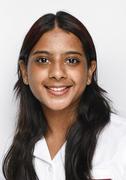







S i x t h F o r m L e a d e r s h i p
Post-18 choices are discussed with students in Key Stage 4 and these conversations are continued into the Sixth Form All students can request an individual guidance interview with the Careers Advisors, Joanne Howes and Sara Prince, to support their informed decision making
Jumeirah College has developed strong links with universities in the UK, Canada, USA and Australia. Guests from visiting universities give presentations on aspects of university life and the application process
The destination of all students is important to the College and so our programme of support is strong and targeted at preparation for both university and the world of work Mock interviews are carried out to support work and university applications with senior members of staff from the College, university alumni and other professionals We organise Higher Education sessions where students and parents are invited to attend a series of workshops including understanding UCAS, Personal Statements, Applying to American Colleges, European Universities to name but a few, and we often have guest speakers from institutions across the world

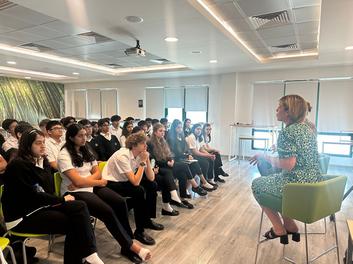
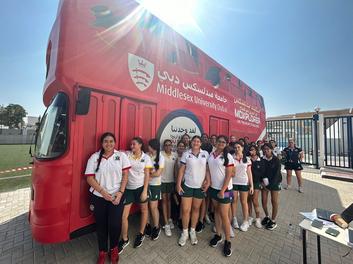
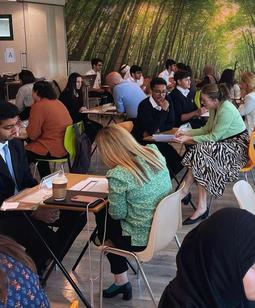
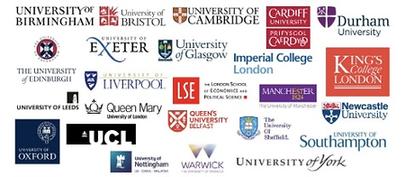
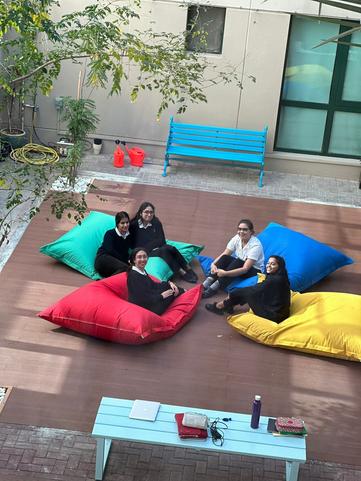

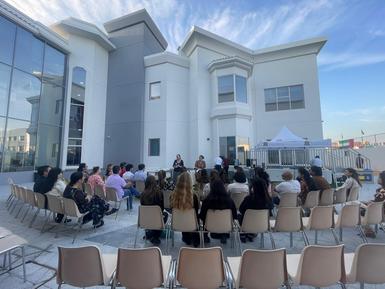
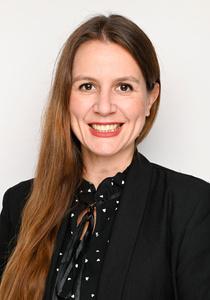
H i g h e r E d u c a t i o n G u i d a n c e
25 September 2024
13 November 2024
October - November 2024
4 December 2024
9 December 2024 (3pm)
6 February 2025 (3pm)
March-April 2025
21 August 2025
25 August 2025
Student Presentation
Parent Webinar
Career Interviews
Student Marketplace
Soft Intentions Deadline
Application Deadline
Conditional offers issued
GCSE Results Day
Deadline for confirming A Level choices (subject to meeting entry requirements)
September 2024-May 2025
Ongoing
From March 2025
25 August 2025
Completed applications accepted and reviewed as they are submitted
Applications accepted for external candidates Once all documentation has been received, selected students will have a confidential reference requested from their current school Short-listed external candidates will be called for an interview with the Head of Sixth Form or another senior member of College staff
Sixth Form conditional offers will be issued as places on specific courses become available Places are held provisionally pending results only when all acceptance criteria are met
Deadline for students to officially submit their final GCSE grades to the Jumeirah College Registrar and confirm choice of A Level courses Students who do not meet the entry requirements for any course for which they have received a conditional offer will need to contact the College to discuss any possible alternatives before 25 August
Jumeirah College
Sixth Form
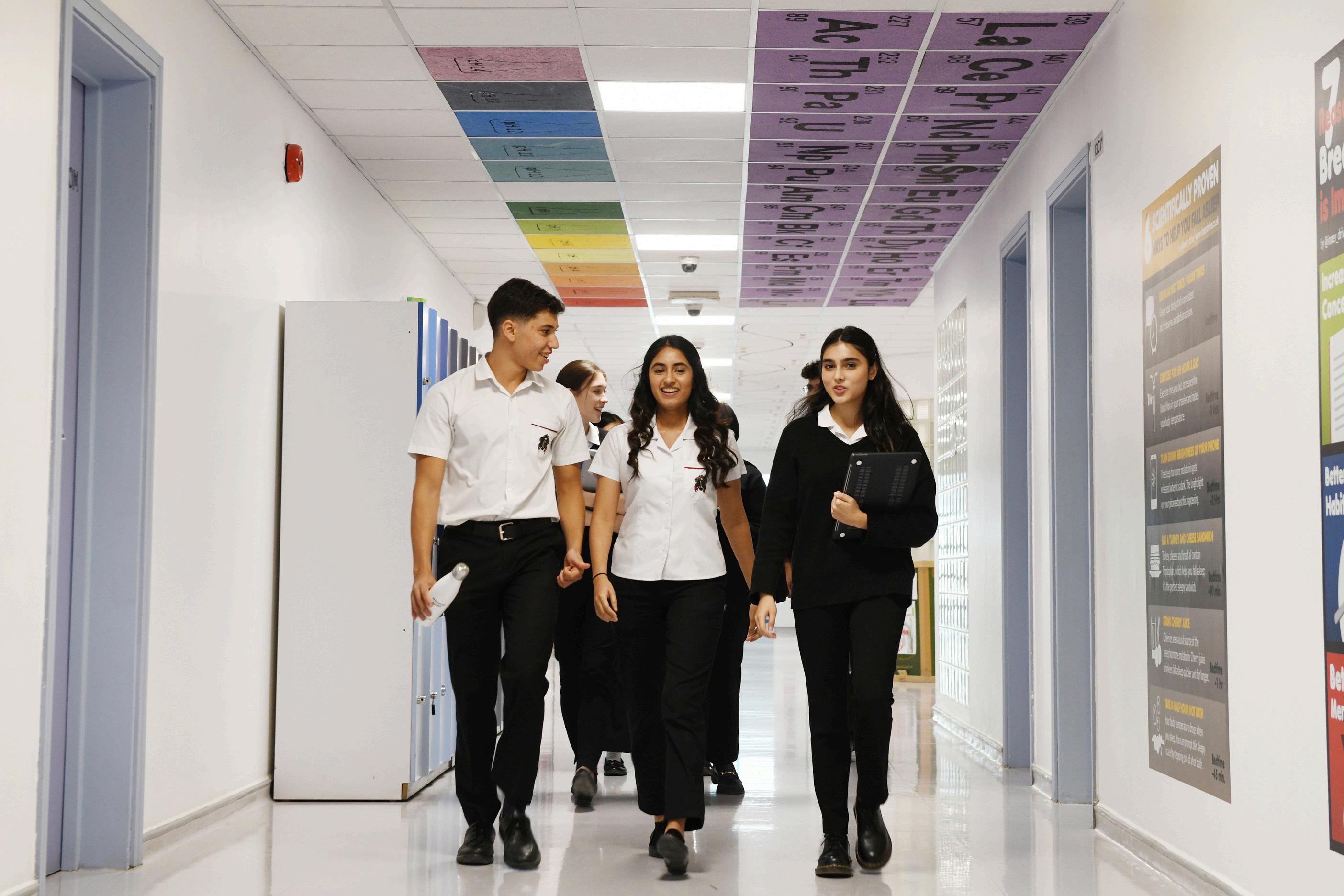
Head of Department: Mr A Berry
Available Levels: International Level 3
Subsidiary Diploma
What are the aims of the course?
Exam Board: Pearson
The Pearson BTEC International Level 3 qualifications in Applied Science are designed for learners in the 16–19 age group, who wish to pursue a career in science-based industries via higher education to access graduate entry employment with science, or, alternatively through junior science-based employment
360 GLH Equivalent in size to one International A Level Six units of which three are mandatory and assessed using Pearson Set Assignment Mandatory content (50%)
This qualification is designed to support learners who are interested in learning about the science industry alongside other scientific fields of study, with a view to progressing to a wide range of higher education courses, not necessarily in science-related subjects. The qualification is designed to be taken as part of a programme of study that includes other appropriate BTEC International Level 3 qualifications or International A Levels
Specific entry requirement:
Students will need to show the ability to gain a strong Pass at GCSE, therefore, a 6 in Triple Science or a 6-6 in Combined Science is preferred
What could these qualifications lead to?
This qualification supports progression to job opportunities in the science industry at a variety of levels Jobs available in these areas include:
Chemical Technician
Biomedical Scientist
Clinical Scientist
Environmental Scientist
After achieving this qualification, while learners can progress directly to entry-level science roles, it is likely that many will do so via higher study This qualification is recognised by higher-education institutions as fully meeting admission requirements to many relevant courses in a variety of areas of the science sector, for example:
BSc (Hons) in Chemistry with Analytical Science
BSc (Hons) in Bioscience
BSc (Hons) in Environmental Science
Higher National Diploma (HND) in Applied Science
NB: Learners should always check the entry requirements for degree programmes with the relevant higher education provider
Entry Requirements: Sixth Form Entry Requirements 6 in Triple Science/ or 6-6 in Combined Science preferred B T E C A p p l i e d S c i e n c e

(M) Mandatory. All other topics are optional
How is it assessed?
Assessment is designed to fit the purpose and objective of the qualification. It includes a range of assessment types and styles suited to vocational qualifications in the sector All assessment is internal but some mandatory units have extra controls on assessment and are assessed using Pearson Set Assignments Additionally, some units are synoptic
Achievement of the qualification requires demonstration of depth of study in each unit, assured acquisition of a range of practical skills required for employment or for progression to higher education, and successful development of transferable skills Learners who achieve a qualification will have achieved across mandatory units, including synoptic assessment, where applicable
Units are assessed using a grading scale of Distinction (D), Merit (M), Pass (P) and Unclassified (U).
All mandatory and optional units contribute proportionately to the overall qualification grade, for example, a unit of 120 GLH will contribute double that of a 60 GLH unit
Further information
Head of Department: Mr W Hegazi (Arabic B) Exam Board: Edexcel
Available Levels: IAS Level and IA Level
Entry Requirements: 6 in Arabic or Native Speaker
What are the aims of the course?
The Arabic International A Level is a natural progression from GCSE. This course demands a high ability in reading comprehension and in manipulation of the written language in a variety of practical and relevant contexts It aims to encourage students to:
develop an interest in, and enthusiasm for, language learning develop understanding of the language in a variety of contexts and genres communicate confidently, clearly and effectively in the language for a range of purposes develop awareness and understanding of the contemporary society, cultural background and heritage of countries or communities where the language is spoken consider their study of the language in a broader context
What is involved in the IAS course?
This course consists of three sections:
Section A: Reading & Translation into English
Section B: Grammar
Section C: Essay
Students are required to convey their understanding of written Arabic through a series of reading tasks They also need to draw upon and apply their knowledge of Arabic language, grammar and lexis to produce a short translation from Arabic into English, as well as demonstrate an ability to manipulate Arabic language in continuous writing
Students will be expected to recognise and use Arabic in a variety of contexts and in relation to the following general topic areas:
Youth culture and concerns
Lifestyle: health and fitness
The world around us: travel, tourism, environmental issues and the Arabic-speaking world
Education and employment
How is it assessed?
The assessment will be through a 2 hour 30 minutes paper in three sections
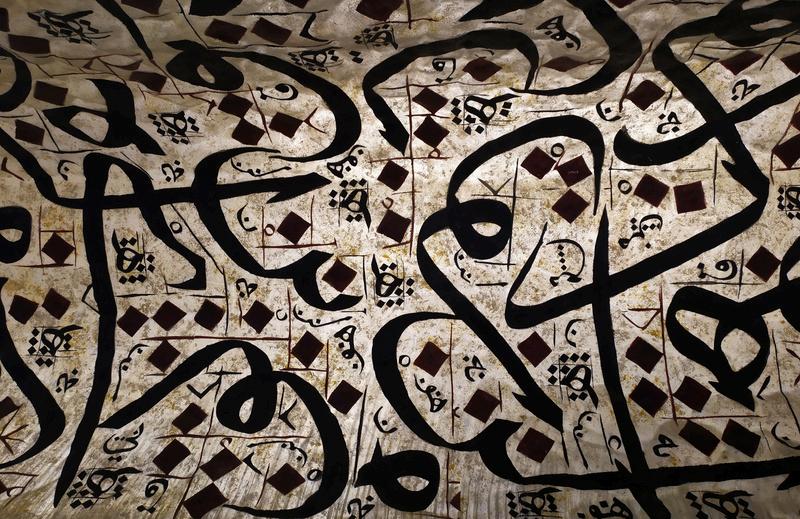
What is involved in the A2 course?
This course consists of three sections
Section A: Translation
Section B: Creative essay
Section C: Research based essay
Assessment: 3 hour paper in three sections
Section A: Students will be expected to undertake a short translation from English into Arabic
Section B: Students will be expected to recognise and use Arabic in a variety of contexts and in relation to the topic areas which include:
Youth culture and concerns
Lifestyle: health and fitness
The world around us: travel, tourism, environmental issues and the Arabic-speaking world
Education and employment
Customs, traditions, beliefs and religions
National and international events: past, present and future
Literature and the arts
Section C: Students must answer one questions in Arabic, that each relate to a topic or a text chosen from the prescribed list
Specific entry requirement:
6 in Arabic or native speaker with good command of grammar and writing
Why is it a useful qualification?
An advance language qualification is very highly regarded by employers and by universities and colleges
Greatly enhanced employability in the Middle East and worldwide throughout the increasingly, global economy
A range of study and career opportunities in fields such as travel and tourism, education, politics, law, journalism, trade, marketing and publishing
Communication and personal skills to benefit any future direction chosen
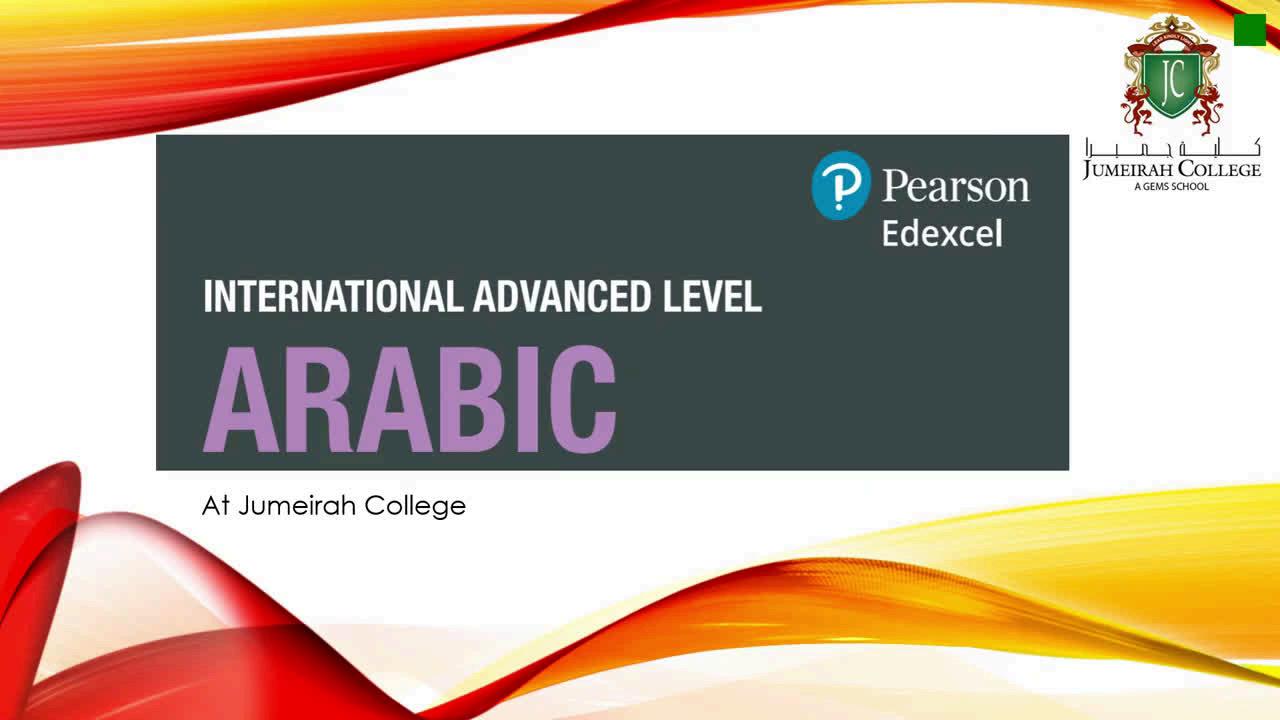

Head of Department: Miss S Jackson
Available Levels: A Level (9AD0)
Exam Board: Edexcel
Entry Requirements: 5 in Art and Design Meeting with HOD
What are the aims of the course?
The A-Level Art and Design course has been designed to encourage an adventurous and enquiring approach to art and design Successful students will be able to demonstrate an understanding of past and contemporary art and design practice and be able to produce artwork that embraces a range of ideas Students will explore past and contemporary Art and Design, analysing the works of artists and designers and will use a journal/sketchbook as the integral part for recording and documenting their responses and own ideas
What is involved?
The Year 12 “Foundation Course” is intended to form the basis on which students develop their knowledge, skill and understanding in creating a rich visual language within the context of selected ideas. Through workshop skills based activities, students will be encouraged to work confidently and will be expected to build on and develop their recording skills and demonstrate skilful use of the formal elements, including line, tone, colour, shape, pattern, texture, form and structure. In developing these skills, students will experiment with a wide range of media and methods, learning how to transform materials in order to reflect the different qualities of their observed forms and images Through an informed use of visual language, students can more successfully develop and communicate their ideas
In Year 13 the A2 Art and Design course follows on from what students have learned, however the emphasis during the second year is on the process of independently developing both ideas and work through a personal study investigation unit Students will explore past and contemporary Art and Design, analysing the works of artists and designers Students will be able to produce a personal and in-depth response, embracing a range of ideas, while confidently exploring a range of media and process Central to this is the journal, a working sketchbook Students will also be required to produce a written piece of 1000-3000 words (Personal Study), which will be Component 1
In the second term students will be given the externally set assignment (Component 2) which will contain suggestions for a starting point Students will have eight school weeks to prepare for the timed test During this time they will explore the theme in depth, within their journals/sketchbook and through preparatory studies The final examination lasts 15 hours and within this time students will produce their final idea Their preparatory and developmental work, along with the final pieces will then be submitted for assessment
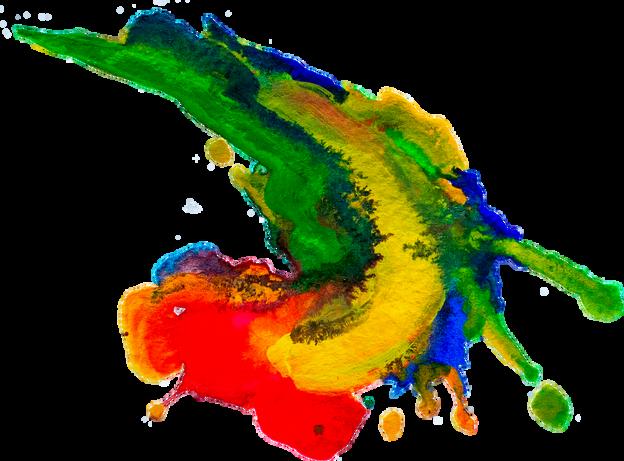
How is it assessed?
Component 1: A-Level Art and Design Coursework GCE - 60% of A-Level
Component 2: A-Level Art and Design Externally Set Assignment GCE - 40% of A-Level
Why is it a useful qualification?
Many students decide to explore more aspects within the course and progress to an art foundation course at a college or university to build on this route further and specialise in a particular aspect of Art and Design at degree level The completion of an Art degree, could lead to a range of career options in such fields as advertising, marketing, design, architecture, teaching, publishing, fashion, and the media The study of Art develops transferable skills, which can be taken into many careers or degree pathways
Specific entry requirements:
Students who are keen to study A level Art and Design should gain a minimum grade 5 for GCSE Students immerse themselves in the creative process for A level projects and a rigorous work ethic is expected and results in a very broad exploration of topics
Further Education:
Foundation Art Courses and Degree Courses
Careers:
Advertiser, animator, archaeologist, architect, artist, art educator, art therapist, book illustrator, computer software designer, fashion designer, florist, film maker, gallery administrator, interior designer, industrial designer, jeweller, landscape architect, make-up artist, medical illustrator, police artist, props/stage/theatre designer, special effects artist
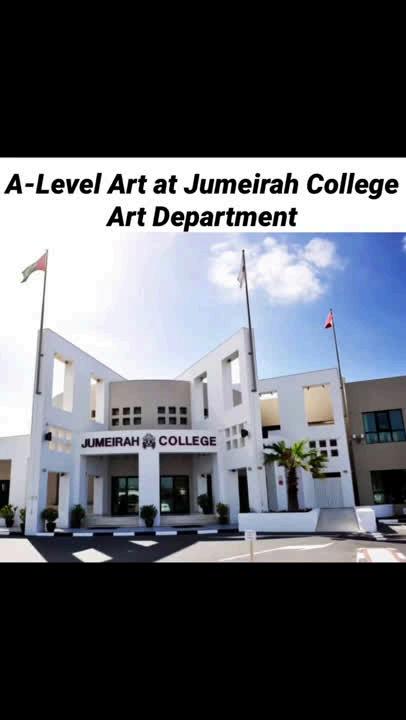
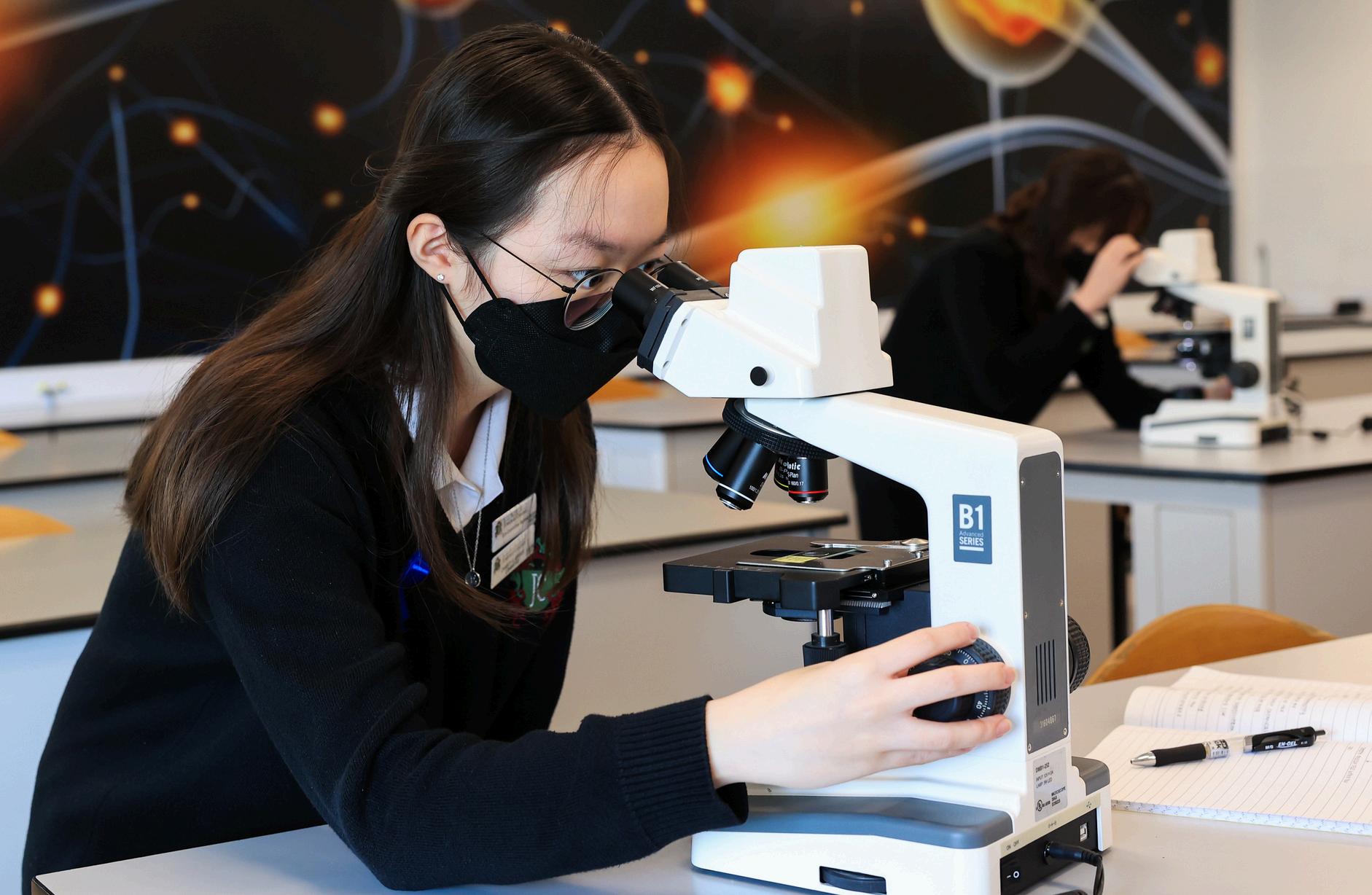
Head
of
Department: Mrs K Wing
Available Levels: AS Level and A Level
Exam Board: Edexcel
What are the aims of the course?
The aims of the A Level in Biology are to enable students to:
Develop their interest in, and enthusiasm for, Biology including developing an interest in further study and careers in the subject
Appreciate how society makes decisions about Biology-related issues and how Biology contributes to the success of the economy and society
Develop and demonstrate a deeper appreciation of the skills, knowledge and understanding of How Science Works
Develop essential knowledge and understanding of different areas of Biology and how they relate to each other
What is involved?
1 Biological Molecules: All life on Earth shares a common chemistry and this provides indirect evidence for evolution This topic allows students to study the significant biological molecules such as carbohydrates, lipids, proteins, nucleic acids and water
2 Cells: All life on Earth exists as cells and in this topic students will explore the roles of cells and their interactions. The topic focusses on the different types of cell involved in disease, recovery from disease and prevention of symptoms.
3 Organisms exchange substances with their environment: The internal environment of a cell or organism is different from its external environment, here students study the exchange of substances between the internal and external environments at exchange surfaces
4 Genetic information, variation and relationship between organisms: Biological diversity –biodiversity – is reflected in the vast number of species of organisms, in the variation of individual characteristics within a single species and in the variation of cell types within a single multicellular organism This topic explores the genetic differences between organisms
5. Energy transfers in and between organisms: Life depends on continuous transfers of energy and this topic tackles the essential ideas of photosynthesis and respiration.
6 Organisms respond to changes in their internal and external environments: This topic discusses the mammalian nervous system and how an organism responds to change in the long and short term
Entry Requirements: 7 in Biology/8 in Combined Science and a 6 in English Language B i o l o g y

7 Genetics, populations, evolution and ecosystems: The theory of evolution underpins modern Biology and that all new species arise from an existing species is investigated here with reference to common ancestry
8 The control of gene expression: Humans are learning how to control the expression of genes by altering the epigenome, and how to alter genomes and proteomes of organisms This topic explores the many medical and technological applications
How is it assessed?
To gain the full A-Level qualification students will sit 3 exams at the end of Year 2 which will be based on all work covered This is split into 3 papers
Paper 1 - Any content from topics 1–4, including relevant practical skills Paper 2 - Any content from topics 5–8, including relevant practical skills Paper 3 - Any content from topics 1–8, including relevant practical skills
All of the exams are 2 hours long and through a combined total will create the final overall grade
At the end of the first year we will offer all students the chance to sit formal external AS exams as we believe this will assist students with their University Applications, especially as many of our students opt for some of the most competitive courses at the top institutions It will also mean any student wishing to not continue into the second year will come out with a qualification in the subject
Why is it a useful qualification?
An A level qualification in Biology could prepare you to study Biology or Biological Sciences in further or higher education. You may wish to take a more vocational course leading to a career in medicine or physiotherapy, veterinary medicine, animal health, conservation, horticulture or agriculture; or it can be used as a qualification for non-science related careers such as banking and insurance
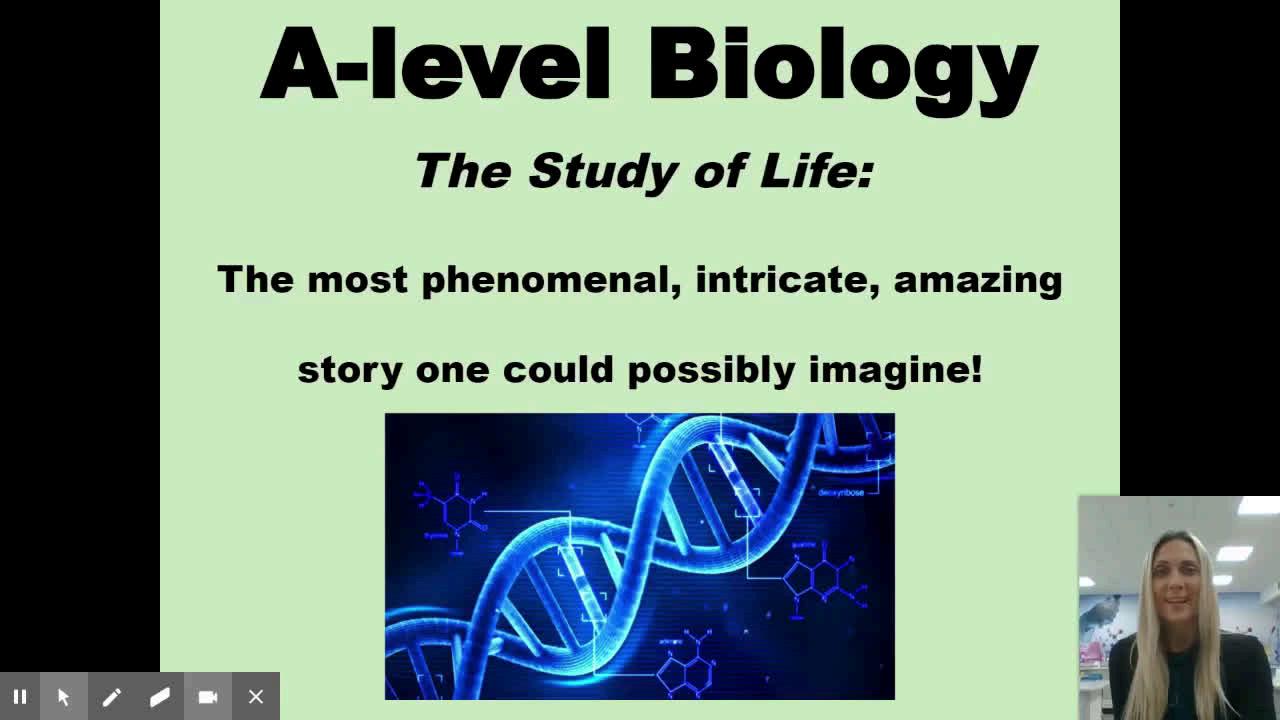
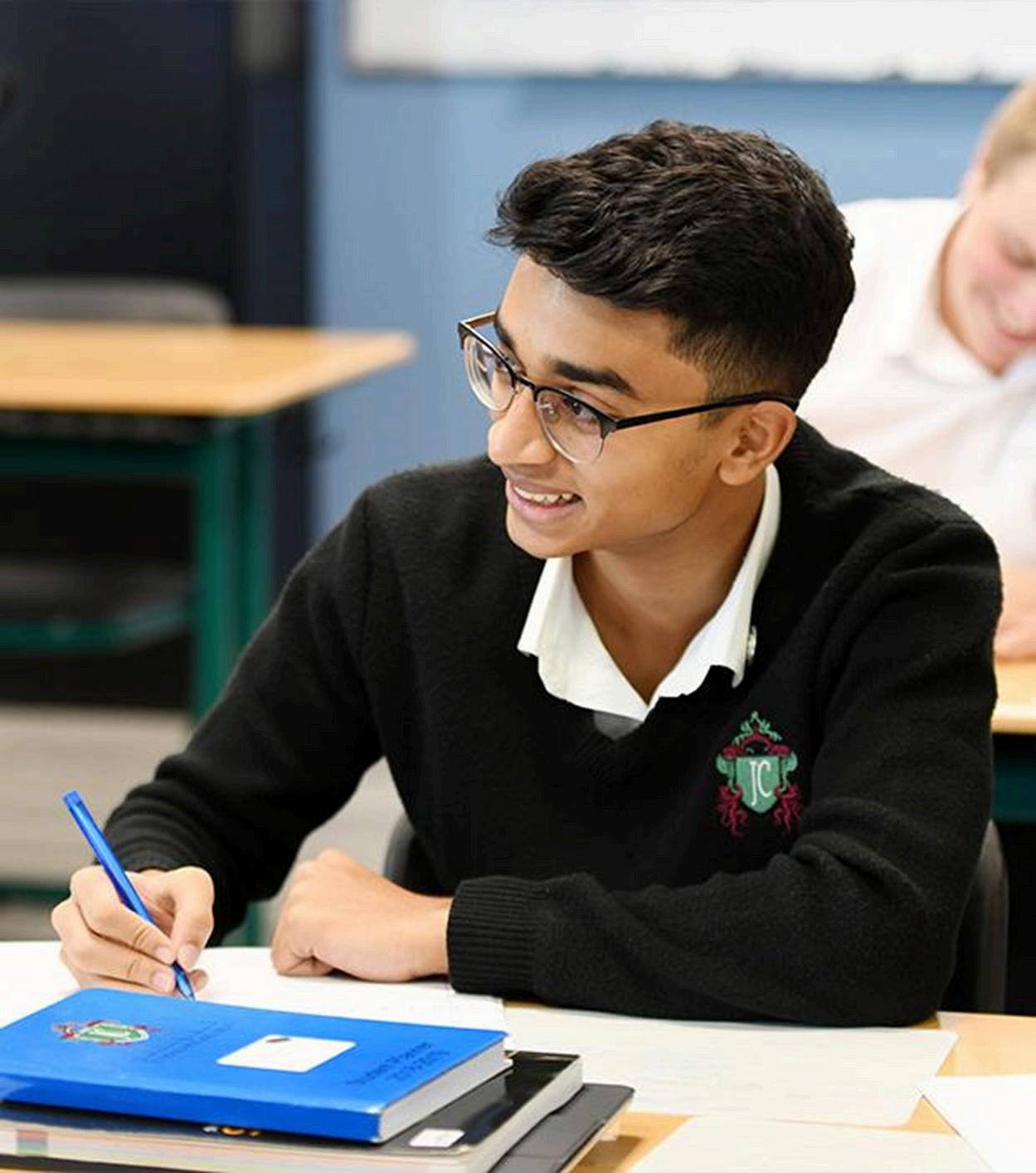
Head of Department: Mr A Kinsey
Available Levels: AS Level and A Level
Exam Board: AQA
Entry Requirements: 6 in Business Studies 6 in English, Humanities or Social Science
What are the aims of the course?
The aim of the Business Studies A Level course is to give students the skills and ability to launch their own business Students will learn how a business operates and organizes itself Students will also study how a business plans and makes decisions Ultimately the aim is for students to develop an entrepreneurial mind-set whereby they can identify business opportunities and develop plans and implement procedures to turn those ideas into a successful reality The following vital skills are also developed; how to assemble data and assess it; how to investigate facts; how to put over your point of view; and how to work as a team to achieve results
What is involved?
Students will cover the following subject content:
1 What is business?
2 Managers, leadership and decision making
3 Decision making to improve marketing performance
4 Decision making to improve operational performance
5 Decision making to improve financial performance
6 Decision making to improve human resource performance
7 Analysing the strategic position of a business
8 Choosing strategic direction
9 Strategic methods: how to pursue strategies
10 Managing strategic change
How is it assessed?
A Level Business studies is assessed by three papers Each paper is synoptic and assesses the entire content of the A level specification
Paper1: Business 1 - 33 3% of A level - Students must answer 15 multiple choice questions, some short answer questions and two essay questions
Paper2: Business 2 - 33 3% of A level - Students must answer three data response questions
Paper 3: Business 3 - 33 3% of A level - Students must review one case study and complete approximately six questions on the scenario B u s i n e s s S t u d i e s
At the end of the first year students are offered the chance to sit formal external AS exams as we believe this will assist students with their University Applications, especially as many of our students opt for some of the most competitive courses at the top institutions It will also mean any student wishing to not continue into the second year will come out with a qualification in the subject
Specific entry requirement:
Grade 6 in Business Studies
Grade 6 in English or Humanities if you have not studied Business Studies
Why is it a useful qualification?
Students with A level Business Studies have access to a wide range of possible career and higher education opportunities You learn and use a variety of transferable skills throughout the course These include the important business skills of decision making and planning You can start a career in business armed with an excellent knowledge of how businesses operate In particular, you will have a head start in careers within accountancy, marketing and human resources Business Studies combines well with a range of social science, humanities and mathematics subjects to lead to university subjects in such areas as business, economics, law and accountancy. B u s i n e s s S t u d i e s

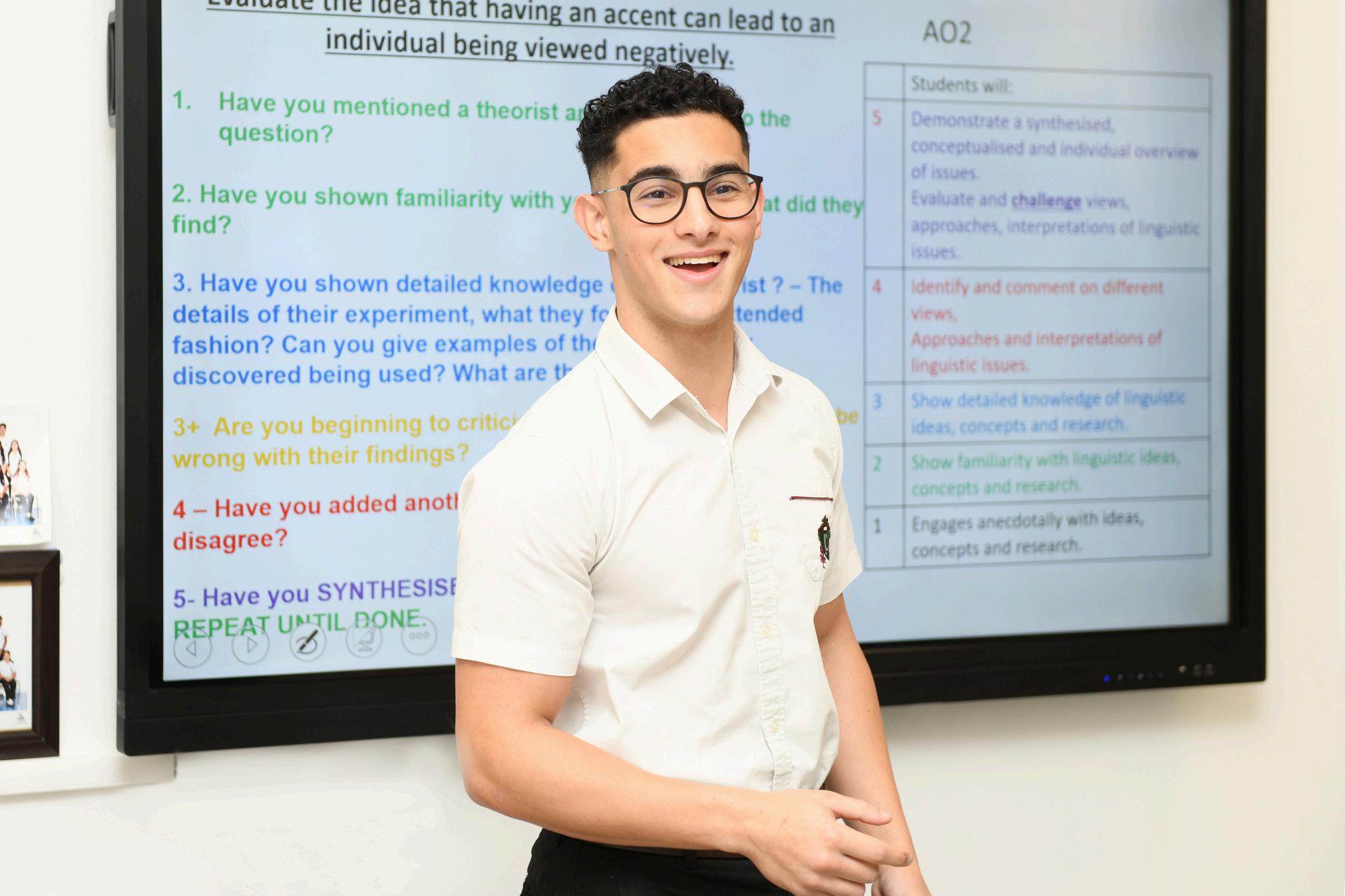
Head of Department: Mr A Kinsey
Available Levels: International Level 3
Subsidiary Diploma
What are the aims of the course and what is involved?
Exam Board: Edexcel
Entry Requirements: Sixth Form Entry Requirements
BTEC courses enable a learner-centered approach to education, with a flexible, unit-based structure and knowledge applied to project-based assessments BTECs focus on the holistic development of the practical, interpersonal and thinking skills required to be successful in employment and higher education
360 Guided Learning Hours Equivalent in size to one International A Level
At least four units* of which two are mandatory and at least one* is assessed using a Pearson Set Assignment Mandatory content (50%)
A broad basis of study for the business sector Designed to support progression to higher education when taken as part of a programme of study that includes other appropriate BTEC Intenational Level 3 qualifications or International A Levels
What do the qualifications cover?
The qualifications give learners experience of the breadth and depth of the sector that will prepare them for further study or training. This includes the opportunity for learners to choose several topics from a selection of options reflecting the progression pathways in business
The learning programme covers the following content areas:
business environments marketing finance international business management enterprise and entrepreneurship
The optional units have been designed to support progression to business courses in higher education, and to link with relevant occupational areas They cover content areas such as:
human resources accounting financial services marketing retail B T E C B u s i n e s s
How is it assessed?
Assessment is designed to fit the purpose and objective of the qualification It includes a range of assessment types and styles suited to vocational qualifications in the sector All assessment is internal but some mandatory units have extra controls on assessment and are assessed using Pearson Set Assignments Additionally, some units are synoptic Set assignment units Some mandatory units in the qualifications are assessed using a set assignment Each assessment is set by Pearson and may need to be taken under controlled conditions before it is marked by teachers Set assignment units are subject to external standards verification processes common to all BTEC units By setting an assignment for some units, we can ensure that all learners take the same assessment for a specific unit Learners are permitted to re-sit set assignment units during their programme
All units in the sector are internally assessed and subject to external standards verification
Units are assessed using a grading scale of Distinction (D), Merit (M), Pass (P) and Unclassified (U)
Why is it a useful qualification?
In the BTEC International Level 3 units, there are opportunities during the teaching and learning phase to give learners practice in developing employability skills Where we refer to employability skills in this specification, we are generally referring to skills in the following three main categories:
cognitive and problem-solving skills – using critical thinking, approaching non-routine problems, applying expert and creative solutions, using systems and technology interpersonal skills – communicating, working collaboratively, negotiating and influencing, self- presentation intrapersonal skills – self-management, adaptability and resilience, self-monitoring and development.
There are also specific requirements in some units for assessment of these skills where relevant, for example where learners are required to undertake real or simulated activities
How do the qualifications provide transferable knowledge and skills for higher education?
All BTEC International Level 3 qualifications provide transferable knowledge and skills that prepare learners for progression to university The transferable skills that universities value include:
the ability to learn independently the ability to research actively and methodically the ability to give presentations and be active group members B T E C B u s i n e s s
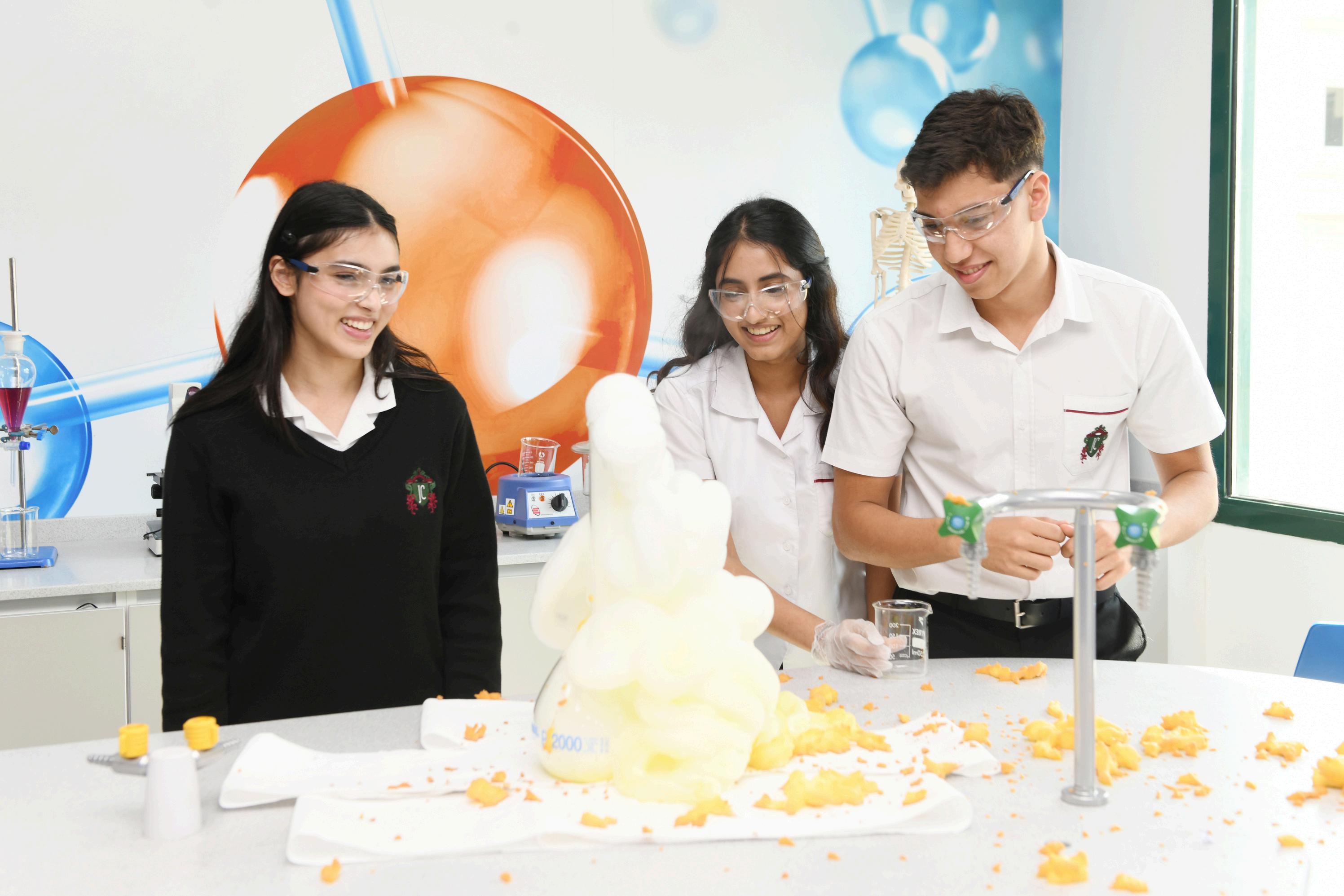
Head of Department: Mr A Khan
Available Levels: AS Level and A Level
Exam Board: AQA
Entry Requirements: 7 in Chemistry/8 in Combined Science and a 6 in Mathematics
What are the aims of the course?
The study of A level Chemistry should be a practical experience for students This course contains practical activities embedded within each unit aims to reflect the nature of Chemistry This will increase students’ enjoyment and understanding, together with providing them with the skills needed to study science at higher levels
The course enables contemporary Chemistry contexts to be included in the teaching and learning programme Students will study aspects of Chemistry that are often in the media and affect their lives It is important that students have the necessary knowledge and understanding to explain many different aspects of physical, inorganic and organic Chemistry
What is involved?
Physical Chemistry:
During Year 1 of the course students will study a range of Physical Chemistry topics which build on the basic knowledge acquired from GCSE The areas covered include a deeper look at Bonding which is fundamental to understanding all aspects of Chemistry We also find out that the atom is a little more complex due to the existence of Atomic Orbitals We then move onto the study of Thermodynamics looking at the familiar areas of reaction kinetics and energetics followed by new ideas involving equilibria and redox reactions
During Year 2 of the course Thermodynamics returns once again looking at chemical reactions in terms of speed, feasibility and equilibria We also look at the Chemistry favourite, which is of course Acid/Base chemistry
Inorganic Chemistry:
One of the greatest puzzles ever solved is the periodic table and during Year 1 studies we will look at the increasing complexities of the patterns which run throughout This will give all students a much greater appreciation of the importance of electrons in driving the chemistry around us
For most of your chemistry studies so far we have largely ignored the group of metals known as the transition metals During Year 2 of the course this changes when we explore why they can exist in many oxidation states which then gives rise to the very many wonderfully coloured solutions C h e m i s t r y
Organic Chemistry:
Introduced at GCSE, Organic Chemistry is the study of carbon based structures which surround our every day lives We will once again begin with structures familiar to us in the form of Alkanes and Alkenes However with the introduction of Haloalkanes, Aldehydes, Ketones and Organic Analysis you’ll soon obtain a much deeper insight into the materials around us
In Year 2 we study further organic family members such as Amines, Benzene and Amino Acids which leads to the beginnings of Bio-Chemistry and the study of DNA and protein structures.
Practical Endorsement:
Running across the two years will be a series of practical tasks which students must complete in order to gain accreditation along with their A-Level qualification This is a feature encouraged by the leading Universities in the UK and one which will be embedded into our course structure
How is it assessed?
To gain the full A-Level qualification students will sit 3 exams at the end of Year 2 which will be based on all work covered. This is split into 3 papers:
Paper 1 - Inorganic with Relevant Physical Paper 2 - Organic with Relevant Physical Paper 3 - Practical Skills plus all content
All of the exams are 2 hours long and combined will create the final overall grade
At the end of the first year we will offer all students the chance to sit formal external AS exams as we believe this will assist students with their University Applications, especially as many of our students opt for some of the most competitive courses at the top institutions It will also mean any student wishing to not continue into the second year will come out with a qualification in the subject
Why is it a useful qualification?
Chemistry A level is one of the most demanding A-Level subjects and requires a high level of determination It is a pre-requisite for many degree courses and careers, such as medicine, dentistry, veterinary science and pharmacology It is also an advantage in a wide range of areas from accountancy to journalism.
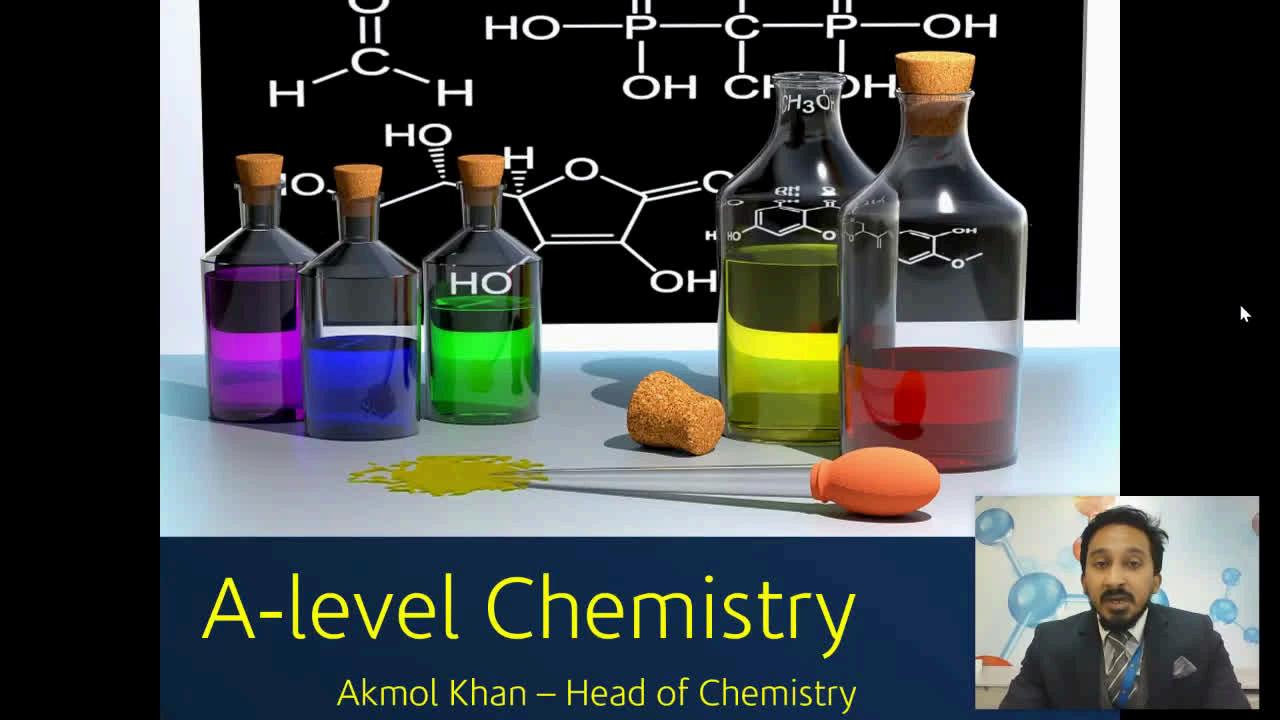

Head of Department: Mr G Dela Cruz
Available Levels: A Level (9618)
Exam Board: Cambridge
Entry Requirements: 7 in Computer Science
Aims and Learning Outcomes:
Computer Science is an inherently practical subject that allows students to apply the theoretical concepts acquired in the classroom to real-world systems It embodies creativity and innovation, enabling individuals to view the natural world through a digital lens At its core, Computer Science nurtures the art of computational thinking, equipping students with the critical thinking skills necessary to solve complex problems, design intricate systems, and comprehend the capabilities and boundaries of human and machine intelligence
In choosing the best educational path for Jumeirah College students, we have thoroughly assessed the competition and firmly believe that the Cambridge specification stands as the optimal choice This curriculum not only imparts a deeper understanding of computational principles but also offers a broader spectrum of mathematical content compared to alternative specifications It mirrors the academic rigor and content alignment typically encountered in a university-level Computer Science course, thereby allowing candidates to demonstrate high-level skills actively sought after by university programs
Assessment Overview:
AS Level Paper 1 Theory Fundamentals: 1 hour 30 minutes (75 marks)
25% of the A-Level
Information Representation
Communication
Hardware
Processor Fundamentals
System Software
Security, Privacy, and Data Integrity
Ethics and Ownership
Databases
AS Level Paper 2 Fundamental Problem-Solving: 2 hours (75 marks) 25% of the A-Level
Algorithm Design and Problem-solving
Data Types and Structures
Programming
Software Development C o m p u t e r S c i e n c e

A-Level Paper 3 Advance Theory: 1 hour and 30 minutes (75 marks)
25% of the A-Level
Data Representation
Communication and Internet
Hardware and Virtual Machines
System Software
Security
Artificial Intelligence (AI)
Paper 4 Practical: 2 hours and 30 minutes (75 marks)
25% of the A-Level
Computational Thinking and Problem-solving
Further Programming
Why is it a useful qualification?
Cambridge 9618 Computer Science serves as a solid foundation for future academic pursuits in Computer Science or related fields at the higher education level It is equally well-suited for students with aspirations for careers or further studies in Computer Science or ICT, or as a part of a comprehensive general education curriculum This program opens doors to a world of possibilities and empowers students to navigate the ever-evolving digital landscape with confidence and competence

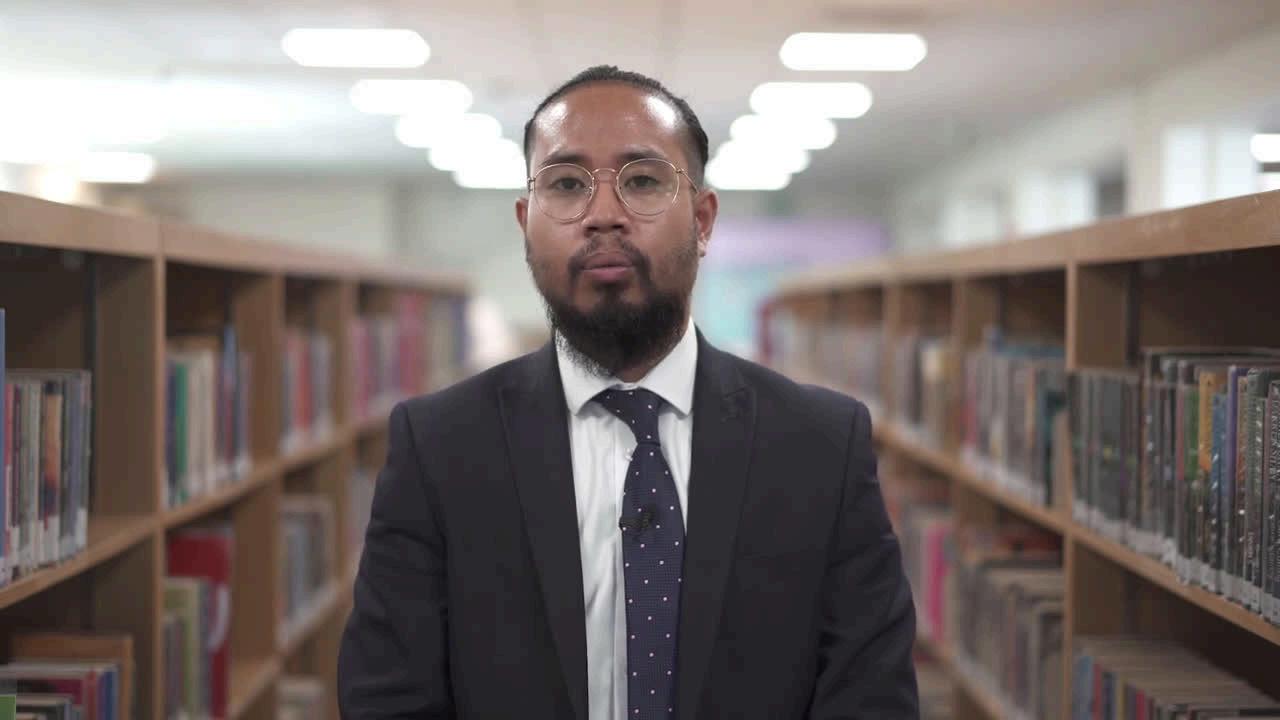
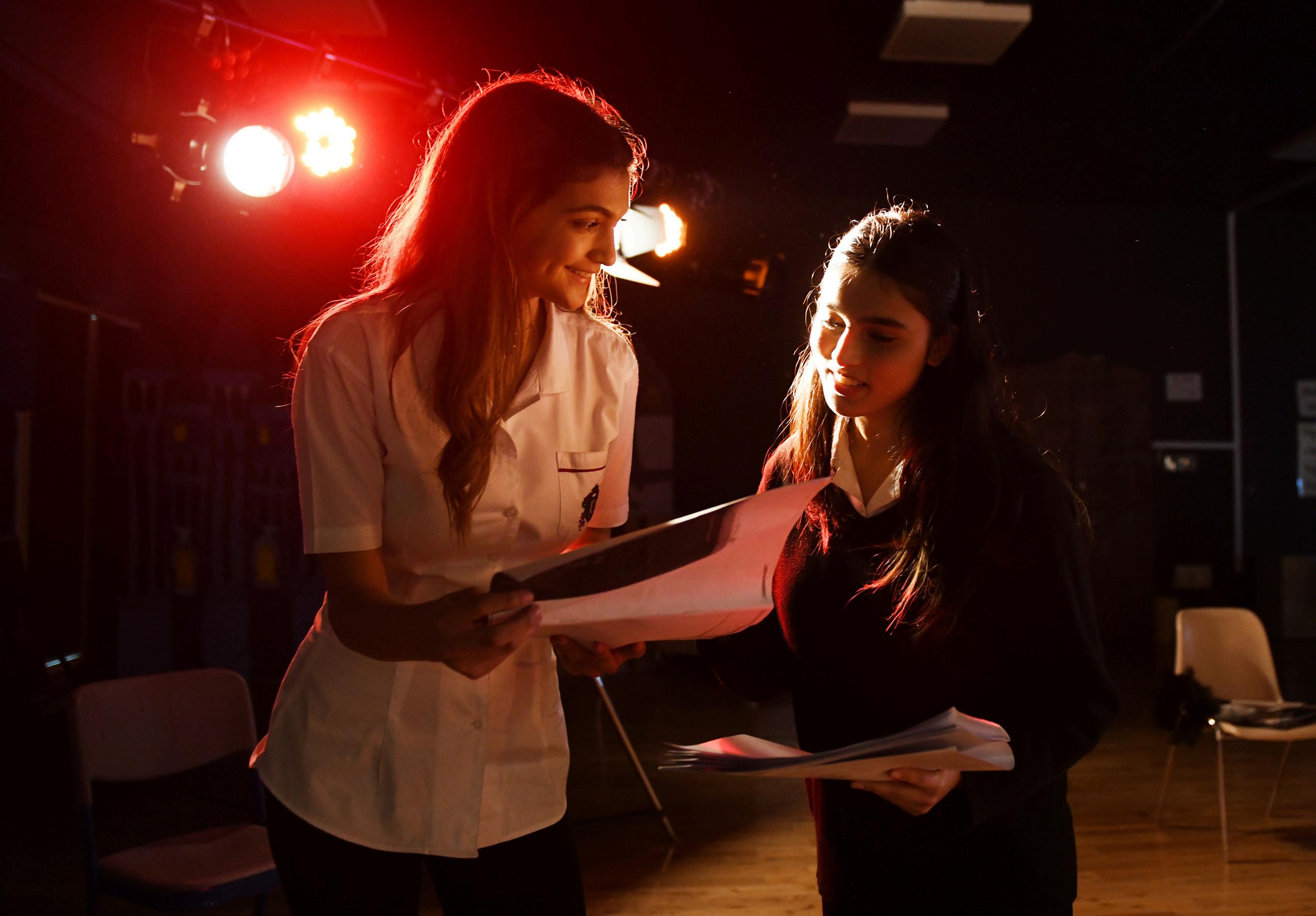
Head of Department: Mr R Burke
Available Levels: A Level
Exam Board: Edexcel
Entry Requirements: 6 in Drama Meeting with HOD
What are the aims of the course?
The Drama and Theatre Studies course provides the opportunity to study a range of play texts, theatrical practitioners and dramatic theory from the perspective of director, designer, performer and critic The course provides you with the knowledge and understanding of the language of drama and theatre, enabling you to use this to inform and develop your performance skills, as well as become an expert in analysing, questioning and justifying both your own ideas and those of others
What is involved?
The course demands practical, creative and analytical skills in equal measure You will extend your ability to work with scripted drama and theatre for performance You will also be required to write in detail about your drama; developing your ability to justify your practical exploration in structured coursework notes The course will involve devising theatre as well as directing yourself in either a monologue or a duologue, as well as studying practitioners, plays and playwrights in detail
How is it assessed?
Unit 1: Devising (40% of the qualification)
Content summary:
Devise an original performance piece
Use one key extract from a performance text and a theatre practitioner as stimuli Performer or designer routes available
Assessment:
Internally assessed and externally moderated. There are two parts to the assessment: a portfolio (60 marks) the devised performance/design realisation (20 marks) D r a m a & T h e a t r e S t u d i e s
Unit2:TheatreTextinPerformance(20%ofthequalification)
Contentsummary:
Thisunitoffersyouthechancetodemonstrateskillsinaperformanceenvironment The knowledgeandunderstandinggainedduringthestudyoftwoplaysinUnit1cannowbe appliedwithaviewtodeliveringaperformancetoanaudience.
Assessmentoverview:
Thisisanexternallyassessedunit.Thefirstsectionrequiresyoutooffereitheramonologue orduologue Thesecondsectionrequiresyoutocontributetoaperformanceofa professionallypublishedplaybyaknownwriter Youmayoffereitheractingoradesign formandmustalsoprovideaconceptoftheinterpretationoftheirchosenrolesordesigns
Unit3:TheatreMakersinPractice(40%ofthequalification)
Contentsummary:
Livetheatreevaluation–choiceofperformance
Practicalexplorationandstudyofacompletetext–focusingonhowthiscanbe realisedforperformance
Practicalexplorationandinterpretationofanothercompleteperformancetext,inlight ofachosenpractitioner–focusingonhowthistextcouldbereimaginedfora contemporaryaudience
Assessmentoverview:
SectionA:LiveTheatreEvaluation(20marks)
SectionB:PagetoStage:RealisingaPerformanceText(36marks)
Studentsanswertwoextendedresponsequestionsbasedonanunseenextractfrom theperformancetexttheyhavestudied
Studentswilldemonstratehowthey,astheatremakers,intendtorealisetheextract inperformance
Studentsanswerfromtheperspectiveofaperformerandadesigner Performancetextsforthissectionarenotallowedintheexaminationasthe extractswillbeprovided
SectionC:InterpretingaPerformanceText(24marks)
Studentswillansweroneextendedresponsequestionfromachoiceoftwousing theirchosentext
Studentswilldemonstratehowtheirre-imaginedproductionconceptwill communicateideastoacontemporaryaudience
Studentswillalsoneedtooutlinehowtheworkoftheirchosentheatrepractitioner hasinfluencedtheiroverallproductionconceptanddemonstrateanawarenessof theperformancetextinitsoriginalperformanceconditions D r a m a & T h e a t r e S t u d i e s
If you are considering a career in the performing arts industries, studying drama at this level will provide you with an excellent level of experience in performance skills However, the Edexcel Drama and Theatre Studies qualification will give you a firm grounding in far more than just acting The high level of analytical theory and the detailed studying of practitioners, text and performance will put you in the informed position of the director; expressing your opinions and justifying your ideas
Successful Drama students go on to read subjects such as Law, English, History, Journalism, Business Studies and Psychology at university A wide range of careers from teaching to management, business to politics all rely on the core elements of presentation, leadership, creativity and decision making that are intrinsic to the Drama and Theatre Studies course
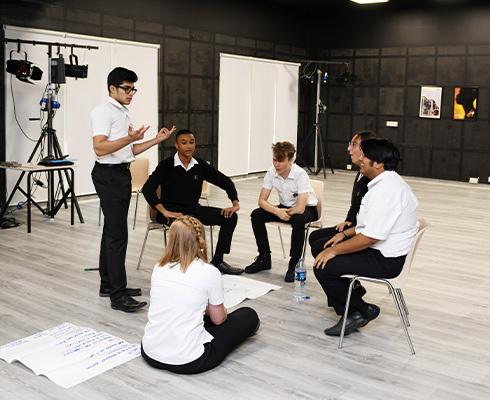

D r a m a & T h e a t r e S t u d i e s
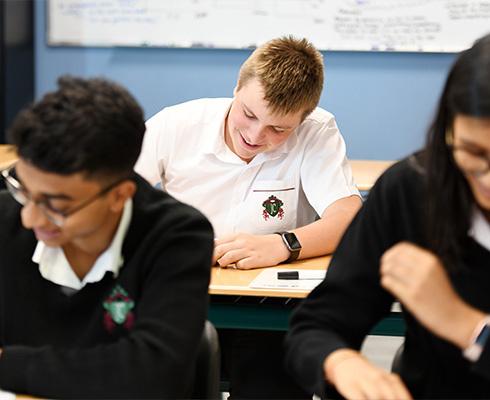
Head of Department: Mr A Kinsey
Available Levels: A Level 7136, AS Level
Exam Board: AQA
Entry Requirements: 7 in Economics 6 in English, History or Psychology
What are the aims of the course?
A level Economics aims to impart an appreciation of the significance of economics in interpreting current affairs Students will be able to use both macro and micro economic analysis to explain the concept of a market, how they work, why they fail and how governments can augment and correct their operation Students will be able to explain recent developments in both the UK and the global economy By studying A level economics, students will be able to engage in on-going debate over some of the most controversial issues faced by society such as poverty, taxation and unemployment At the very least it is hoped that students will develop a passion for economics which will help influence important decisions later in life
It is not necessary for candidates to have studied GCSE Economics before undertaking this course and no prior knowledge of Economics is required. Students who are well motivated with a logical approach to their learning will be successful. However, for students who have not taken GCSE Economics, a minimum of a B or grade 6 in GCSE Business Studies (or a similar subject) is required in order to complete the quantitative elements within the course.
What is involved?
Students taking A level Economics will learn by firstly developing an understanding of economic theory Students will learn to appreciate that there are a number of different interpretations which can explain Economic phenomena Students will learn how to apply Economic theory to case study scenarios It is important for students taking A level Economics to keep up to date with current affairs and students will need to regularly read a quality newspaper
Specific entry requirements:
A Grade 7 in GCSE Economics is required to study A Level Economics If you have not studied GSCE Economics; you will need a 6 in English, History or Psychology
At the end of the first year we will offer all students the chance to sit formal external AS exams as we believe this will assist students with their University Applications, especially as many of our students opt for some of the most competitive courses at the top institutions It will also mean any student wishing to not continue into the second year will come out with a qualification in the subject

How is it assessed?
Paper 1 Markets & Market Failure - 33 3% of A level
Students must complete one data response question and one essay question
Paper 2 National & International Economy - 33 3% of A level
Students must complete one data response question and one essay question
Paper 3 Economic Principles and Issues - 33 3% of A level
Students must complete a series of multiple choice questions and questions based on a case study scenario
Why is it a useful qualification?
Completing A Level Economics provides students with an appropriate foundation for further study in Economics or related studies The course provides a launch pad for careers in commerce related fields such as banking and finance The course will promote the important skills of decision making and problem solving
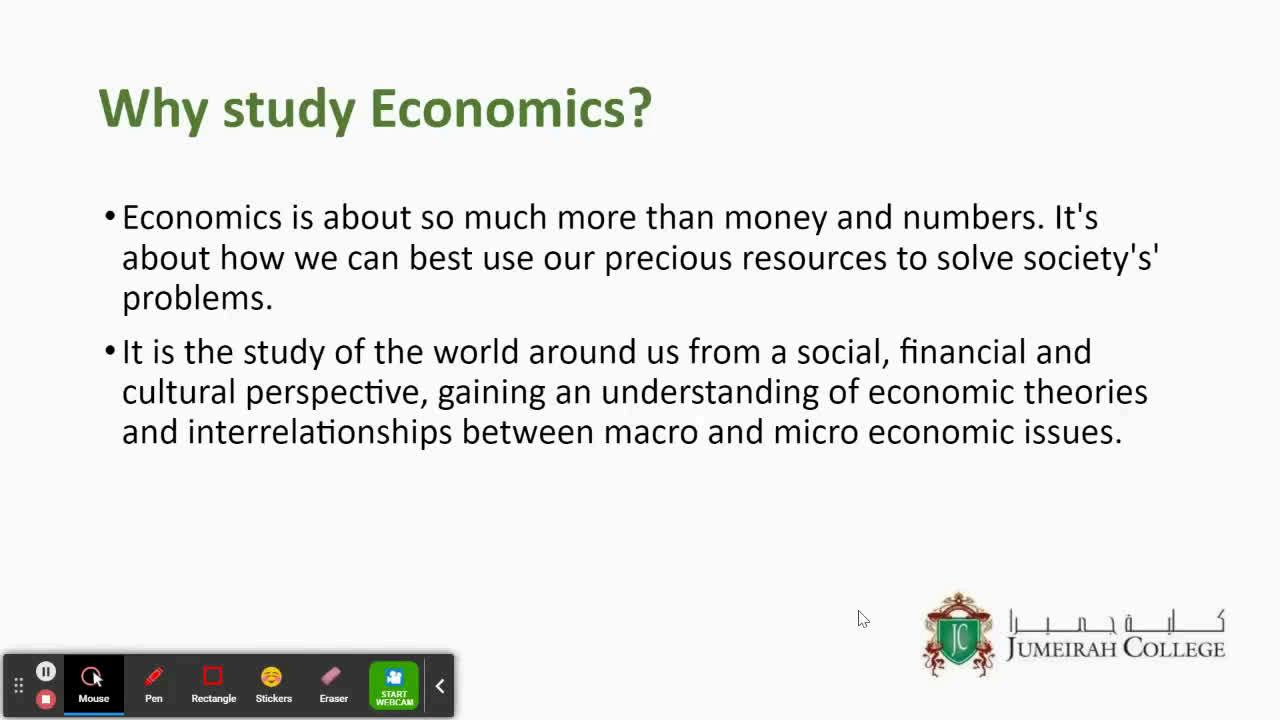
Head of Department: Miss K Trotman
Available Levels: A Level 7702
Exam Board: AQA
Entry Requirements: 6 in English Language
What are the aims of the course?
Students are given the opportunity to: develop their subject expertise by engaging creatively and critically with a wide range of texts and discourses create texts and reflect critically on their own processes of production, while analysing the texts produced by others explore the study of English language both as a medium of communication and as a topic in its own right, with an emphasis on the ability of students to pursue lines of enquiry, debate different views, and work independently to research aspects of language in action see language as a creative tool for expression and social connection, as well as for individual cognition
What is involved?
Students are introduced to the study of English in its various forms and contexts, with the concepts and methods appropriate for the analysis of language underpinning all elements of the course They are offered clear skills progression from GCSE, allowing students to build on the skills already gained and prepare for their next steps Students are offered a variety of assessment styles used, such as data analysis, discursive essays, directed writing, original writing and research-based investigative writing, allowing them to develop a wide range of skills
How is it assessed?
Paper 1: Language, the individual and society - Exam
Textual variations and representations
Children's language development (0–11 years)
Methods of language analysis
Paper 2: Language diversity and change - Exam
Language diversity and change
Language discourses
Writing skills E n g l i s h L a n g u a g e
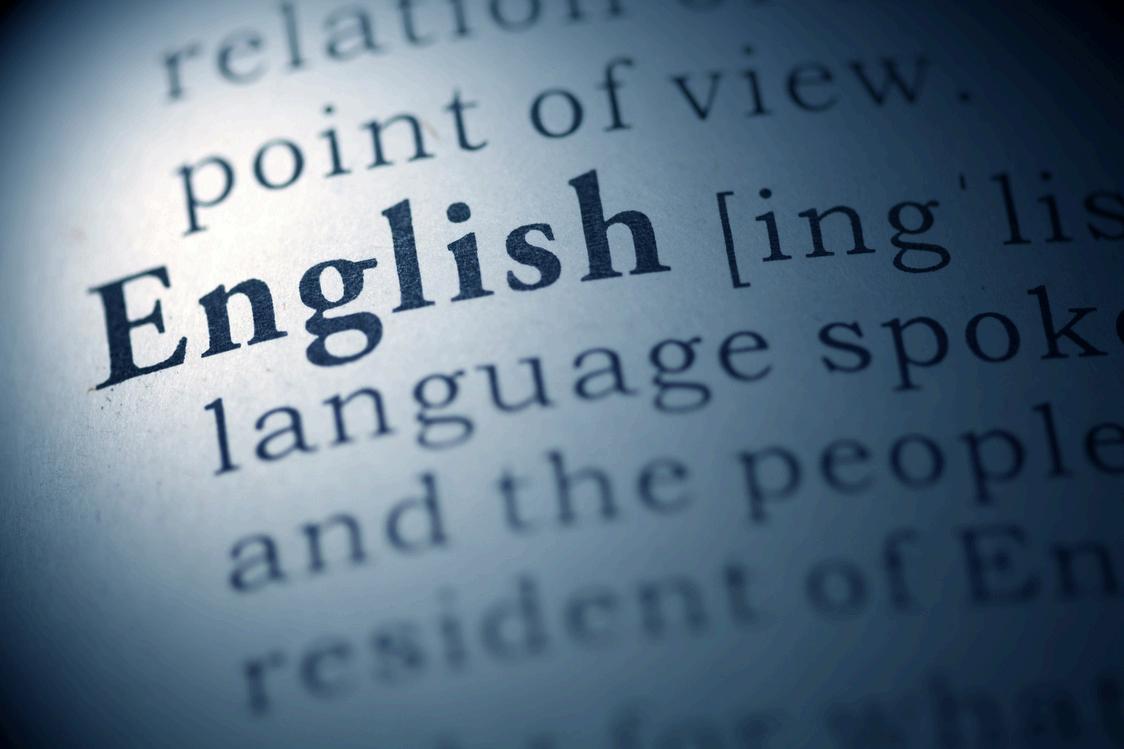
Coursework: Language in action
Language investigation
Original writing
Students produce:
a language investigation (2,000 words excluding data)
a piece of original writing and commentary (1,500 words total)
Specific entry requirement:
Grade 6 in English Language
Why is it a useful qualification?
A level English Language is an extremely useful and academic qualification, both for further study in Language or Linguistics and also as a general qualification for other career paths It combines both creativity and analysis and will provide students with the real world skills needed to succeed after school.
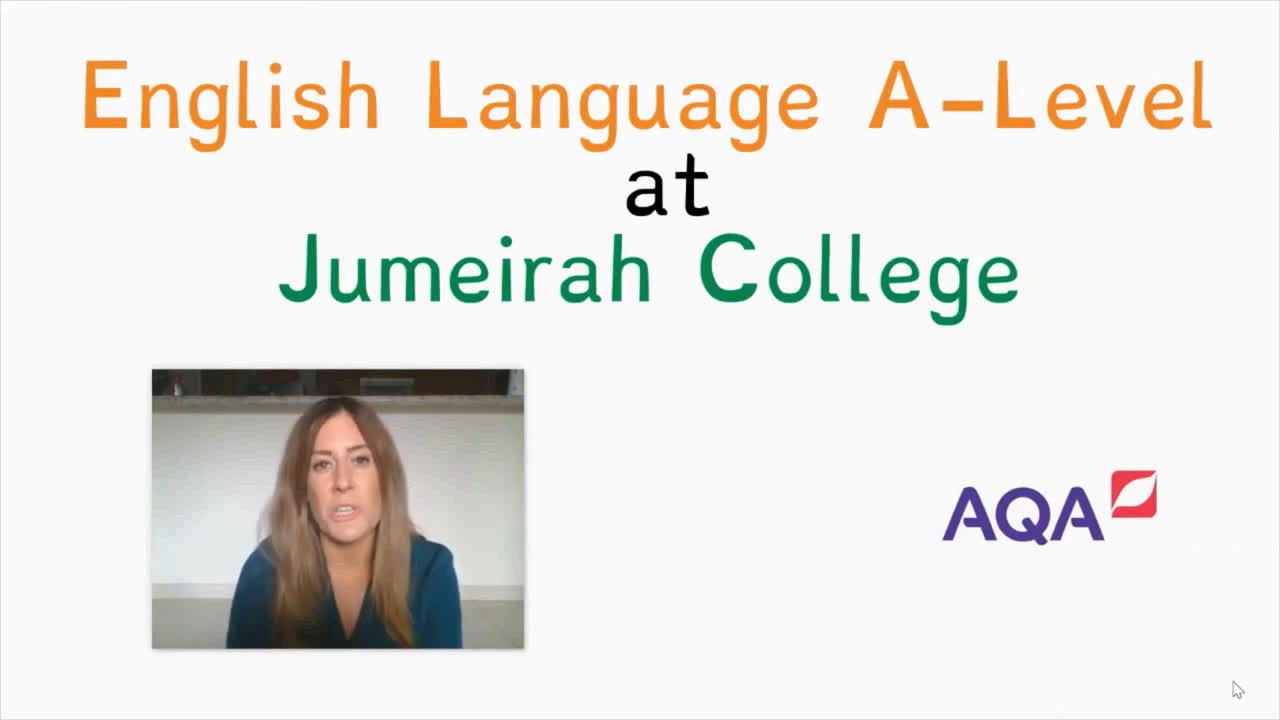
E n g l i s h L a n g u a g e
Head of Department: Miss K Trotman
Available Levels: A Level 7712
Exam Board: AQA
Entry Requirements: 6 in English Literature
What are the aims of the course?
This Advanced GCE specification requires students to:
Explore the relationships that exist between texts and the contexts within which they are written, received and understood
Study texts within a shared context to investigate and connect them, drawing out patterns of similarity and difference using a variety of reading strategies and perspectives
Make their own autonomous meaning, to debate and challenge the interpretations of other readers as they develop their own informed personal responses
The specification encourages the exploration of texts in a number of different ways:
The study of a literary theme over time
The study of literature through engaging with two of the main historicist perspectives, the diachronic (reading texts written across widely different time periods that explore the same theme) and synchronic (reading texts written within a narrower and clearly defined time period)
The study of various texts, both singly and comparatively, chosen from a list of core set texts and a list of chosen comparative set texts
What is involved?
Students with A Level English Literature will acquire skills of inquiry, debate, evaluation, interrogation of sources, hypothesis, reading for meaning, inference and deduction that are vital to many career paths, but may lead to fields such as journalism, marketing, researching, writing, public relations and theatre
This course requires a high level of commitment to sustained reading and active participation on the part of the student It is expected that students will have successfully completed GCSE English Literature to at least a grade 6 and have an interest in, an aptitude for, and a willingness to read and study literature E n g l i s h L i t e r a t u r

How is it assessed?
Unit 1: Love Through the Ages Exam
Study of three texts: one poetry and one prose text, of which one must be written pre1900, and one Shakespeare play
Examination will include two unseen poems
Unit 2: Texts in Shared Contexts The World Since 1945 Exam
Study of three texts: one prose, one poetry, and one drama, of which one must be written post-2000
Examination will include an unseen extract
Unit 3: Independent critical study: Texts across time Coursework
Comparative critical study of two texts, at least one of which must have been written pre- 1900
One extended essay (2500 words) and a bibliography
Why is it a useful qualification?
A level English Literature is an extremely useful qualification both for further study in Literature and also as a general qualification for other career paths A recent poll of employers within fortune 500 companies suggests employers increasing look to arts and humanities subjects such as English, History and Philosophy when recruiting as these disciplines teach students how to clarify assertions, think clearly and creatively and to apply precedence and empathy to the solving of problems E n g l i s h L i t e r a t u r e

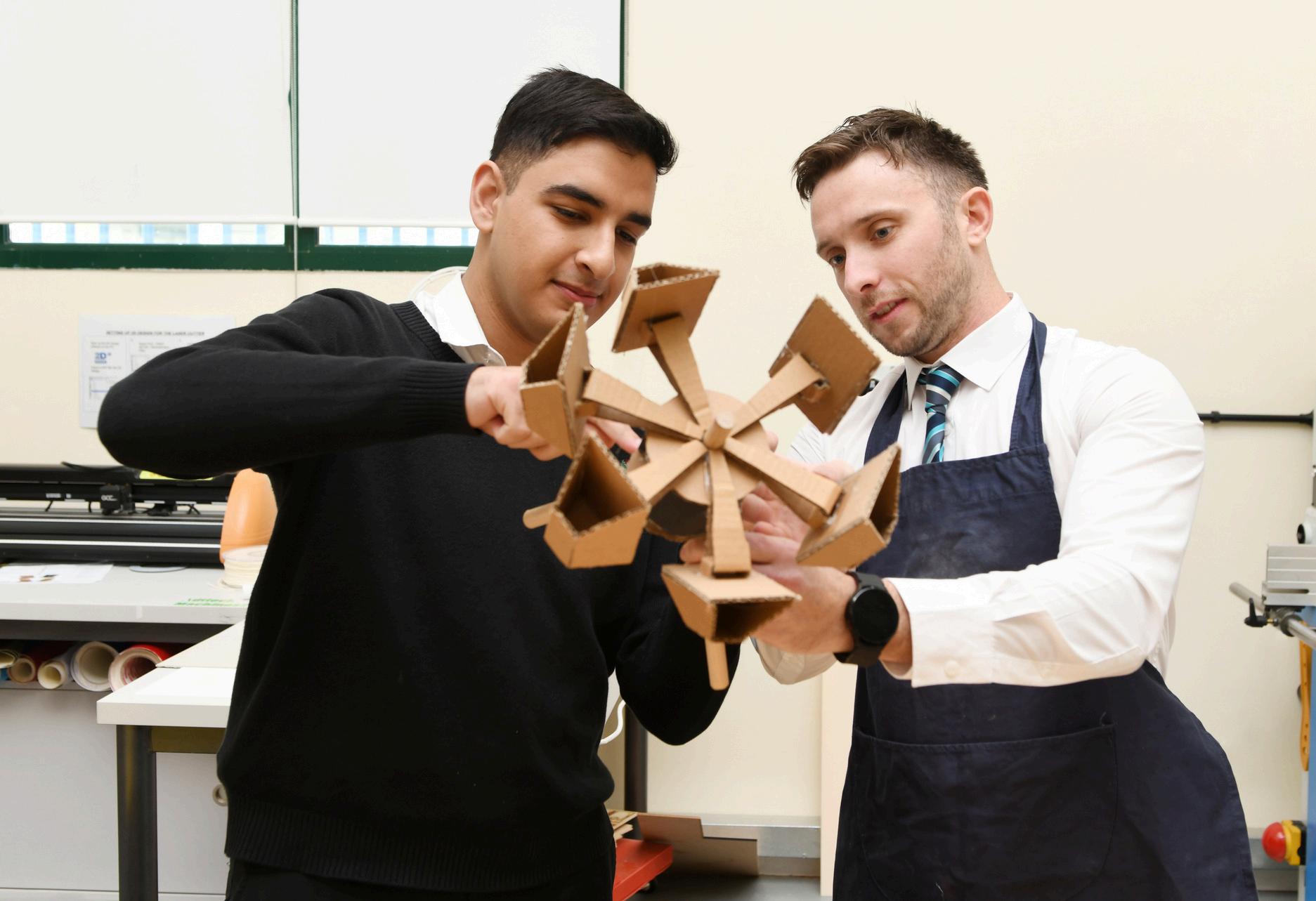
Head of Department: Ms F Temple-Smith
Available Levels: A Level, AS Level
Exam Board: AQA
Entry Requirements: 6 in French or Native Speaker
What are the aims of the course?
The aim of the French A-level course is to enhance students’ linguistic skills and promote and develop their capacity for critical and analytical thinking The A-level builds on the knowledge, understanding and skills gained at GCSE Students develop knowledge about matters central to the society and culture, past and present in countries where French is spoken In addition, students will develop language learning skills and strategies, including communication strategies and written skills to be able to sustain communication and build fluency and confidence for both practical and intellectual purposes
In the first year, aspects of the social life and trends in French speaking societies are studied to include the changing nature of the family, the cyber society and the role of voluntary work The second theme covers the artistic life of French-speaking countries such as contemporary francophone music, the cinema and cultural heritage. In the second year, there is an emphasis on current social issues and political life including the benefits of a multicultural society, the treatment of criminals, and political action. Aspects of French speaking society and culture will be further enhanced by the study of a film and a book. Students will carry out an independent research project on an area of their choice
Specific entry requirements:
Grade 6 in French or Native Speaker
We recommend that students complete the full A2 course However, The AS course is fully co- teachable with the first year of the A-level course and there will be an opportunity for students to take AS French as a stand-alone qualification at the end of Year 12
Why is it a useful qualification?
The French A-level equips students with transferable skills such as autonomy, resourcefulness, creativity, linguistic competence and enhanced cultural understanding Almost all universities internationally offer degrees in French or a combination of French and other languages or other complimentary subjects such as International Relations or Law
An ability to speak French is an advantage in the international job market in a wide range of fields including the Foreign office, International organisations, business and tourism More than 200 million people speak French in the world

How is it assessed?
AS Assessment structure (standalone qualification)
AS Paper 1: Listening, Reading & Writing Examination: 1 hour 45 minutes - 40% of AS
AS Paper 2: Writing Examination: 1 hour 15 minutes - 30% of AS
AS Paper 3: Speaking Examination: 12-14 minutes - 30% of AS
A Level Assessment structure
A - Level Paper 1: Listening, Reading & Writing Examination: 2 hours 30 minutes - 40% of A –level
A - Level Paper 2: Writing Examination: 2 hours - 30% of A– level
A - Level Paper 3: Speaking Examination: 21-23 minutes - 30% of A-level
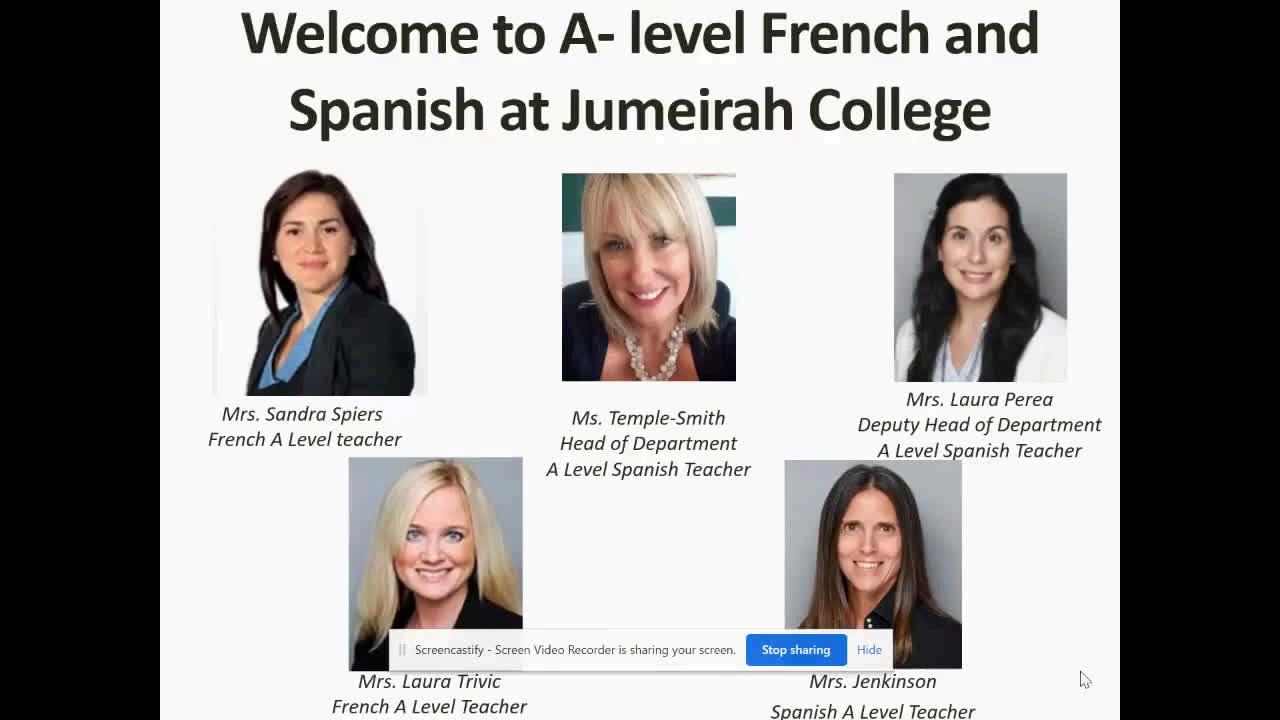
Head of Department: Mr P Tank
Available Levels: A Level 9MA0
Exam Board: Edexcel
Entry Requirements: 8 in Mathematics
Students who have gained grade 8/9 at GCSE Mathematics and completed the GCSE Further Mathematics course during Year 11 are encouraged to consider taking both Mathematics and Further Mathematics courses for A level
Further Mathematics is a separate A level which can be particularly useful to students who wish to study mathematically based courses at higher education
Students wishing to take A level Further Mathematics must do so alongside A level Mathematics, thereby using two option blocks
What is involved?
The course is comprised of 4 modules, 2 of which are in Core Pure Mathematics covering topics such as proof, complex numbers, matrices, further algebra and functions, further calculus, further vectors, polar coordinates, hyperbolic functions and differential equations
The remaining half is comprised of 2 other optional modules including Further Pure Mathematics 1 and 2, Further Statistics 1 and 2, Further Mechanics 1 and 2 and Decision Mathematics 1 and 2 A selection of combinations will be offered to cater for the cohort
Specific entry requirement:
Grade 8 in GCSE Mathematics
How is it assessed?
Students will sit 4 written examinations at the end of their second year of study, each of which are equally weighted, 1 5 hours long, calculator allowed and scored out of 75
PAPER 1: Further Pure Mathematics 1 9FM0/01
PAPER 2: Further Pure Mathematics 2 9FM0/02
PAPERS 3 and 4: 2 offered options 9FM0/3A-D and 4A-G F u r t h e r M a t h e m a t i c s
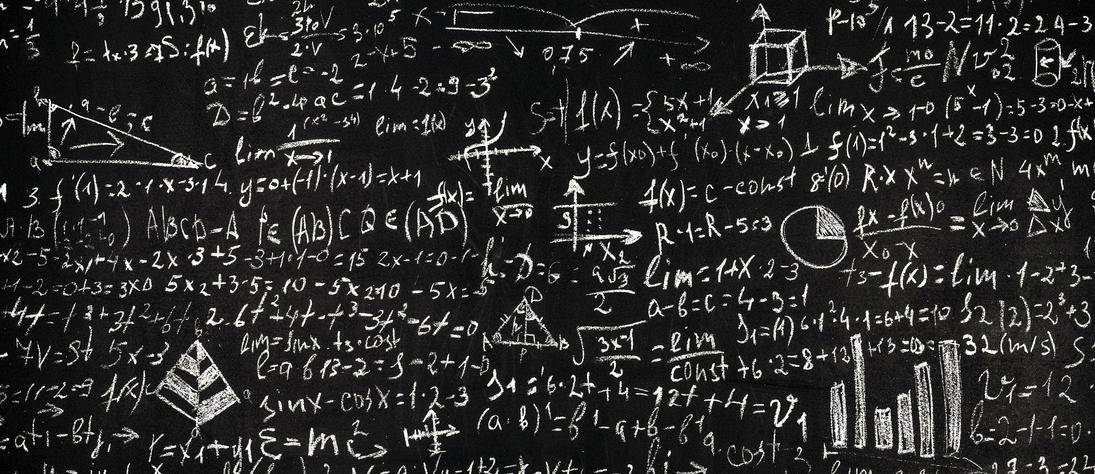
Apart from leading to Mathematics as a subject in its own right at degree level, which is much in demand by employers, Advanced GCE Mathematics is required by degree subjects as diverse as architecture and medicine By including the applications units of Mechanics, Decision and Statistics the course is able to provide a knowledge base of mathematical concepts and techniques for pupils wishing to read an engineering discipline, or those going on to some form of business, management or research based course respectively Even if it is not used formally at higher education, the analytical and logical thinking processes and independent learning skills that will have been developed will be of great benefit in this informational and technologically fast paced world
Many of the leading universities also specify that students should have studied Further Mathematics to at least some degree, in order to study a mathematics related course Therefore, students should research the requirements for their preferred universities early to ensure entry requirements are met F u r t h e r M a t h e m a t i c s
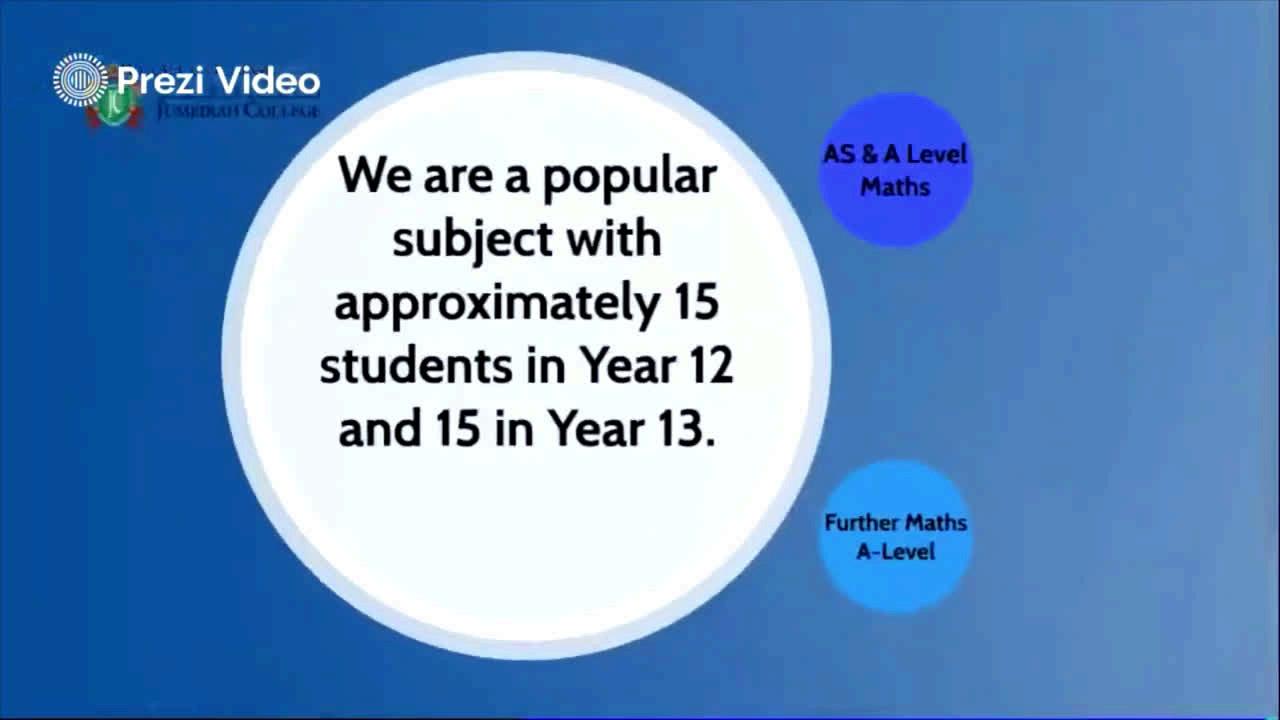
Head of Department: Ms S Pountain
Available Levels: A Level
Exam Board: AQA
Entry Requirements: 6 in Geography 6 in English and Mathematics
Introduction to the course:
The new AQA A-Level specification is available for teaching from 2016 and will be first examined in 2018 It is important to note that this course is linear and will be assessed at the end of year 13 There will be no modular exams (AS exams) in year 12
What are the aims of the course?
The GCE Geography AQA course aims to excite students minds, challenge perceptions and stimulate investigation and analytical skills The course aims to be flexible and familiarbuilding on the skills and knowledge students have acquired from IGCSE, enjoyable and rewarding, relevant and topical and to prepare students for higher education and employment
The course has a strong foundation for understanding two main themes: human geography and physical geography Human geography deals with how people and the environment interact and the way we exist It also looks at how people and groups move and live in the world around us. Students will have the opportunity to discuss current global and local issues whilst exploring the topics such as global systems and global governance, changing places and population and the environment
Physical geography, on the other hand, is all about the scientific aspects of our world, with an emphasis on how we can manage them Students will have opportunity to explore topics such as water and carbon cycles, hazards and coastal systems and landscapes
What is involved?
Develop knowledge of locations, places, processes and environments
Recognise and be able to analyse the complexity of people and environmental interactions
Develop understanding of place, space, scale and environment
Improve understanding of the ways in which values, attitudes and circumstances impact on the relationships between people, places and the environment
Become confident and competent in selecting, using and evaluating a range of quantitative and qualitative skills and approaches and applying them as part of their studies
Generate new knowledge about the real world and become skilled at planning, undertaking and evaluating fieldwork in a range of situations
Develop critical and reflective learners, able to articulate opinions, suggest relevant new ideas and provide evidenced arguments in a range of situations G e o g r a p h y

How is it assessed?
There will be three components to the A-level Geography course this will involve a total of two examinations and the production of a 3000-4000 word individual investigation
Component 1: Physical Geography
Assessed via a 2 hour 30 minutes written exam at the end of Year 13 of 120 marks which contributes towards 40% of the A-level grade
Component 2: Human Geography
Assessed via a 2 hour 30 minutes written exam at the end of Year 13 of 120 marks which contributes towards 40% of the A-level grade
Component 3:Geographical investigation
Assessed via a 3000-4000 word investigation of 60 marks which contributes towards 20% of the A- level grade The investigation is marked by teachers and moderated by AQA (similar to IGCSE controlled assessment although with a greater focus on independence)
Sections of the A-level Geography course in more depth:
Component One: Physical Geography
What’s assessed?
Section A: Water and carbon cycles
Section B: Either hot desert environments and their margins or Coastal systems and landscapes
Section C: Either Hazards or Ecosystems under stress or Cold environments
Questions:
Section A: Answer all questions (36 marks)
Section B: Answer either question 3 or 4 (36 marks)
Section C: Answer either question 5 , 6 or 7 (48 marks) Question types: Multiple choice, short answer, analysis of unseen sources, levels of response and extended prose
Component Two: Human Geography
What’s assessed?
Section A: Global systems and global governance Section B: Changing places
Section C: Either Contemporary urban environments or Population and the environment or Resource Security G e o g r a p h y
Questions:
Section A: Answer all questions (36 marks)
Section B: Answer either question 3 or 4 (36 marks)
Section C: Answer either question 5 , 6 or 7 (48 marks)
Question types:
Multiple choice, short answer, analysis of unseen sources, levels of response and extended prose
*topics highlighted in bold are the most likely teaching combination where optional content is allowed by AQA.
Students will complete an individual investigation which must include data collected in the field In order to complete this element of the course there is a compulsory international trip In the past we have visited Sri Lanka, and this year we are visiting Cyprus The individual investigation must be based on a question or issue defined and developed by the student relating to any part of the specification content
In summary: 3000-4000 words, 60 marks, 20% of A-level, marked by teachers, moderated by AQA
Why is A-level Geography a useful qualification?
Geography is, and has always been, considered an excellent A level as it encompasses the arts and the sciences It broadens a person ’ s view of the world, shows understanding of different cultures and the variety of landscapes found on the planet It is often accepted as a Science A level for many degrees and marries well with almost all of the other subjects on offer at school Following a degree within the vast family of Geography and related subjects graduates can find themselves in a variety of professions including: climatologist, emergency management, GIS specialist, marketing, real estate appraisal, writer/researcher, demographer, environmental management, urban planner, surveyor, transport management, geologist, teacher, glaciologist and travel expert G e o g r a p h y
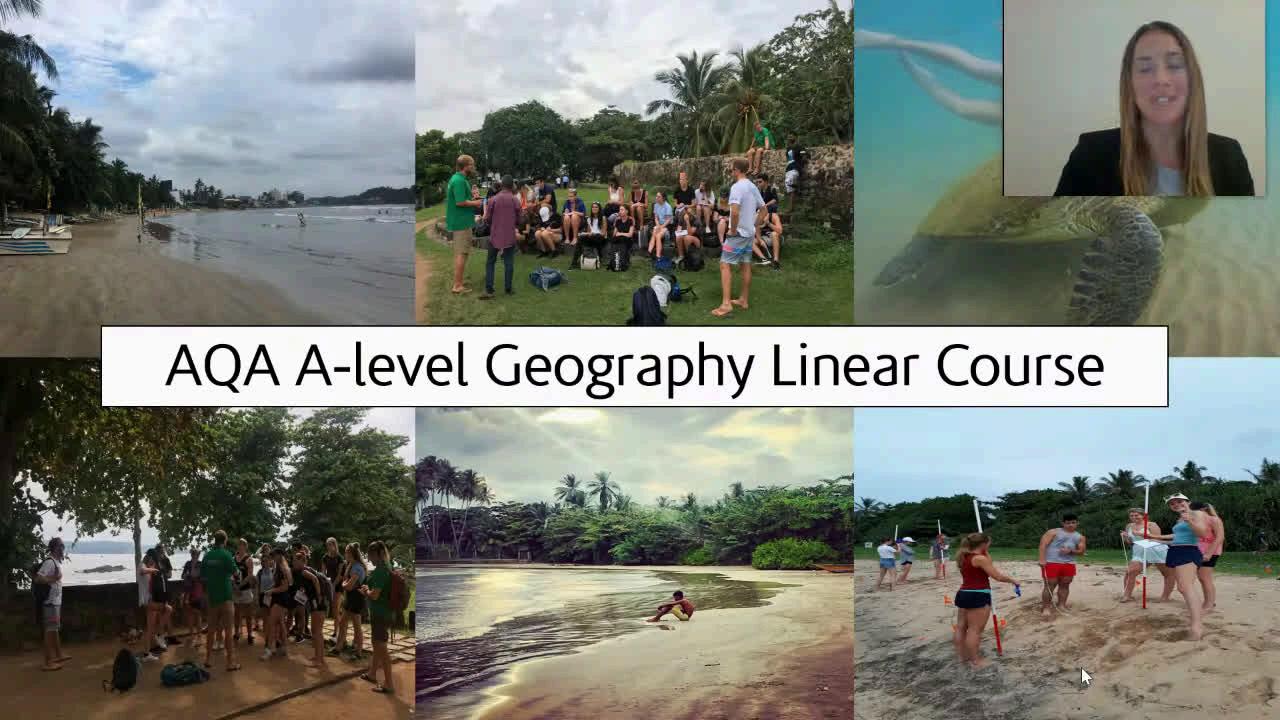

Head of Department: Mrs E Griffin
Available Levels: A Level
Exam Board: Edexcel
Entry Requirements: 6 in History 6 in English Literature, Geography or Economics
What are the aims of the course?
As in GCSE History, you will learn by using a variety of techniques, from structured written responses, to source analysis, use of original film and documentary footage, discussions and debates More emphasis is placed on your own wider reading and research; your skills as an independent learner will be further developed
What is involved?
During the course you will learn:
About the significance of events, individuals, issues and societies in history
How and why societies have changed over time
About the theories of historians and the language that they use to discuss their ideas
To understand the nature of historical evidence and the methods used by historians to analyse and evaluate it
To develop an understanding of how the past has been interpreted and represented
To express your own historical ideas confidently and effectively
How is it assessed?
Unit 1: Britain Transformed 1918 - 1997 (Examination)
Unit 2: The USA, 1955-92: conformity and challenge (Examination)
Unit 3: Britain: Losing and Gaining an Empire 1763 1914 (Examination)
Unit 4: Controlled Assessment - One 4000 word essay on an issue of historical controversy and debate Selected independently by students with teacher guidance
Specific entry requirements:
Students of GCSE History to have achieved at least a 6 in GCSE History
Students who did not study GCSE History, to have achieved a 6 in another humanities subject (e g Geography or Business Studies) or in English

Students who study A –Level History have access to a wide range of career and higher education opportunities The skills acquired during the course are recognised and valued by employers, universities and colleges History at A –Level provides an excellent foundation for a number of popular careers including law, journalism, teaching, business, civil service, archaeology and information management
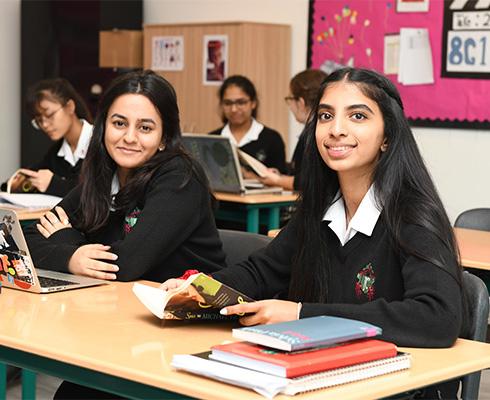
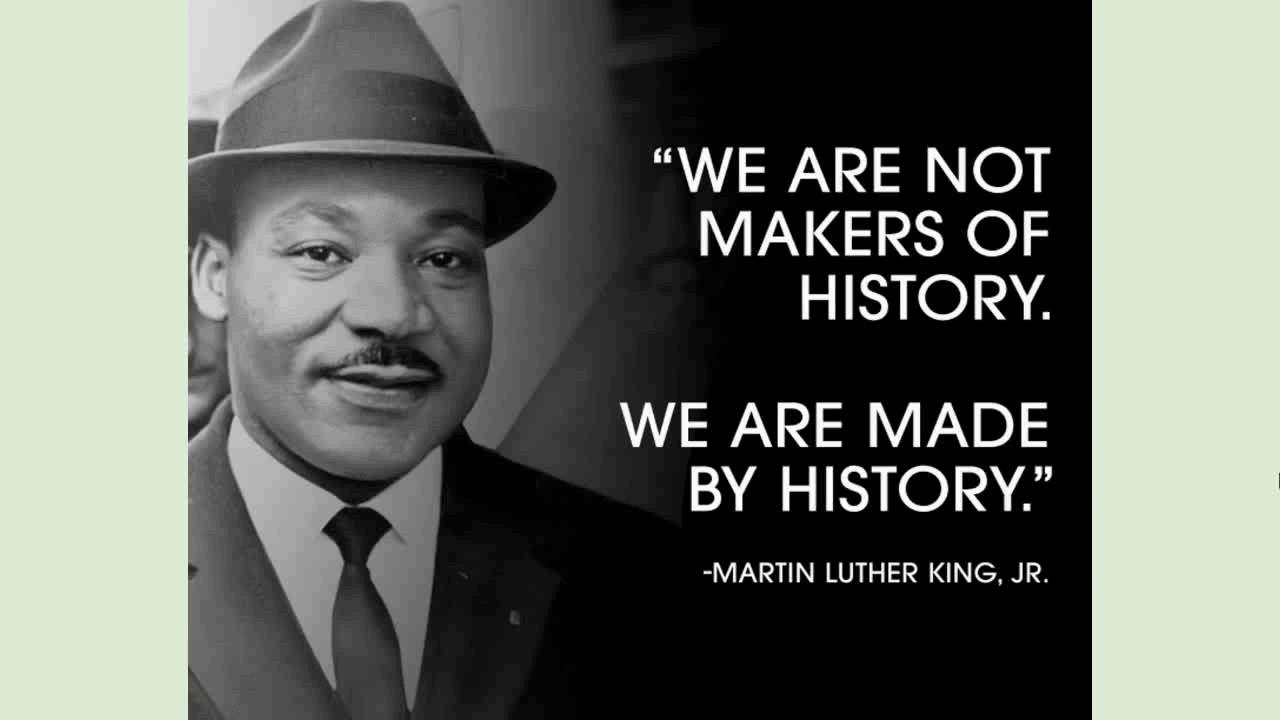
Head of Department: Mr G Dela Cruz
Available Levels: International A Level (9626)
International AS Level
Course Aims and Overview:
Exam Board: Cambridge
Entry Requirements: 6 in ICT
In an ever-evolving world of Information Technology (IT), the demand for technological and information literacy skills is paramount This syllabus is designed to empower learners with the ability to gather, process, and manipulate data effectively It fosters the development of a diverse range of IT skills, knowledge, and understanding Students explore the structure and utilization of IT systems across various organizations, including the intricacies of computer networks Consequently, learners gain insights into IT system life cycles and their implications in the workplace They also delve into the broader societal impact of IT At the A Level, students delve into simple web programming relevant to their personal IT usage
Assessment Overview:
AS Level Paper 1 (Theory): 1 hour 45 minutes, 70 marks Questions based on sections 1–11, externally assessed (50% of AS Level)
AS Level Paper 2 (Practical): 2 hours 30 minutes, 90 marks Practical tasks testing sections 8–11, externally assessed (50% of AS Level)
A Level Paper 3 (Advanced Theory): 1 hour 45 minutes, 70 marks Questions based on sections 12–20, with sections 1–11 as assumed knowledge and understanding Externally assessed (25% of A Level)
A Level Paper 4 (Advanced Practical): 2 hours 30 minutes, 90 marks Practical tasks testing sections 17–20, with tasks from sections 8–10 within a problem-solving context Externally assessed (25% of A Level)
Why is it a useful qualification?
Cambridge International A Level Information Technology serves as a solid foundation for higher education in various technology-related fields. Possible career paths include roles such as Cybersecurity Analyst, Database Administrator, Information Systems Manager, IT Consultant, IT Technical Support Officer, Systems Analyst, Business Analyst, Network Engineer, IT Sales Professional, and Web Content Manager. This program equips students with the skills and knowledge to excel in a rapidly evolving IT landscape I n f o r m a t i o n T e c h n o l o g y

Qualification Coverage:
Candidates pursuing Cambridge International AS Information Technology study topics 1–11:
Candidates advancing to Cambridge International A Level Information Technology continue with topics 1–11 and extend their learning to topics 12–20: IT in society
New and emerging technologies
Communications technology
Project management
System life cycle
Mail merge
Graphics creation
Animation
Programming for the web I n f o r m a t i o n T e c h n o l o g y

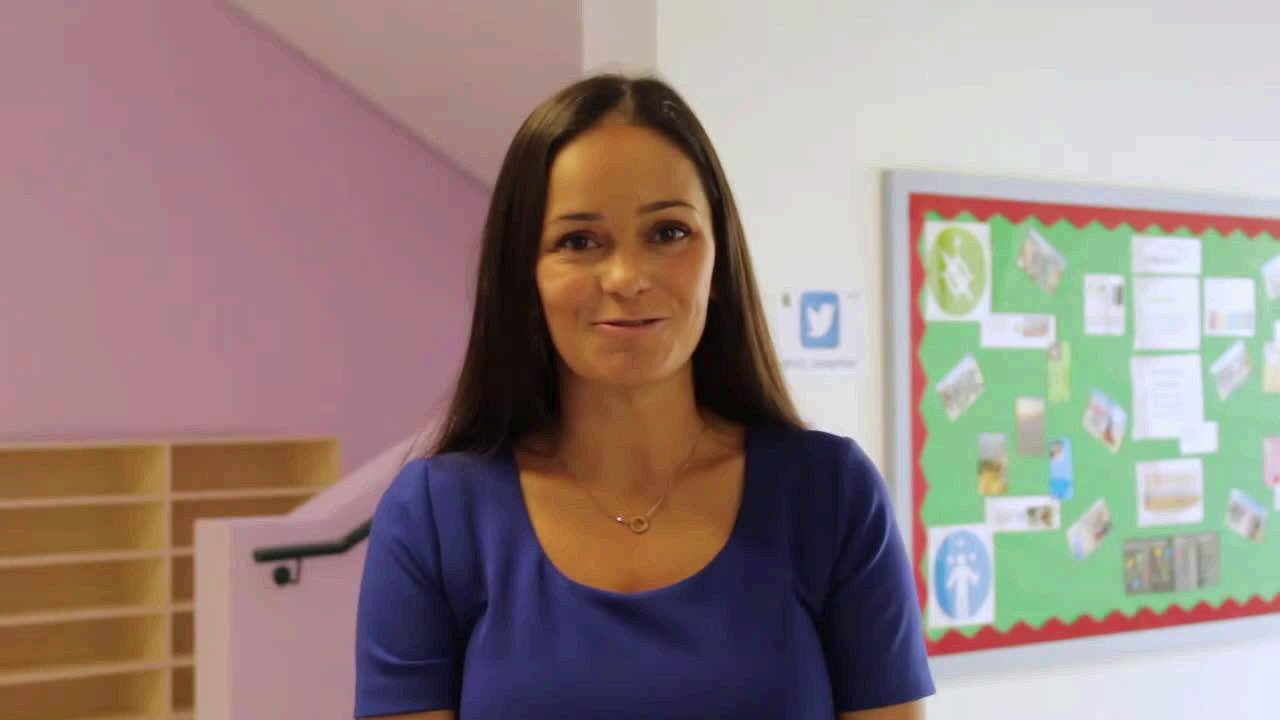
Head of Department: Mr G Dela Cruz
Available Levels: International Level 3
Subsidiary Diploma
What are the aims of the course?
Exam Board: Pearson
Entry Requirements: Sixth Form Entry Requirements 6 in ICT preferred
The BTEC International Level 3 qualifications in IT have been developed in collaboration with Microsoft to ensure content aligns with specific certified learning opportunities These qualifications give a professional advantage by providing a mastering of skills in digital and cloud businesses through the attainment of industry-endorsed certification Attainment of these certifications allow learners to pursue technical job roles
The Pearson BTEC International Level 3 qualifications in Information Technology are designed for learners who are interested in the study of information technology, with a view to progressing to a range of graduate entry higher-education courses and/or working within the IT industry on completion of this qualification Learners will have exposure to a wide range of IT topics that will enhance their progression to higher education in this sector, a complementary sector or a contrasting sector, and ultimately lead to employment.
360 GLH Equivalent in size to one International A Level.
Two mandatory units that include a Pearson Set Assignment (50%) Learners complete remaining optional units to the value of 180 GLH
This course covers a broad basis of study for the information technology sector This qualification is designed for learners who are interested in an introduction to the study of creating information technology systems to manage and share information, alongside other fields of study, which may include other vocational or general qualifications, with a view to progressing to a wide range of higher education and employment opportunities, not necessarily in information technology
What could these qualifications lead to?
These qualifications give learners the opportunity to progress to higher education to study a BTEC Higher National in Computing, a degree in an information technology discipline or a degree where information technology related skills and knowledge may be advantageous, such as business studies
They also support learners who want to develop knowledge and skills needed for vocational apprenticeship roles, and allow for progression to job opportunities at trainee/entry levels Jobs available in these areas include:
Software Developer
Web/Content Developer
Mobile App Designer
Games Designer
Programmer
IT/Business Analysis Support B T E C I n f o r m a t i o n T e c h n o l o g y

HNC in Interactive Media
FdSC in Business Computing
HND in Engineering
BSc (Hons) in Information Management for Business
BA (Hons) in Accounting and Finance
BSc (Hons) in Information Management for Business
NB: Learners should always check the entry requirements for degree programmes with the relevant higher education provider
(M) Mandatory. All other topics are optional
Students should be able to show the ability to gain a strong Pass at GCSE, therefore, a Grade 6 in GCSE/iGCSE ICT is preferred
How is it assessed?
Assessment is designed to fit the purpose and objective of the qualification It includes a range of assessment types and styles suited to vocational qualifications in the sector All assessment is internal but some mandatory units have extra controls on assessment and are assessed using Pearson Set Assignments Additionally, some units are synoptic
Achievement of the qualification requires demonstration of depth of study in each unit, assured acquisition of a range of practical skills required for employment or for progression to higher education, and successful development of transferable skills Learners who achieve a qualification will have achieved across mandatory units, including synoptic assessment, where applicable
Units are assessed using a grading scale of Distinction (D), Merit (M), Pass (P) and Unclassified (U) All mandatory and optional units contribute proportionately to the overall qualification grade, for example, a unit of 120 GLH
Further information available via: https://qualifications pearson com/en/qualifications/btec-international-level-3 html B T E C I n f o r m a t i o n T e c h n o l o g y
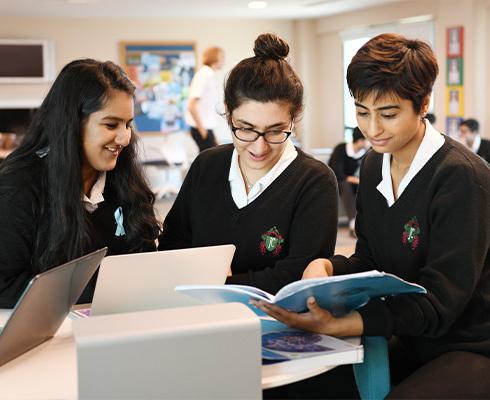
Head of Department: Mr P Tank
Available Levels: A level 9MA0
Exam Board: Edexcel
Entry Requirements: 8 in Mathematics
What are the aims of the course?
The Advanced GCE course in Mathematics aims to build on students’ knowledge from GCSE Mathematics The course further develops a student’s understanding of mathematics and mathematical processes, helping them to form logical arguments and construct mathematical proofs
The course will enable students to extend their range of mathematical skills and use them in more difficult, unstructured problems They will also begin to recognise how a real-world problem can be represented mathematically and how models can be applied and refined. Students will develop an awareness of the relevance of mathematics to other fields of study, to the world of work and to society in general.
What is involved?
A comprehensive knowledge of all topics from GCSE Mathematics is needed for this course In particular, students must be confident in algebraic manipulation and trigonometry to grade 8 All students will be required to sit a basic skills test at the beginning of the course
The Advanced course is fast paced and new concepts often build upon previous work It is therefore essential that students approach the course with the right attitude and level of commitment from the very first lesson Prospective students should be aware that this course requires a sustained, high level of effort Students will be expected to consolidate work completed in class with a minimum of 6 hours independent study each week This may comprise, for example, of teacher-set work, practice of methods or further reading of the subject Additionally, all students will complete a number of set homework assignments and intermittent practice examinations during the year
The course content is two thirds Pure Mathematics comprised of topics such as proof, algebra & functions, coordinate geometry, sequences & series, trigonometry, exponentials & logarithms, vectors and calculus The final third is comprised of an Applied module, equally weighted between Statistics and Mechanics Statistics content includes statistical sampling, data presentation and interpretation, probability, statistical distributions and statistical hypothesis testing, and Mechanics content includes quantities and units in mechanics, kinematics, forces, Newton’s laws and moments M a t h e m a t i c s

How is it assessed?
Students will sit 3 written examinations at the end of their second year of study, each of which are equally weighted, 2 hours long, calculator allowed and scored out of 100
PAPER 1: Pure Mathematics 1 9MA0/01
PAPER 2: Pure Mathematics 2 (Paper 1 is assumed knowledge for this) 9MA0/02
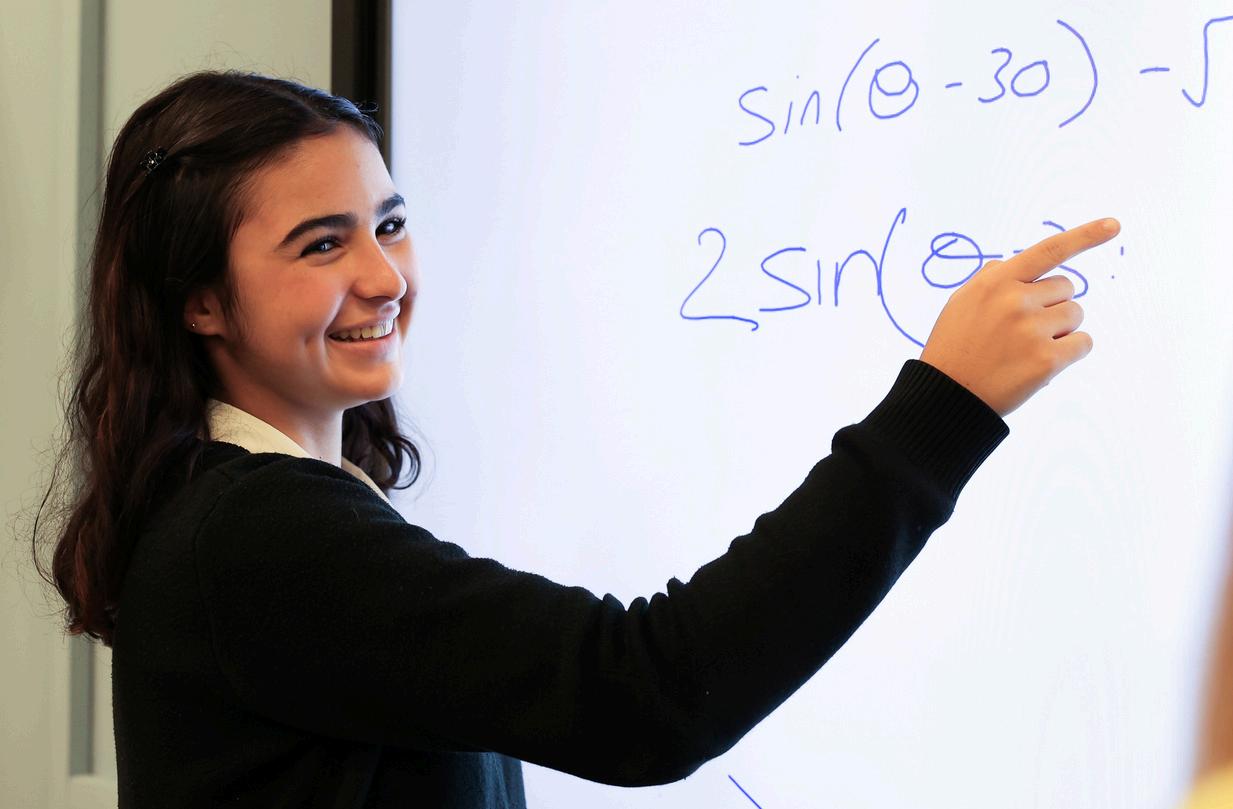
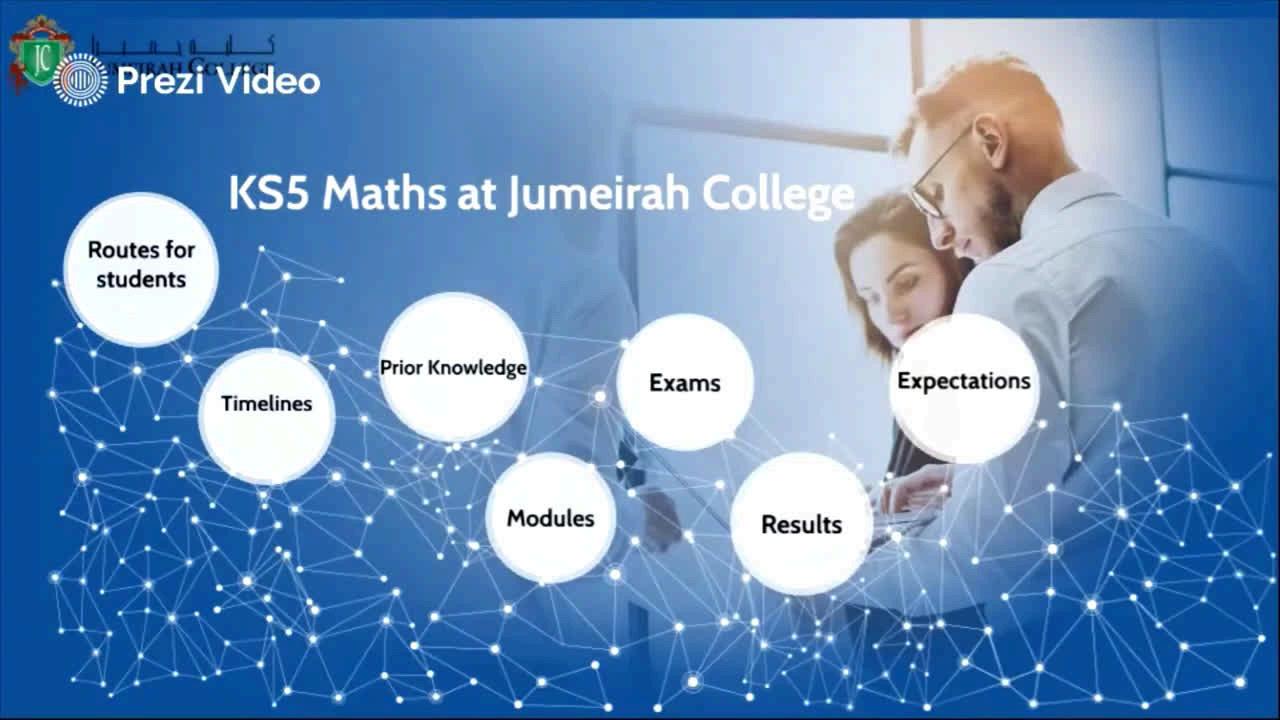
PAPER 3: Statistics and Mechanics 9MA0/03 M a t h e m a t i c s
Head of Department: Mr P Tank
Available Levels: AS Level 8MA0
Exam Board: Edexcel
Entry Requirements: 7 in Mathematics
Please note that this is an Advanced Subsidiary (AS) course This means that it is worth half an A Level and will need to be taken alongside 3 other A Level courses
Students will not be able to transfer to the full A Level course from this course Students will have 3 contact periods per week and the AS examination will be taken at the end of Year 13 Students opting for A Level mathematics do not need to apply for this course
What are the aims of the course?
The course will enable students to continue their study of mathematics beyond GCSE, who perhaps do not need a full A Level to pursue their chosen career path This course is respected by Higher Education institutes It will be offered as a fourth subject, studied for 3 lessons a week over 2 years, and students will gain an AS Level in mathematics at the end of the course The course develops a set of transferable skills, including the skill of working with mathematical information, as well as the ability to think logically and independently, consider accuracy, model situations mathematically, analyse results and reflect on findings. Learners can apply these skills across a wide range of subjects and the skills equip them well for progression to higher education.
What is involved?
A comprehensive knowledge of all topics from GCSE Mathematics is needed for this course In particular, students must be confident in algebraic manipulation and trigonometry to grade 7 All students will be required to sit a basic skills test at the beginning of the course
The AS course will allow students to deepen their knowledge of mathematics and build on content from their GCSEs Prospective students should be aware that this course requires a sustained, high level of effort Students will be expected to consolidate work completed in class with a minimum of 3 hours independent study each week This may comprise, for example, of teacher-set work, practice of methods or further reading of the subject Additionally, all students will complete a number of set homework assignments and intermittent practice examinations during the year It is wise to note that students taking this course will not be allowed to take the external exam after one year of study, and will not receive any certification if they do not complete the two year course A S M a t h e m a t i c s
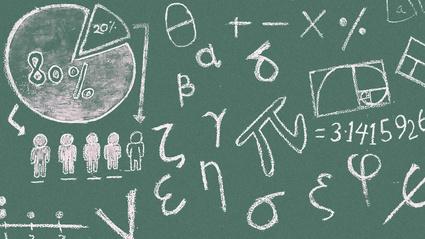
In similar fashion to the full A Level, the course content is two thirds Pure Mathematics comprised of topics such as proof, algebra & functions, coordinate geometry, sequences & series, trigonometry, exponentials & logarithms, vectors and calculus The final third is comprised of an Applied module, equally weighted between Statistics and Mechanics Statistics content includes statistical sampling, data presentation and interpretation, probability, statistical distributions and statistical hypothesis testing, and Mechanics content includes quantities and units in mechanics, kinematics, forces, Newton’s laws and moments
How is it assessed?
Students will sit 2 written examinations at the end of their second year of study, which are weighted, 62 5% and 37 5%, calculator allowed and scored out of 100 and 60 respectively
Paper 1: Pure Mathematics 1 8MA0/01
Paper 2: Statistics and Mechanics 8MA0/03

Head of Department: Ms O McCombe
Available Levels: A Level 7572
Exam Board: AQA
Entry Requirements: 5 in English Language
What are the aims of the course?
Through studying Media Studies students will view, evaluate and analyse a variety of media products, and develop practical skills spanning a range of media forms
Students are given the opportunity to:
Develop skills of enquiry, critical thinking and analysis
Develop appreciation and critical understanding of the media and their role both historically and currently in society, culture, politics and the economy
Develop an understanding of the dynamic and changing relationships between media forms, products, media industries and audiences
Develop knowledge and understanding of the global nature of the media
Engage in critical debate about academic theories used in media studies
Develop sophisticated practical skills through creative media production.
What is involved?
A level Media Studies engages students in the in-depth study of media products in relation to the four areas of the theoretical framework: media language, media representation, media industries and media audiences The specification requires students to closely analyse and compare media products in relation to relevant key social, cultural, economic, political and historical contexts
How is it assessed?
Media One: Examination
Media Language and Media Representations: advertising, marketing and music video Media Industries and Media Audiences: radio, newspapers and the film industry
Media Two: Examination
Questions will focus on the in-depth media forms of television, magazines and online, social and participatory media/video games
Non-exam assessment: Creating a cross-media production (coursework)
Choice of one of six annually changing briefs, set by AQA
Students produce:
a statement of intent
a cross-media production made for an intended audience M e d i a S t u d i e s



Media Studies is an academic A Level which provides a good foundation for higher education and for further study of media-related courses It is a great choice for people considering a career in the creative industries Through studying contemporary, diverse topics and varied and engaging content, students will develop research, problem-solving skills as well as their creativity They’ll also refine their debating skills through the discussion of contemporary issues from a range of perspectives M e d i a S t u d i e s
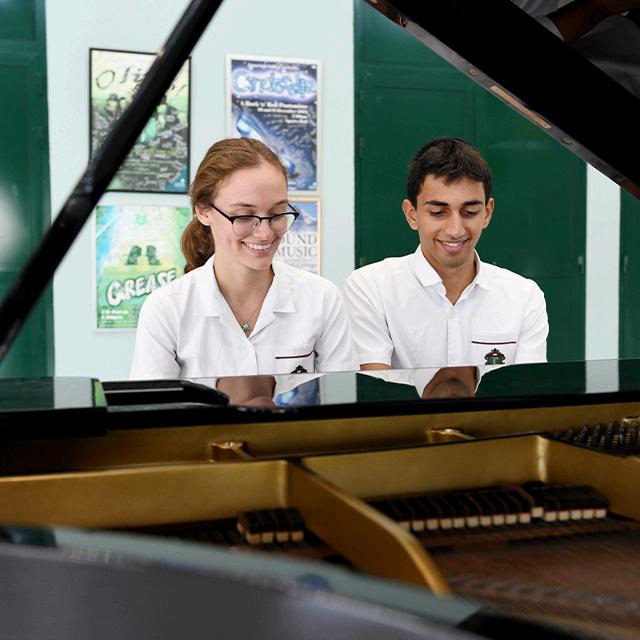
Head of Department: Ms H Chambers
Available Levels: A Level 9MU01
Exam Board: AQA
Entry Requirements: 6 Music and Grade 7 standard instrument/voice Meeting with Head of Department
What are the aims of the course?
A Level Music from AQA aims to deliver a rounded course where students continue to expand their knowledge and skills in the three main areas of the subject; performance, composition and musicology Music is constantly evolving, inspiring creativity and expression in a way that no other subject can A-level Music values all music styles, skills and instruments. This course requires you to be creative, critical and knowledgeable about a range of music, genres and contextual issues This aims to be contemporary and relevant to modern students
What is involved?
The course includes a diverse collection of set works covering different genres and time periods Unlike the exams of old, these set works are highly listenable and present in both modern orchestral repertoire and the modern commercial music world
Performing 35% NEA
Total performance time of 10 minutes Solo and/or ensemble performance
2 compositions:
Composing 25% NEA
Appraising 40% Exam
Total four and a half minutes of music:
1 1 free composition
1 composition to a brief – Bach Chorales
Section A: Listening (56 marks)
Section B: Analysis (34 marks)
Section C: Essay (30 marks)
Areas of study:
1 Western classical tradition 1650–1910 (set works) –COMPULSORY
Study 2 more areas of study from these options:
2 Jazz music
3 Music for media
4 Music for theatre
Total 50 marks Recital performance
2 pieces
Total 50 marks 25 marks 25 marks
Total 120 marks Exam

A Level Music is an academic subject in which students analyse, critically evaluate, develop literacy and writing skills, and develop their creativity Successful Music students often go on to read subjects such as Computer Science, English, Modern Languages, Performing Arts, Business Studies and Economics at university A variety of careers rely on the core elements of confidence, leadership, creativity and decision making, all of which are integral to studying Music A Level and all of which are skills looked for by every university and employer in the modern world
Many people have studied A Level Music as it has so many links to other subjects, careers and skills required by employers If you are considering a career in the performing arts industries, studying music at A Level will provide you with a wealth of holistic personal attributes There is a vast range of jobs and career opportunities that studying Music provides Other than the obvious jobs such as performer and composer, other career options include: Music Business and Legal, Producer, Audio and Sound Designer/Engineer, Music Therapist, Event Coordinator/Manager, Radio and Podcasting, Music Software Development: Developing music software and applications Even if students do not go on to study Music at a higher level, many of the skills learnt are transferable Music students have gone on to become lawyers, doctors, police officers, politicians and even astronauts!
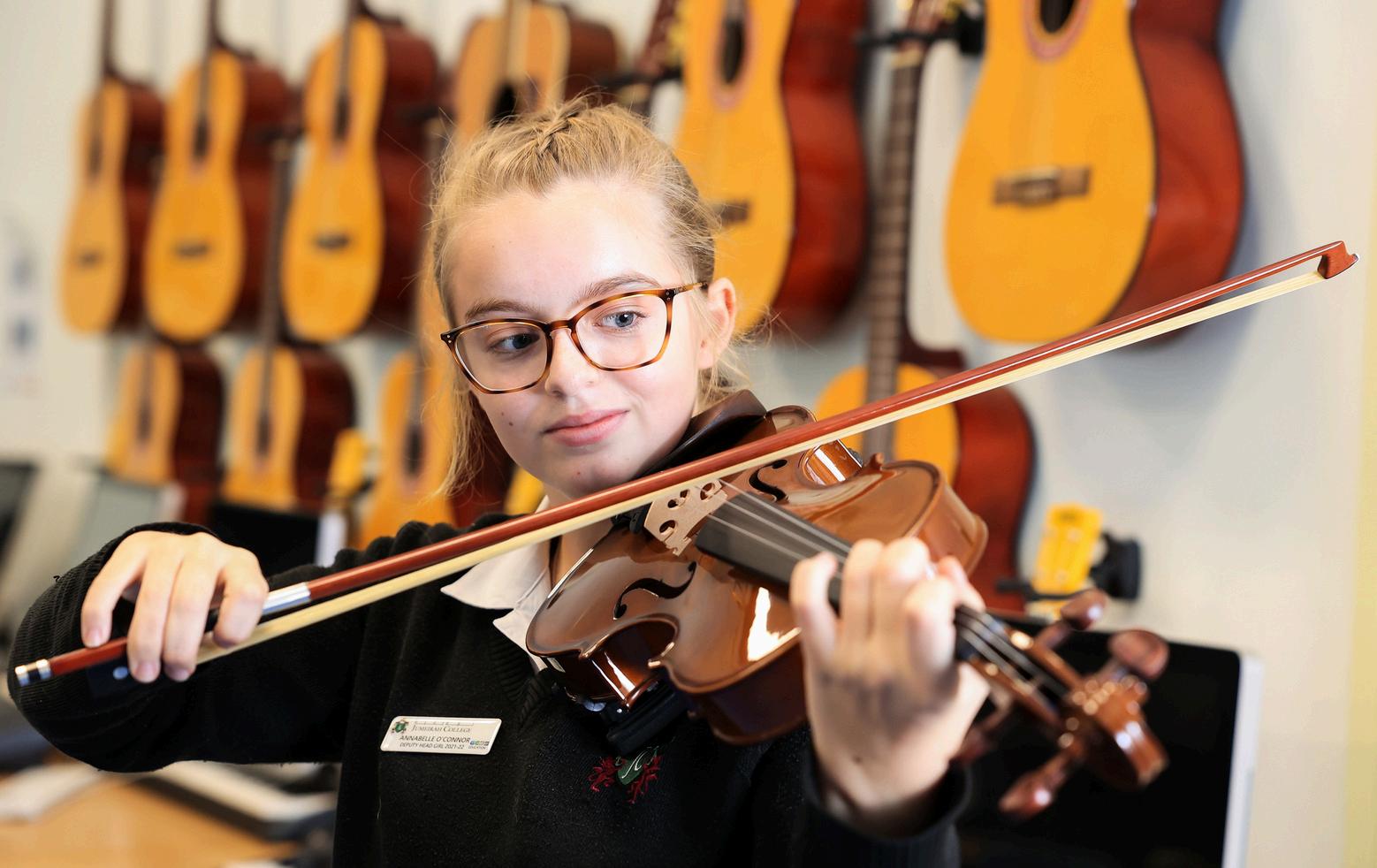
Head of Department: Ms S Jackson
Available Levels: A Level
Exam Board: Edexcel
Entry Requirements: 5 in Art and Design Meeting with Head of Department
What are the aims of the course?
The course aims to develop understanding of a wide range of photographic approaches Whether students are interested in digital photography, traditional SLR work or film-making, all will receive expert support and tuition
What is involved?
During the A-Level course in Year 12 students will begin by focusing on different techniques within workshops and will produce documentary work and work for specific briefs, such as: formal elements, constructed images and documenting living
Year 12: Combines practical work with an investigation into the work of established photographers. There is an emphasis on research – but also on experimentation and learning different techniques using different cameras.
Year 13: The A2 Photography course follows on from what students have learned in Year 12, however the emphasis during the 2nd year is on the process of independently developing both ideas and work through a personal study investigation unit Students will explore past and contemporary Photographers, analysing the works of artists and designers Students will be able to produce a personal and in-depth response, embracing a range of ideas, while confidently exploring a range of media and process Central to this is the journal, a working sketchbook Students will also be required to produce a written piece of 1000-3000 words (Personal Study), which will be assessed as component 1.
Component 2: In the second term students will be given the externally set assignment which will contain suggestions for a starting point Students will have eight school weeks to prepare for the timed test During this time they will explore the theme in depth, within their journals/sketchbook and through preparatory studies The final examination lasts 15 hours and within this time students will produce their final idea Their preparatory and developmental work, along with the final pieces which will then be submitted for assessment
Throughout the duration of the course, students will make regular location visits to take photographs, as well as visiting exhibitions to see, analyse and discuss original prints at first hand P h o t o g r a p h y

How is it assessed?
Component 1: 60% of total A-Level mark
Component 2: 40% of total A-Level mark
Specific Entry requirement:
5 at GCSE Art and Design or upon consultation with Head of Art
Why is it a useful qualification?
Many students decide to explore more aspects within the course and study an art foundation course at a college or university and build on this route further and specialise in a particular aspect of Art and Design at degree level The completion of a Photography degree, could lead to a range of career options in such fields as advertising, marketing, design, architecture, publishing, fashion, and the media The study of Photography develops transferable skills, which can be taken into many careers or degree pathways


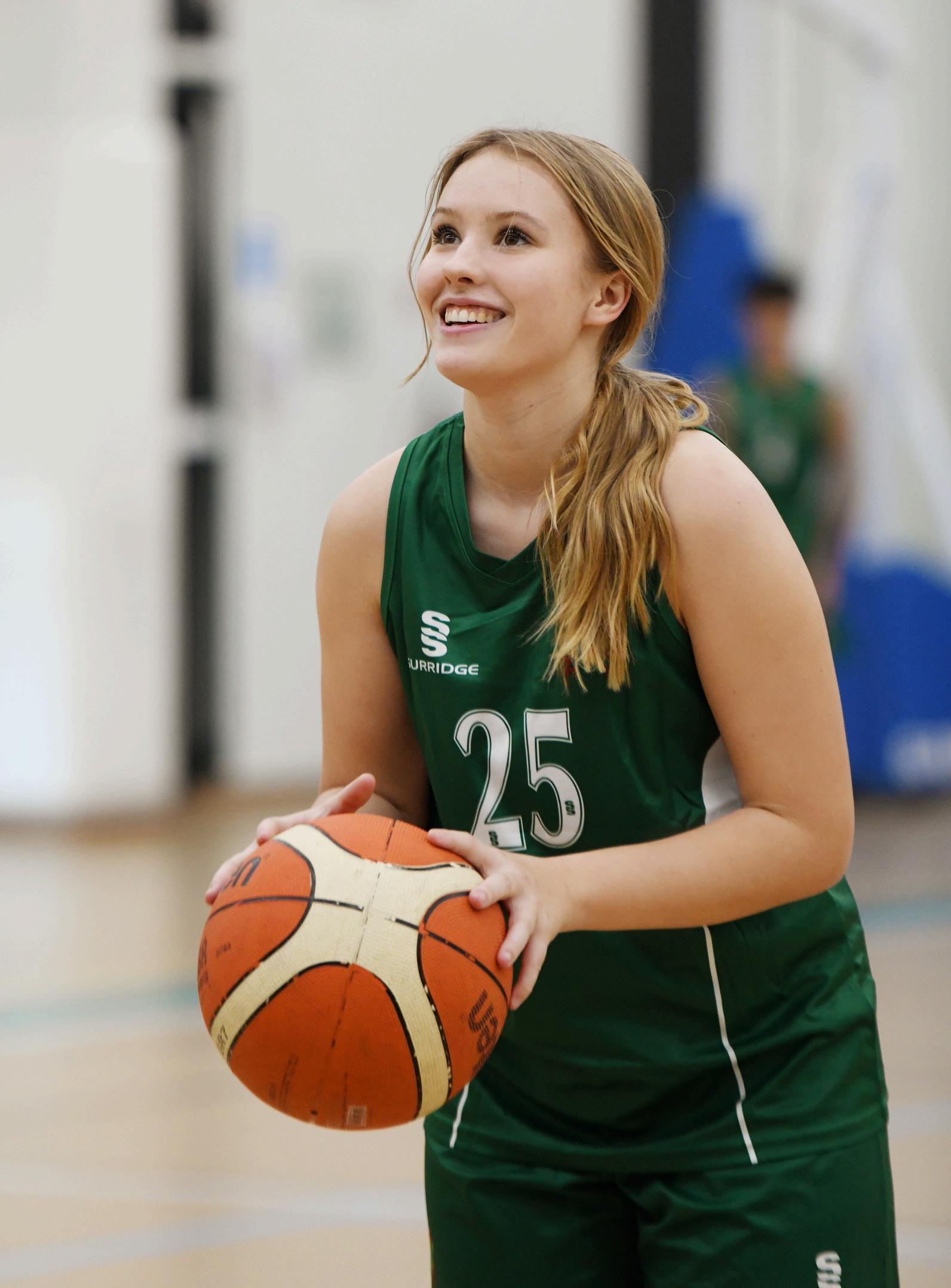
Head of Department: Ms S Wardell
Available Levels: A Level
Exam Board: AQA
Entry Requirements: 6 in Physical Education and 6 in Science or 7 in Combined Science
What are the aims of the course?
This course aims to enhance a student’s knowledge and understanding of the factors which affect performance and participation in Sport and Physical Education The course covers a broad range of topics which are relevant to sporting and physical activity; these include physiological and psychological factors, as well as addressing contemporary issues such as the use of technology, ergogenic aids including performance enhancing drugs and the increasing commercialisation of sport Students will be expected to take part in sporting or physical activities for the college on a regular basis and to maintain a high level of fitness They should also be aware of current issues and developments in sport, for example regularly reading online/newspaper reports
What is involved?
Curriculum organisation:
Students will usually have 6 classroom-based theory lessons per week and are expected to refine their physical performance in their chosen activity in their own time.
The use of practical lessons to supplement the theory in an applied manner occurs where necessary
The main course books used will be the new AQA A level PE and AS Level PE (Atherton, Burrows, Howitt and Young) textbooks
Students have to compile an individual portfolio containing evidence of their practical performance for their Non-Examination Assessment (NEA)
Independent study:
A Level PE students are expected to be resourceful and independent learners who should be using all available resources to supplement classroom learning
They should therefore be preparing and researching for each unit and demonstrating a keen interest for all topics being covered
Each unit demands a minimum of 1 homework per week
Students must be participating in their chosen practical activity at least 2/3 times per week
Evidence of participation in all aspects of NEA should be gathered from the beginning of the course and stored electronically
P h y s i c a l E d u c a t i o n

Assessment and Reporting:
At AS and A level, components A, B and C have regular topic tests to monitor progress and provide information for reports Final exams are sat at the end of year 13
Students are given clear instructions as to practical and coursework (NEA) deadlines throughout the course.
Written Examination (70%)
Paper 1: Written exam (2 hours)
Component A: Applied anatomy and physiology
Component B: Skill acquisition
Component C: Sport and society
Paper 2: Written exam (2 hours)
Component A: Exercise physiology and biomechanics
Component B: Sport Psychology
Component C: Sport and society and technology in sport
NEA (30%):
Analysis and Evaluation written coursework (15%)
Practical Performance (15%)
Extracurricular opportunities:
Students are expected to play a full and active part in the sporting opportunities available as part of the College extra-curricular program as participants, leaders and officials They must be participating regularly in both training sessions and competitive situations in their chosen practical activity outside of normal College hours
Specific entry requirements:
Overall GCSE Physical Education grade of at least a 6, as well as at least a level 6 for the practical element of the GCSE Physical Education course and a minimum Grade 6 in a Science or a Grade 7 in Combined Science Furthermore, students must play regular sporting activities and be heavily involved within College sports teams
Why is it a useful qualification?
There are now a variety of degree courses linked to sport including sports science, sports studies, sports psychology, sports business and marketing. There is a coaching and leading element to the course which enables students to maintain lifelong involvement in sport Sport is now a huge global industry with many more varied career opportunities than in previous years P h y s i c a l E d u c a t i o n
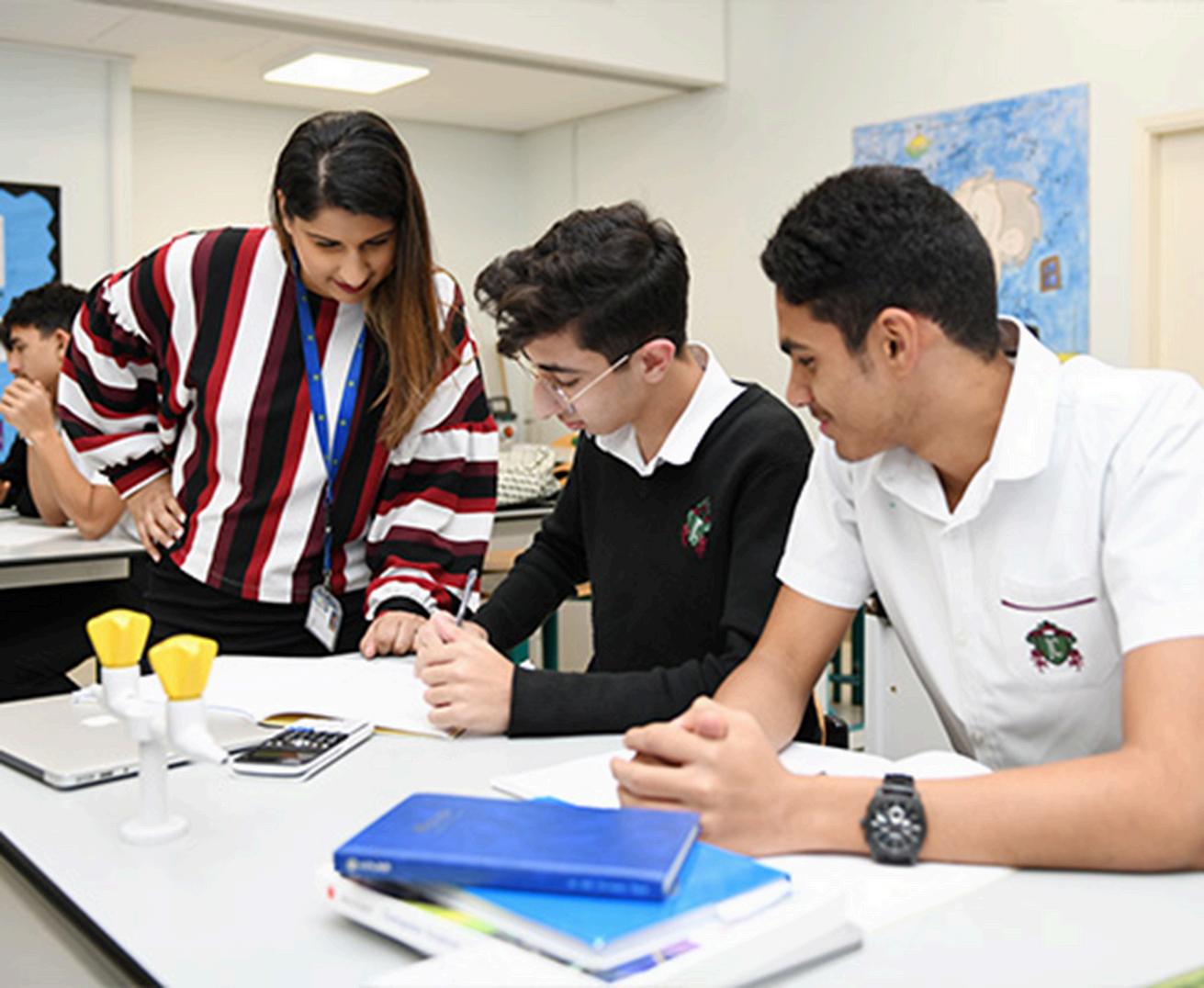
Head of Department: Mr D Hagar
Available Levels: AS level (7407) and A Level (7408)
Exam Board: AQA
Entry Requirements: 7 in Physics/8 in Combined Science and must qualify for an be taking AS or A Level Mathematics
What are the aims of the course?
Physics is the study of everything from the very small to the very large It focuses on improving our detailed understanding of nature's most fundamental laws and on using basic principles to explain the remarkable complexity observed in natural phenomena The practice of Physics is equally broad Some physicists focus on deep, abstract ideas concerning the laws of nature, while others apply Physics to make practical innovations in technology The A Level Physics qualification provides further progression from the Key Stage 4 ideas and concepts and enables students to sustain and develop an interest in Physics and its applications
What is involved?
Paper 1 Measurements and their Errors, Particles, Waves, Mechanics and Electricity
Paper 2 Further mechanics, Thermal Physics, Fields and Nuclear Physics
Paper 3 Optional topic, Practical and Data Analysis skills
Options Astrophysics, Medical Physics, Engineering, Turning Points, Electronics
The theory for Paper 1 is taught in Year 1 along with the skills needed for this practical subject
How is it assessed?
7408/1 Paper 1 2 hr Examination
7408/2 Paper 2 2 hr Examination
7408/3 Paper 3 2 hr Examination
Practical Endorsement:
Throughout the course, students are assessed on their practical and data analysis skills This is done through a series of core practicals, where students keep an ongoing record in their laboratory books The endorsement is a separate pass or fail qualification that benefits applications to practical university courses and high level institutions
h y s i c s

At the end of the first year we will offer all students the chance to sit formal external AS exams as we believe this will assist students with their University Applications, especially as many of our students opt for some of the most competitive courses at the top institutions It will also mean any student wishing to not continue into the second year will come out with a qualification in the subject
Specific Entry Requirements:
Grade 7 in Physics or Grade 8 in Combined Science Numeracy skills are important in Physics; students should also qualify for and be taking AS or A Level Mathematics (see Mathematics entry requirements)
Why is it a useful qualification?
The study of Physics is a discipline of problem solving and critical thinking, skills that are essential for success in many fields There is a high regard for the qualification as it demonstrates that you are a highly able, versatile and dedicated student; traits that are very attractive to universities and employers alike Learning about the big ideas and latest discoveries in Physics can stimulate a lifetime’s interest and lead to work in an extremely wide array of future career options from IT and Engineering to Medicine and Finance
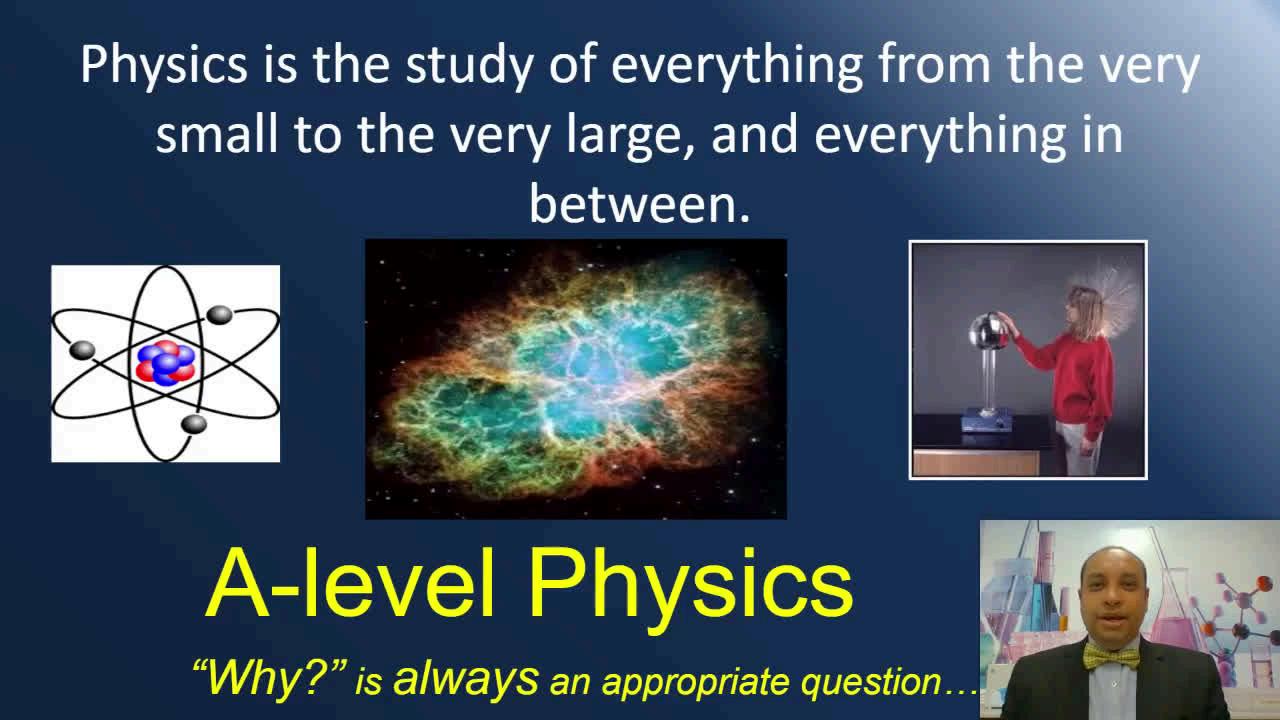
Head of Department: Mrs E Griffin
Available Levels: A Level
Exam Board: Edexcel
Entry Requirements: 6 History, Economics, English or Geography
What are the aims of the course?
To teach students the skills of debate, research, arguing a case and to provide them with greater political and global awareness To prepare students who are going on to study Politics, Law, Journalism, History and PPE at university
What is involved?
Part 1: UK Politics
This unit introduces students to the key channels of communication between the UK Government and its people It encourages them to evaluate the adequacy of existing arrangements for ensuring representative democracy and participation
The unit also introduces students to the core theoretical perspectives behind Political Philosophy; Conservatism, Liberalism and Socialism
Part 2: UK Government
This unit introduces students to the major governmental processes within the UK It encourages them to develop a critical understanding of the role and effectiveness of key institutions, and of the relationships amongst them in the context of multi-level governance.
The unit also extends student study of Political Philosophy, by offering a choice between a close study of Anarchism, Ecologism, Feminism, Multiculturalism or Nationalism
Part 3: Comparative Politics: USA
Students will study representative processes in the USA and the workings of the US government Key areas of analysis include the US Constitution, US Congress, Presidency and the Supreme Court, as well as civil rights, elections, political parties and pressure groups
How is it assessed?
The course consists of three examined units all taken in June of Year 13 All units are weighted equally, with each counting just over 33% of the full qualification There is no controlled assessment

Specific entry requirements:
No previous study of Politics is required
Grade 6 in either GCSE History, Economics, English or Geography
An interest in politics and a willingness to read around the subject, including news media is vital for successful completion of the course
Why is it a useful qualification?
Who should study politics, and why? The short answer is that everyone should study politics All members of society should have a better understanding of the general rules under which they live
However, certain students will undoubtedly find politics more exciting than others What makes politics different as an academic subject is it’s emphasis on debate, discussion and argument Facts and values are so closely entwined in politics that it is often impossible to prise them apart
Politics is therefore particularly likely to suit students who:
Have an interest in the world around them - ones who want to know more about the society they live in, how it works and how it could work
Enjoy debate, discussion and argument - ones who are comfortable with the fact that in politics there are no simple ‘rights’ or ‘ wrongs ’
Like to think for themselves - ones who want to develop their own views, rather than accept the views of others
The skills gained in Government and Politics through debate, discussion and extended writing are highly valued by employers, and often lead to careers in finance, education, politics, civil service and international relations

Head of Department: Mr G Parkin
Available Levels: A Level (7552)
Exam Board: AQA
Entry Requirements: 6 in Design and Technology
What are the aims of the course?
This course has been designed to encourage pupils to take a broad view of design and technology, to develop their capacity to design and make products and to appreciate the complex relations between design, materials, manufacture and marketing The subject demands a creative, experimental and industrious approach
What is involved?
Candidates are encouraged to develop and sustain their own innovation creativity and technological capability They develop a critical understanding of product design and manufacture both historically and in current practice and apply knowledge and skills of design and production to a range of technological activities. Students learn to communicate at a sophisticated level through drawings and analytical language Many gain tremendous confidence through this process
How is it assessed?
Year 1
Students will undertake a number of skill build tasks at the beginning of the academic year followed by a minor NEA project
Minor NEA (Non-Examined Assessment) Design and make portfolio (Approximately 35-40 hours)
Candidates will submit a NEA portfolio and manufactured prototype based on an internally set contextual challenge using an iterative design approach The NEA will be assessed based on the following criteria
Investigate
Design
Make
Evaluate
During Year 1 and 2 students will cover examination topics, including: Materials
Processes
Product development
Technological developments
Health & safety and risk assessment P r o d u c t D e s i g n

Year 2
50% External examinations
Paper 1
Paper 2
Technical principles (30% - 2 hours 30 minutes)
Designing and making principles (20% - 1 hour 30 minutes)
50% NEA (Non-Examined Assessment) Design And Make (Approximately 50-60 hours)
Candidates will submit a substantial NEA portfolio and manufactured prototype based on an independently sought out design context, problem or client The NEA will be assessed based on the following criteria: Investigate Design Make Evaluate
Specific entry requirement:
Grade 6 in Design and Technology or upon consultation with the Head of Department
Why is it a useful qualification?
Design and Technology is a popular subject for students wishing to continue education at university level in it’s own right and as part of an overall rounded qualification for entry to many courses Opportunities for careers are many You need only to consider with an enquiring mind the world that surrounds you A level Product Design enables students to present an impressive folio of design work which is useful for interviews. The focus for university courses is very broad and includes the following: Product Design, Mechanical Engineering, Architecture, Furniture Design, Theatre Set Design and interior Design. Our Alumni, who have successfully completed A level Product Design, have gone on to pursue it at degree level at prestigious universities in the UK, USA, Canada and Australia P r o d u c t D e s i g n
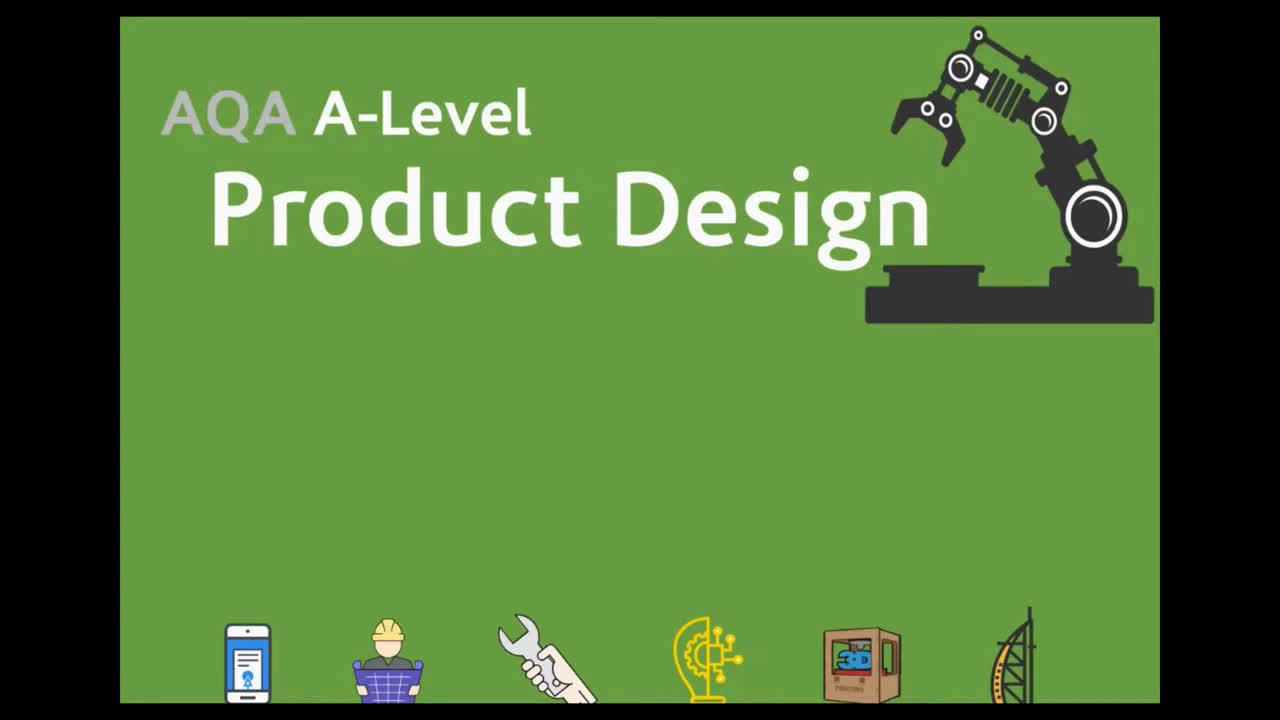
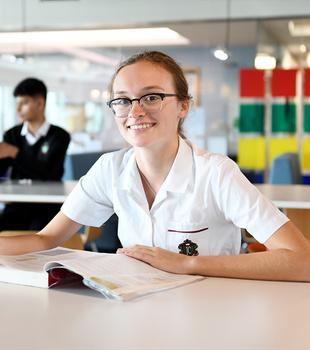

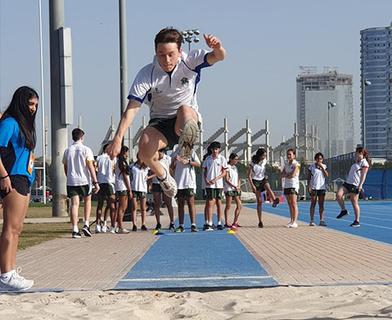
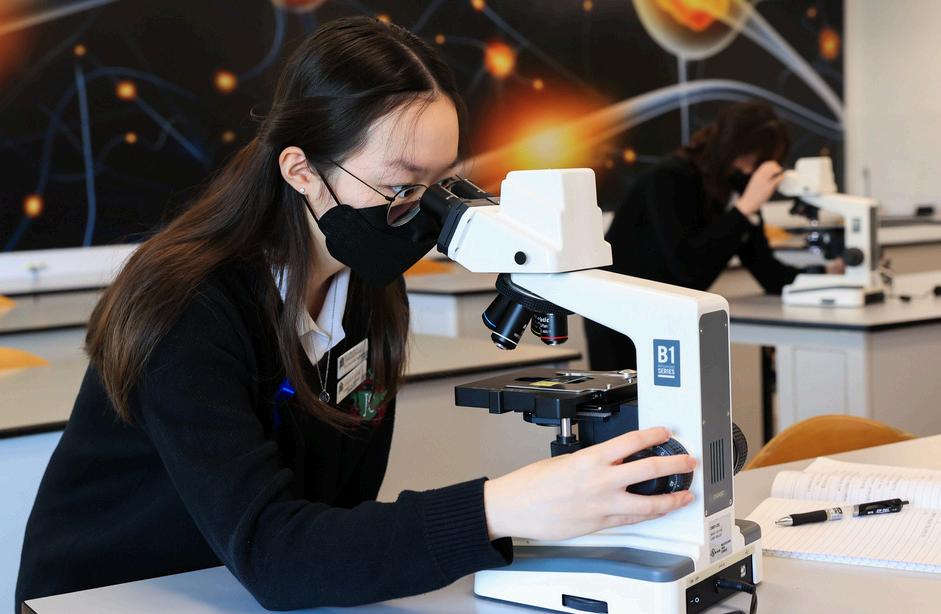
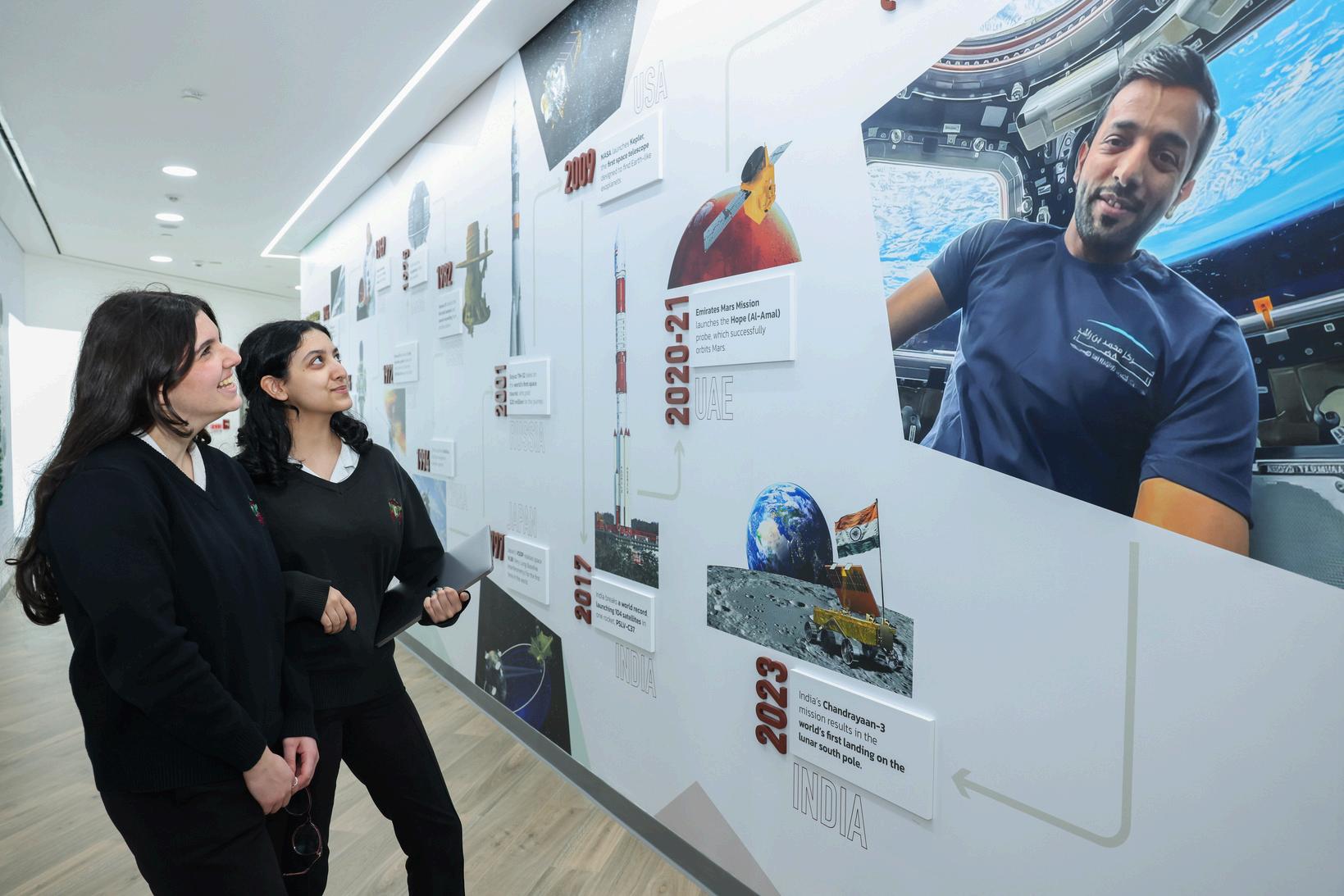

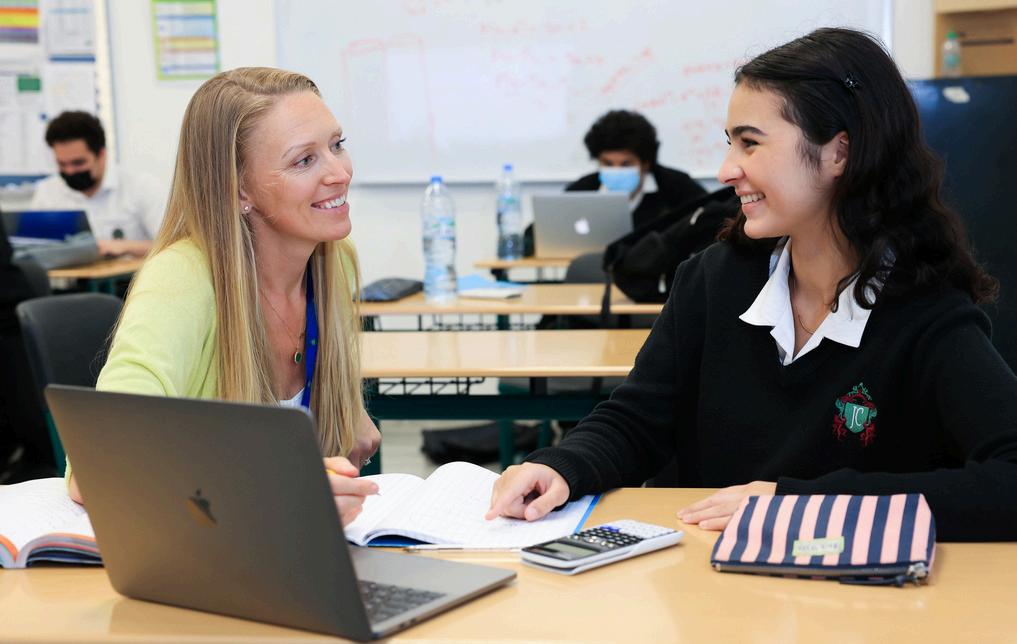

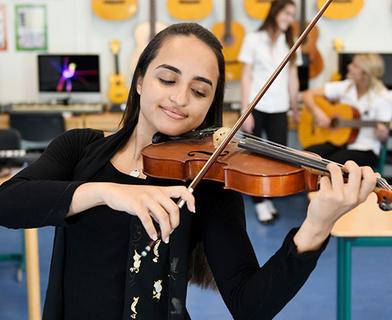
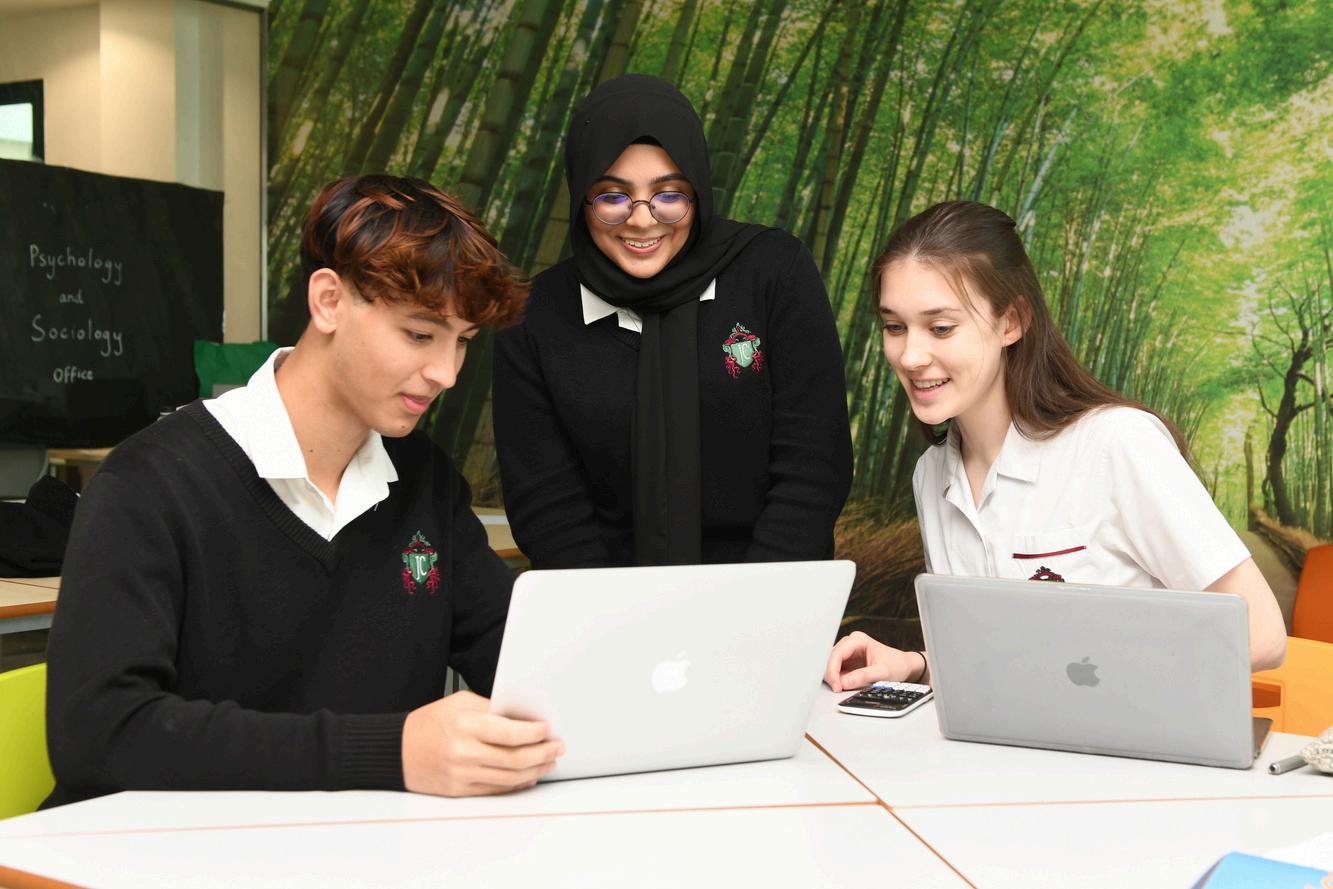

Head of Department: Mrs L Johnson
Available Levels: A Level 7182, AS Level
Exam Board: AQA
Entry Requirements: 6 in Psychology 6 in English Language and Science
What are the aims of the course?
Why do we feel, think and behave the way we do? Psychology looks at such questions by studying the human mind and behaviour It is a science with cutting-edge research that has real world applications to issues in everyday life, studying topics that include memory, psychopathology, biopsychology, relationships, schizophrenia and aggression
What is involved?
How to view the world around you from different perspectives
How to plan and conduct scientific investigations
How to analyse and interpret data
How to use critical reasoning skills
How to put across your point of view
This new specification has a rigorous mathematical and scientific element that is featured in all aspects of the course, reflecting the pivotal role of science and investigation in psychology
How is it assessed?
Paper1: Introductory Topics in Psychology
Social influence, Memory, Attachment, Psychopathology
2 hour examination in June of the second year
Paper 2: Psychology in Context
Approaches in psychology, Biopsychology, Research methods
2 hour examination in June of the second year
Paper 3: Issues and Options in Psychology
Issues and debates in psychology, Relationships, Schizophrenia, Aggression
2 hour examination in June of the second year
Each examination is weighted as 33 3% of total A level marks

Specific entry requirements:
It is expected that students following this competitive course will have a minimum of a grade 6 in GCSE Psychology If Psychology not taken, a grade 6 in GCSE Science (double award) and grade 6 in GCSE English Language Students must have a genuine interest in Psychology and a real self- discipline in their work
Why is it a useful qualification?
By studying this course you will gain an extensive academic qualification that is appropriate to a number of degrees, be it a BSc Psychology or related fields: social work, medicine, training or education P s y c h o l o g y

Head of Department: Mrs L Johnson
Available Levels: A Level 7192, AS Level
Exam Board: AQA
Entry Requirements: 6 in English Language
What are the aims of the course?
Sociology examines changes in society and differences between social groups. For example, why are there gender differences in educational achievement? And why do some ethnic groups achieve higher grades than others? You will also study families and households and how these have changed over time For example, exploring why divorce rates are six times higher today than 50 years ago
What is involved?
You will develop knowledge and a critical understanding of modern society, including injustice and social changes
You will enjoy using sociological perspectives and terminology in classroom debate
You will understand and evaluate sociological methodology and a range of research methods through active involvement in the research process
You will readily relate what you learn to your own life, roles and responsibilities
You will develop a lifelong interest in social issues
How is it assessed?
Paper1: Education with Theory and Methods
Education, Methods in Context, Theory and Methods
2 hour examination in June of the second year
Paper 2: Topics in Sociology
Families and Households, Beliefs in Society
2 hour examination in June of the second year
Paper 3: Crime and Deviance with Theory and Methods
Crime and deviance, Theory and Methods
2 hour examination in June of the second year
Each examination is weighted as 33 3% of total A level marks

Specific entry requirements:
It is expected that students will have a minimum of a grade 6 in GCSE English Language, a genuine interest in Sociology and self-discipline in their work ethic
Why is it a useful qualification?
Sociology is regarded as a skills subject It provides an excellent foundation for a huge variety of degrees and careers Past students have gone on to study law, psychology, anthropology, politics, economics and medicine. Having completed an A-level in Sociology, you will be seen as highly skilled in carrying out research, debating and written analysis


Head of Department: Ms F Temple-Smith
Available Levels: A Level, AS Level
Exam Board: AQA
Entry Requirements: 6 in Spanish or Native Speaker
What are the aims of the course and what is involved?
The AS specification builds on the knowledge, understanding and skills gained at GCSE It constitutes an integrated study with a focus on language, culture and society It fosters a range of transferable skills, including communication, critical thinking and creativity, which are valuable to the individual and to society Students will develop their understanding of themes relating to the society and culture of the country or countries where Spanish is spoken, and their language skills The approach is a focus on how Spanish-speaking society has been shaped, socially and culturally, and how it continues to change Students study aspects of the social context together with aspects of the artistic life of Spanish-speaking countries
At A2, Students will study technological and social change, looking at the multicultural nature of Hispanic society. They will study highlights of Hispanic artistic culture, including a focus on Spanish regional identity and the cultural heritage of past civilisations. They will learn about aspects of the diverse political landscape of the Hispanic world. Students will explore the influence of the past on present-day Hispanic communities. Throughout their studies, they learn the language in the context of Hispanic countries and issues and influences which have shaped them Students will study texts and film and will have the opportunity to carry out independent research on an area of their choice
How is it assessed?
AS Assessments
AS Paper 1: Listening, Reading & Writing Examination: 1 hour 45 minutes - 40% of AS AS Paper 2: Writing Examination: 1 hour 15 minutes - 30% of AS AS Paper 3: Speaking Examination: 12-14 minutes - 30% of AS
A Level Assessments
A -Level Paper 1: Listening, Reading & Writing Examination: 2 hours 30 minutes - 40% of A –level
A- Level Paper 2: Writing Examination: 2 hours - 30% of A– level
A- Level Paper 3: Speaking Examination: 21-23 minutes - 30% of A-level S p a n i s h

Specific entry requirements:
Grade 6 in Spanish or a native speaker
We recommend that students complete the full A2 course However, The AS course is fully coteachable with the first year of the A-level course and there will be an opportunity for students to take AS Spanish as a stand-alone qualification at the end of Year 12
Why is it a useful qualification?
Spanish is a very popular course within education today Almost all universities and colleges offer degrees in Spanish ranging from pure Spanish (e g literature and language) to more businessorientated courses (e g Spanish and Business, Spanish and Marketing or Spanish with International Law) This course will provide students with the relevant knowledge to continue their studies in higher education Furthermore, students will also find Spanish an excellent complementary subject for careers in many different fields including Business Administration, Sales, Personnel, Tourism, Foreign Office and Law


Head of Department: Ms S Wardell
Available Levels: International Level 3
Subsidiary Diploma
What are the aims of the course and what is involved?
Exam Board: Pearson
Entry Requirements: Sixth Form Entry Requirements
5 in Science/Combined Science and 5 in PE preferred
BTECs enable a learner-centred approach to education, with a flexible, unit-based structure and knowledge applied to project-based assessments BTECs focus on the holistic development of the practical, interpersonal and thinking skills required to be successful in employment and higher education The Pearson BTEC International Level 3 qualification in Sport is designed for learners who wish to pursue a career in the sports sector via higher education to access graduate entry employment in a sports role
360 Guided Learning Hours Equivalent in size to one International A Level
At least five units, of which one is mandatory and at least one is assessed by Pearson Set
Assignment Mandatory content (25%)
This qualification is designed to support learners who are interested in learning about the sports industry alongside other fields of study, with a view to progressing to a wide range of higher education courses, not necessarily in sport-related subjects. The qualification is designed to be taken as part of a programme of study that includes other appropriate BTEC International Level 3 qualifications or International A Levels.
What do the qualifications cover?
This qualification has been designed to support progression to particular roles in the sporting sector, either directly into entry-level roles linked to these occupational areas or, more likely, via particular higher-education routes in the particular areas The qualification content has been designed in consultation with employers, professional bodies and higher-education providers to ensure that the content is appropriate for the progression routes identified
All learners will be required to take the following mandatory content; Unit 1 – Health, Wellbeing and Sport as well as a series of optional units to make up the 360 GLH’s These optional units have been designed to support progression to sport-related courses in higher education, and to link with relevant occupational areas and cover content areas such as, Selfemployment in Sport and Physical Activity, Influence of Technology in Sport and Physical Activity, Business in Sport, Nutrition for Physical Performance and/ or Applied Sports Anatomy and Physiology B T E C S p o r t

How is it assessed?
Assessment is designed to fit the purpose and objective of the qualification It includes a range of assessment types and styles suited to vocational qualifications in the sector All assessment is internal but some mandatory units have extra controls on assessment and are assessed using Pearson Set Assignments
Some mandatory units in the qualifications are assessed using a set assignment Each assessment is set by Pearson and may need to be taken under controlled conditions before it is marked by teachers Set assignment units are subject to external standards verification processes common to all BTEC units By setting an assignment for some units, we can ensure that all learners take the same assessment for a specific unit Learners are permitted to resit set assignment units during their programme
All units in the qualification are internally assessed and subject to external standards verification Achievement of the qualification requires demonstration of depth of study in each unit, assured acquisition of a range of practical skills required for employment or for progression to higher education, and successful development of transferable skills Learners who achieve a qualification will have achieved across mandatory units Units are assessed using a grading scale of Distinction (D), Merit (M), Pass (P) and Unclassified (U)
What could this qualification lead to?
These qualifications support progression to job opportunities in the sports industries at a variety of levels Examples of job roles available in sports areas include and physical education instructor and/ or an assistant coach
After achieving these qualifications, while learners can progress directly to entry-level assistant coaching roles, it is likely that many will do so via higher study. These qualifications are recognised by higher-education providers as contributing to meeting admission requirements to many relevant courses in a variety of areas of the sport sector, for example BA (Hons) in Sport and Physical Education or BSc in Sports, Physical Education and Teaching Science
How does the qualification provide transferable knowledge and skills for higher education?
All BTEC International Level 3 qualifications provide transferable knowledge and skills that prepare learners for progression to university The transferable skills that universities value include: the ability to learn independently, the ability to research actively and methodically and the ability to give presentations and be active group members
BTEC learners can also benefit from opportunities for deep learning, where they are able to make connections across units and select areas of interest for detailed study B T E C S p o r t
How does this qualifications provide transferable employability skills?
In the BTEC International Level 3 units, there are opportunities during the teaching and learning phase to give learners practice in developing employability skills Where we refer to employability skills in this specification, we are generally referring to skills in the following three main categories:
Cognitive and problem-solving skills – using critical thinking, approaching non-routine problems, applying expert and creative solutions, using systems and technology
Interpersonal skills – communicating, working collaboratively, negotiating and influencing, self-presentation
Intrapersonal skills – self-management, adaptability and resilience, self-monitoring and development
There are also specific requirements in some units for assessment of these skills where relevant, for example where learners are required to undertake real or simulated activities
Specific Entry Requirements:
Minimum Grade 5 in Science or Combined Science and minimum Grade 5 in GCSE Physical Education are preferred
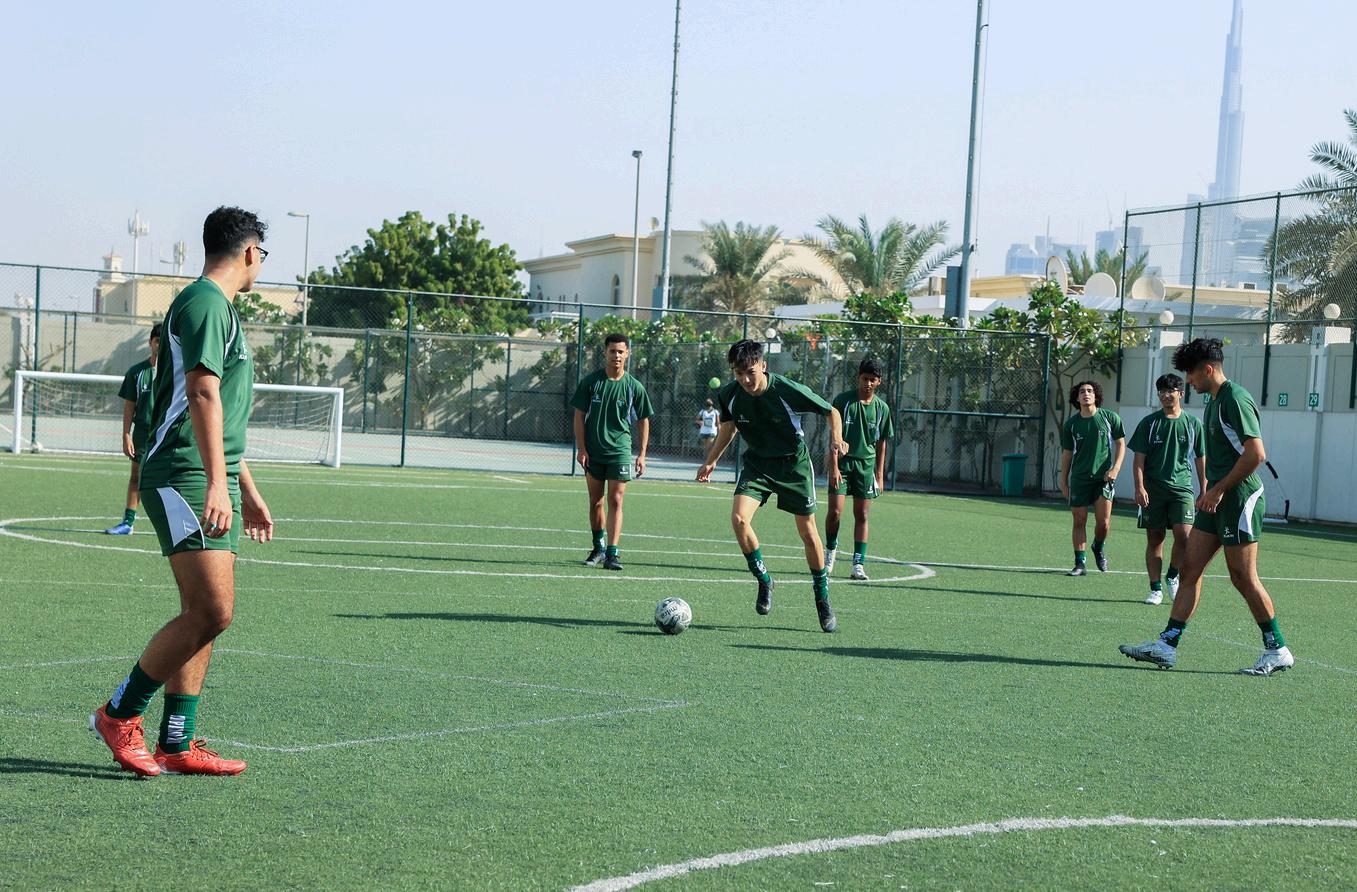
EPQ Coordinator: Ms A Balfe
Available Levels: Level 3 Extended Project
Exam Board: Edexcel
Entry Requirements: 8 in English Language
Our Sixth Form offers Year 12 students the opportunity to undertake an Extended Project Qualification (EPQ) This is a supplementary academic qualification taken alongside students’ A Level courses and carries the same UCAS points tariff as an AS Level, where students can be awarded a maximum of 28 UCAS points depending on the grade achieved
What is involved?
The EPQ is an independent study into an area of interest The course requires students to conduct their own independent research project culminating in a 5,000 word dissertation, investigation, artefact or performance Students also submit a reflective log of their project, which encourages evaluation and reflection skills, and present to a small audience at the end of the project Students are expected to spend approximately 120 hours independently working on their EPQ The majority of our students undertake Unit 1: Dissertation, which is a theoretical written project on any topic presenting an argument, e g research into a biological, historical or environmental issue
Many students pursue an EPQ because they have a genuine passion and interest in the topic they are researching. These students are more likely to persevere with the task and spend the necessary amount of time on it, thus increasing their chances of achieving a high grade It is important to note that this level of success requires a lot of commitment and selfmotivation Other students recognise that their A Level subject options do not extend to enabling them to develop the necessary written analytical skills, and therefore choose the EPQ to complement this
It is important that in order to determine if the EPQ is a suitable choice for you, that you personally reflect on your own university requirements, the breadth of your A Level subjects, your self-management skills, your ability to meet the deadlines within the given time frame alongside your A Level workload and your other extra-curricular activities, and of course your interest and curiosity in the research topic. You may also wish to reach out to your teachers to ask for their advice
The EPQ increases resilience, independence and confidence in our students, and although guidance is provided throughout, it is the responsibility of the student to commit to the project and to meet deadlines It does however require a significant time commitment, and self-management throughout the course alongside the demands of A Level studies Students must be willing to accept these expectations as they would an A Level course when they begin, as failure to meet these conditions will result in students being unable to continue with the programme E x t e n d e d P r o j e c t Q u a l i f i c a t i o n

What are the benefits of undertaking an EPQ?
Universities and employers look for transferable skills that demonstrate independent, motivated and resilient students and workers The EPQ is an excellent opportunity to develop skills such as project management, independent study, initiative, creativity, problem-solving, decision making, reflective learning and confident presentation skills It is also a good way of demonstrating commitment to an area of study or employment that goes beyond curriculum learning, can be used to enhance a students’ personal statement, and prepares students for university life.
While some UK universities may reduce grade requirements based on the completion of a high quality EPQ, it is important to note that this significantly varies between establishments, and not all universities place EPQ as an integral part of their decision for accepting applicants, specifically in terms of formal conditional offers or applications for specific programmes of study It is best to check your shortlisted university websites or with administration officers to confirm each institution’s approach before deciding to proceed with the EPQ This is equally true of international institutions who may not give formal recognition of the qualification
Successful students will have compulsory taught sessions each week throughout the course to develop the skills required for conducting an academic piece of research Students are expected to commit a minimum of a further 5 hours per week to their EPQ beyond this lesson They will be allocated a skills supervisor, and will choose a subject supervisor, both of whom will be available for support throughout the project, and part of this time may be used to meet with and seek support from them
We aim to have the process completed by the end of March, with students meeting a final submission around the Spring Break Interim deadlines will be given throughout the year to ensure students remain in control of their research and recordkeeping
It is important to stress that students are taught generic skills and not subject content as part of the compulsory sessions. Students conduct their own research and largely work autonomously This project is student led and directed with support from the supervisor, who acts in an advisory capacity. The role of the supervisor is to guide the student through the project; it is a different role from teaching students Therefore the EPQ is a project that will require independence and tenacity. E x t e n d e d P r o j e c t Q u a l i f i c a t i o n
How is it assessed?
Our projects are assessed through the Edexcel exam board and students must complete the project before the deadline in Year 12 The specification can be found here The EPQ is assessed holistically, with marks being gained from three key components Students will complete their project (the dissertation or artefact), a product activity log which tracks the progress of their project, and a formal presentation
There are four Assessment Objectives which students will be measured against and the total amount of marks available is 54 It is also important to note that the grade boundaries are significantly higher than A Level subject papers; they can be viewed online via the Edexcel website should you wish to do so
AO1 – Manage (17%) – this is where students can be credited for their project management skills and time management
AO2 – Use of resources (22%) – students can gain marks for critical use of resources such as books, journals, articles, websites as well as their primary research
AO3 – Develop and realise (44%) – students are measured on their ability to problemsolve, think creatively and bring their project to fruition regardless of obstacles
AO4 – Review (17%) – students are encouraged to evaluate their own learning and progress, identifying successes and failures, and communicating conclusions in an appropriate format
Students must achieve a Level 8 in GCSE English Language as a minimum entry requirement
If you are interested in pursuing an EPQ in Year 12 alongside your A Level studies, you must select it as part of your application Following this, further information will be shared and you will be added to the Google Classroom where you will complete summer work All students interested in completing the EPQ will be required to complete the summer work, irrespective of whether they are currently meeting the entrance requirement Therefore students will not be able to join the course at a later date E x t e n d e d P r o j e c t Q u a l i f i c a t i o n
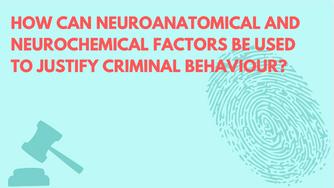

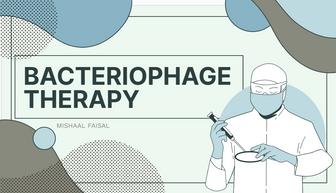






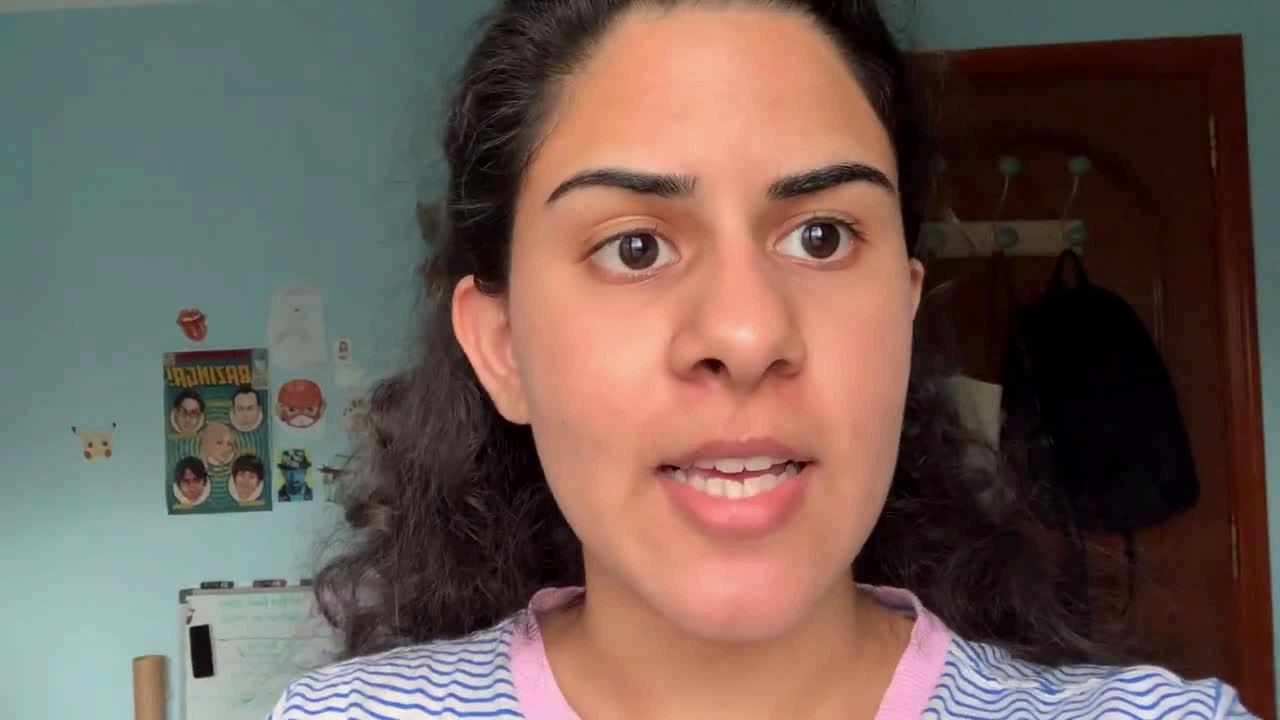



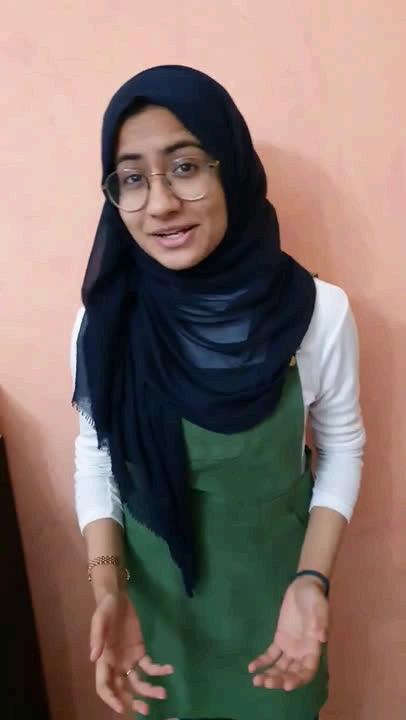






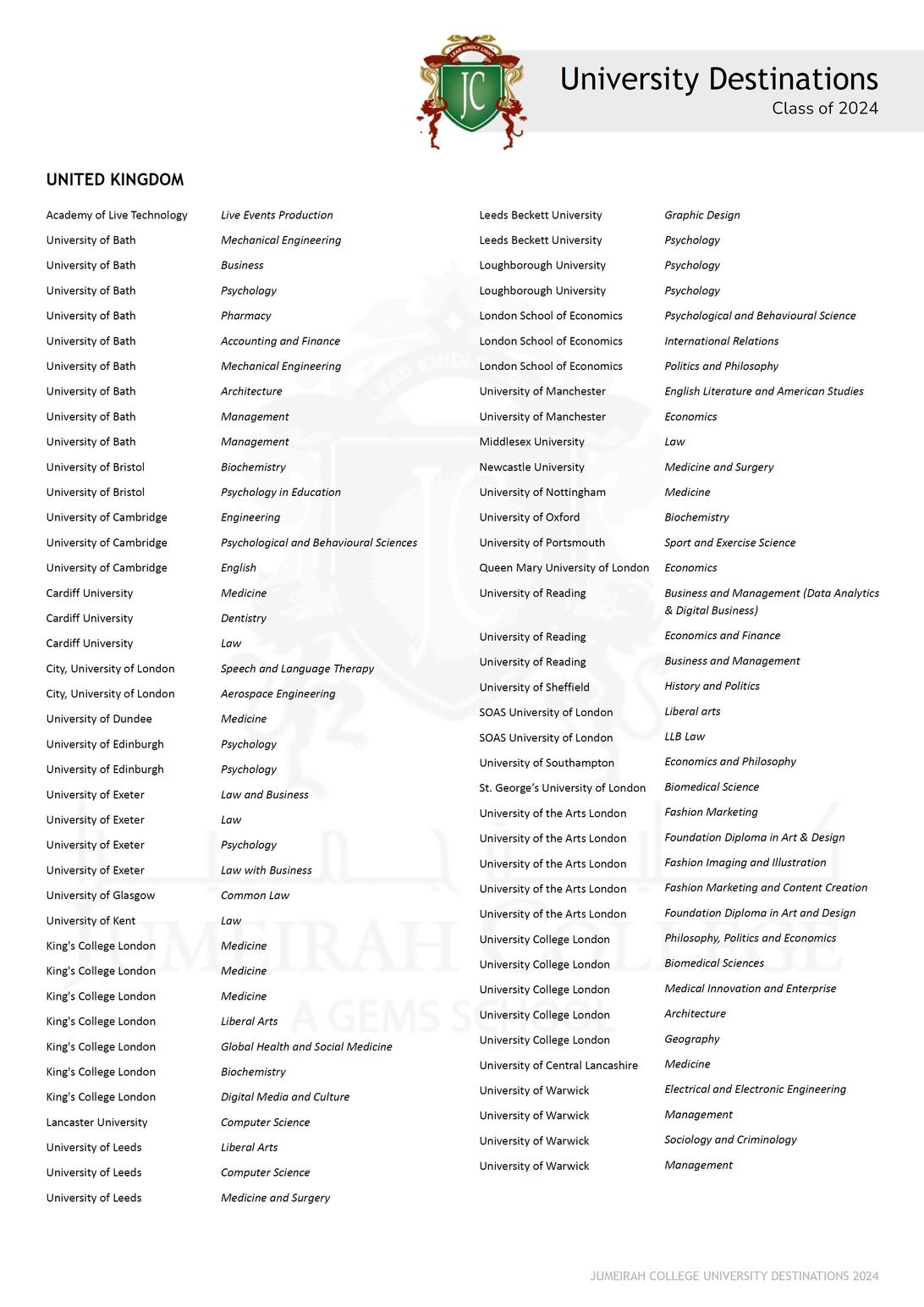
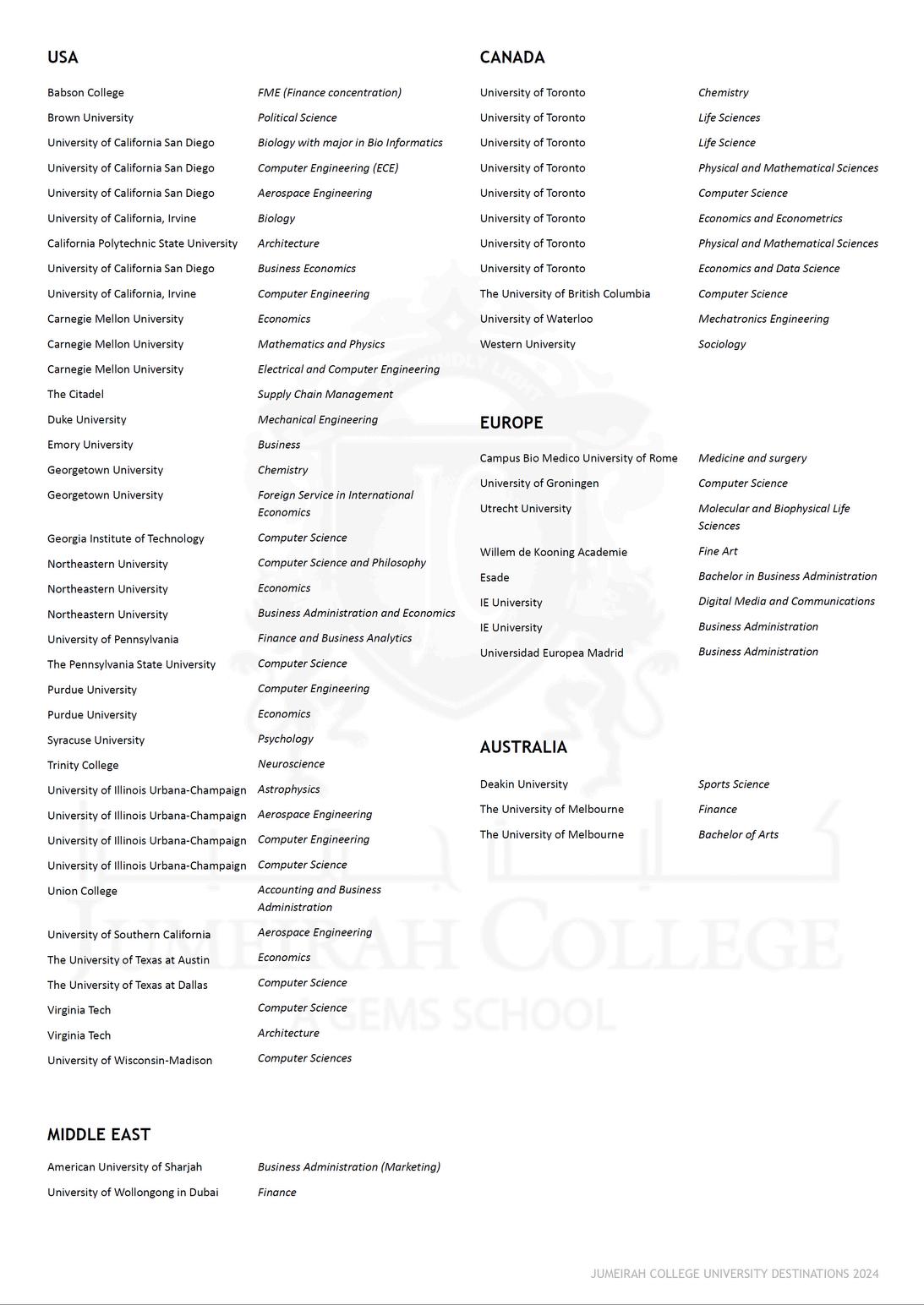
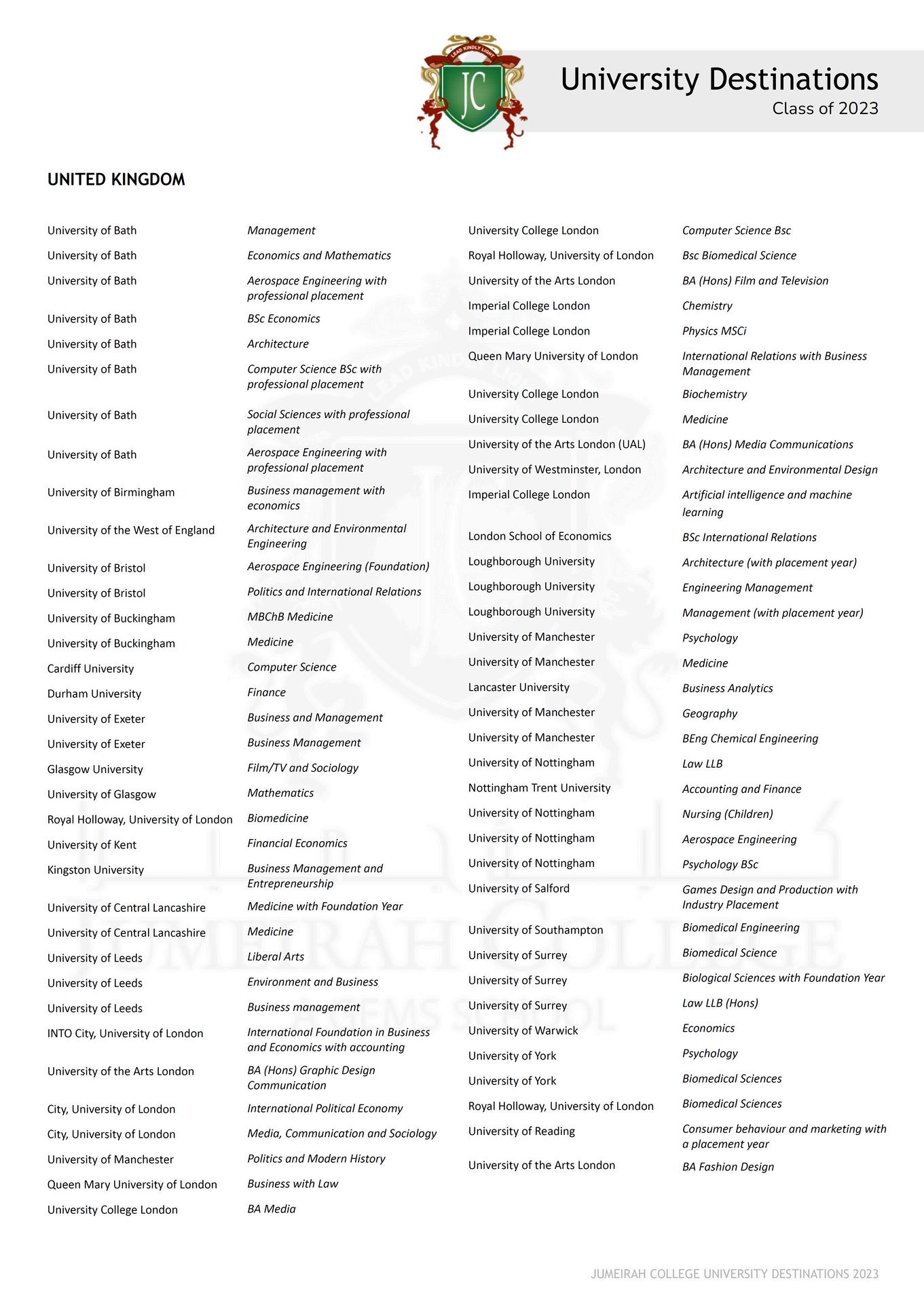
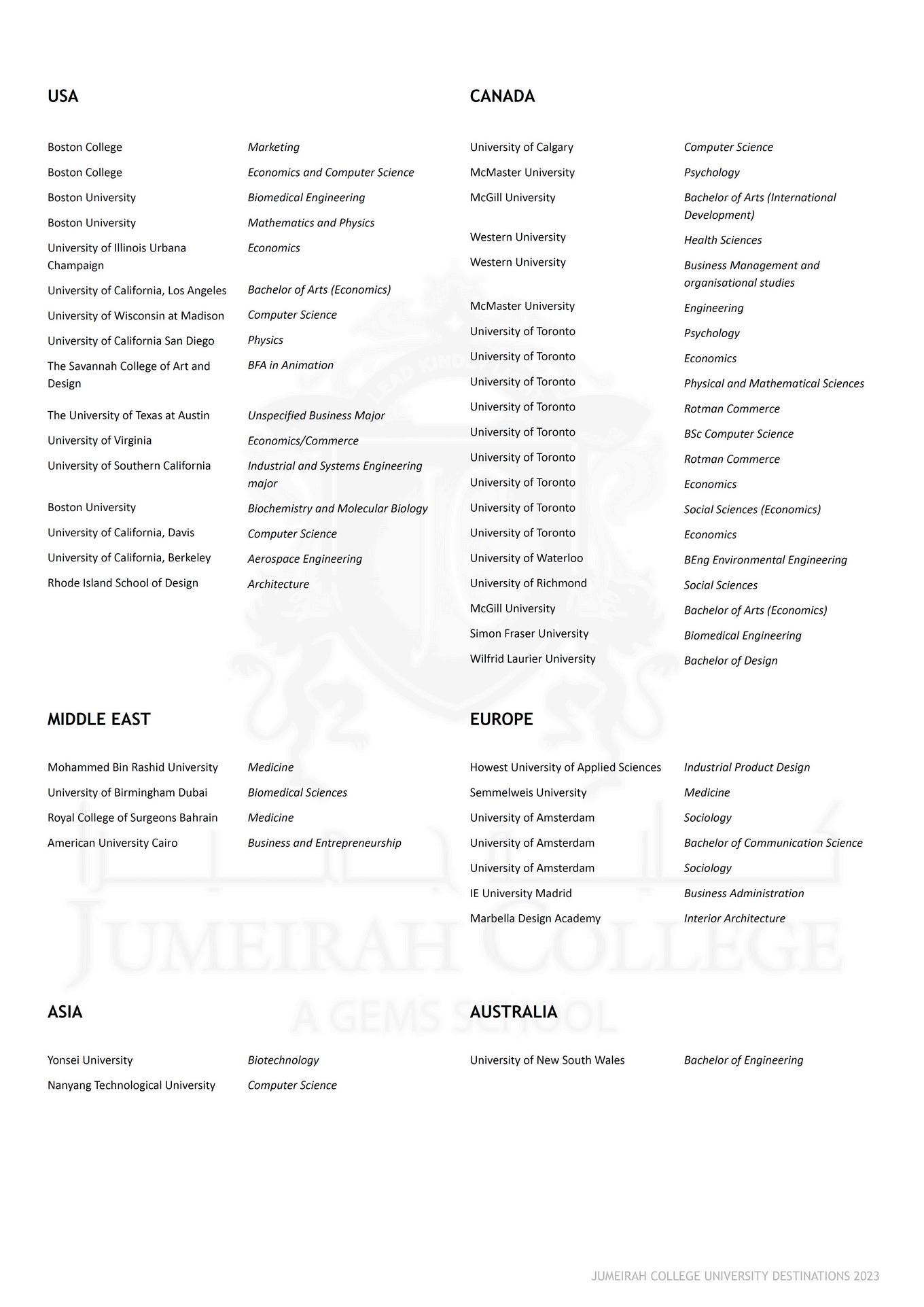
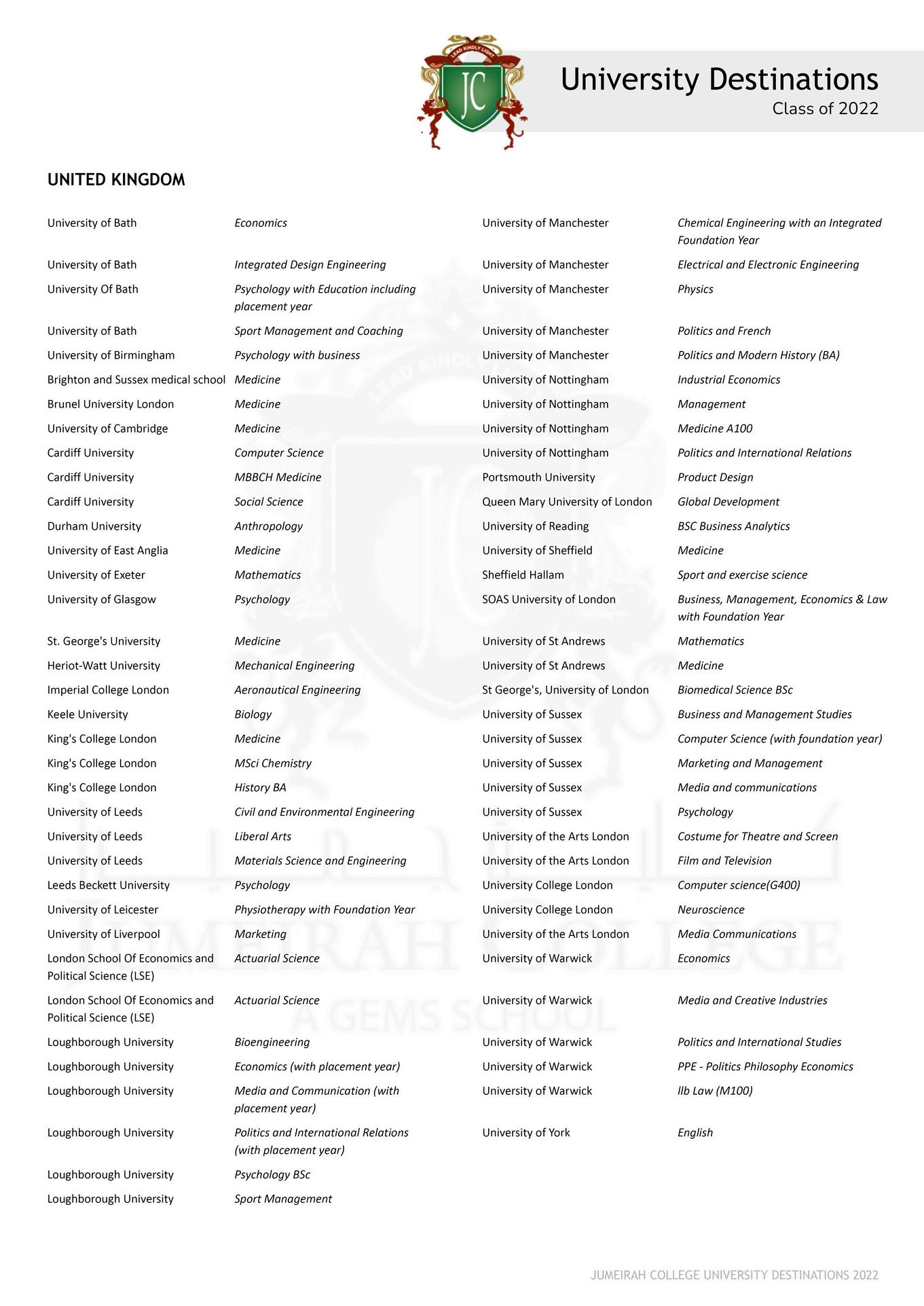
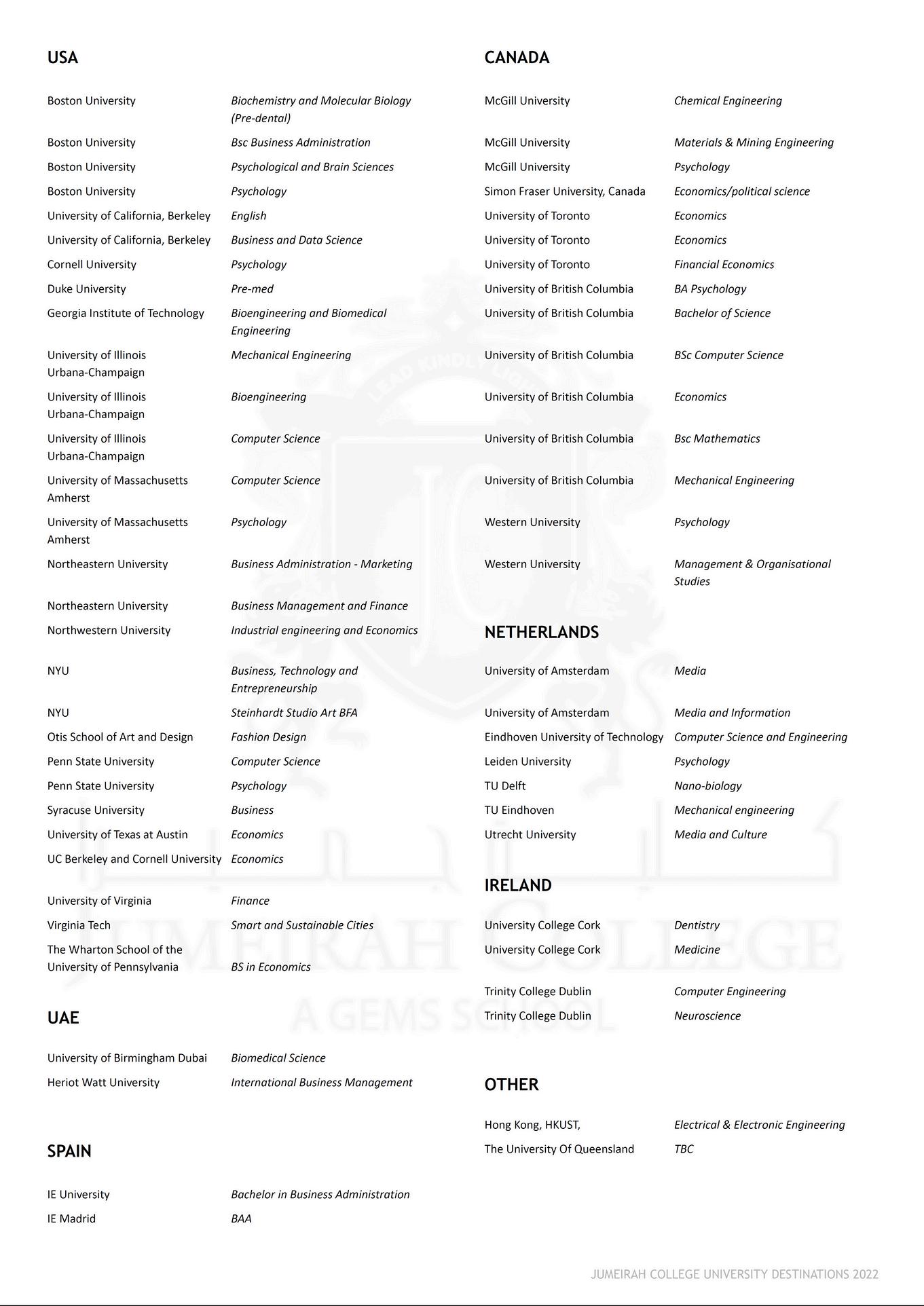
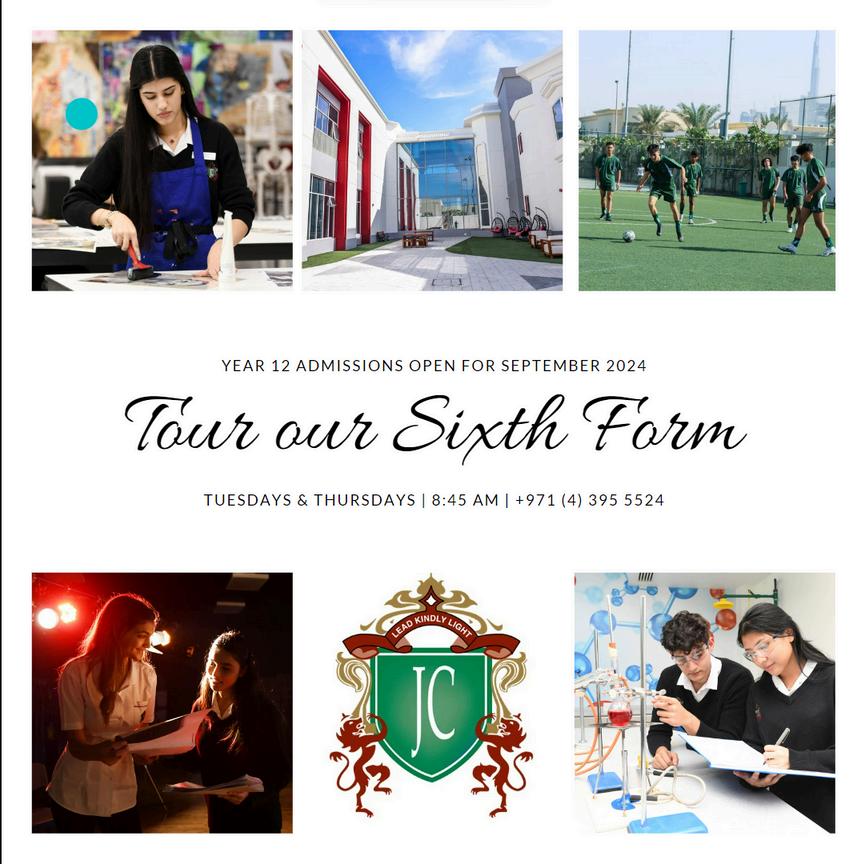



+971 4 395 5524
www gemsjc com
info jcd@gemsedu com



